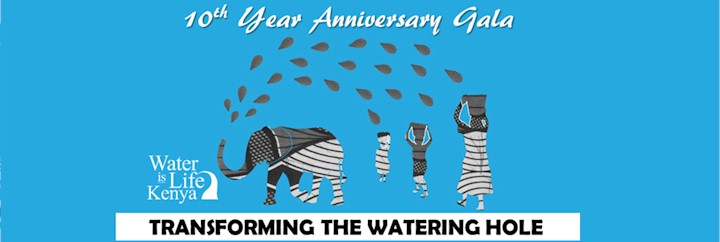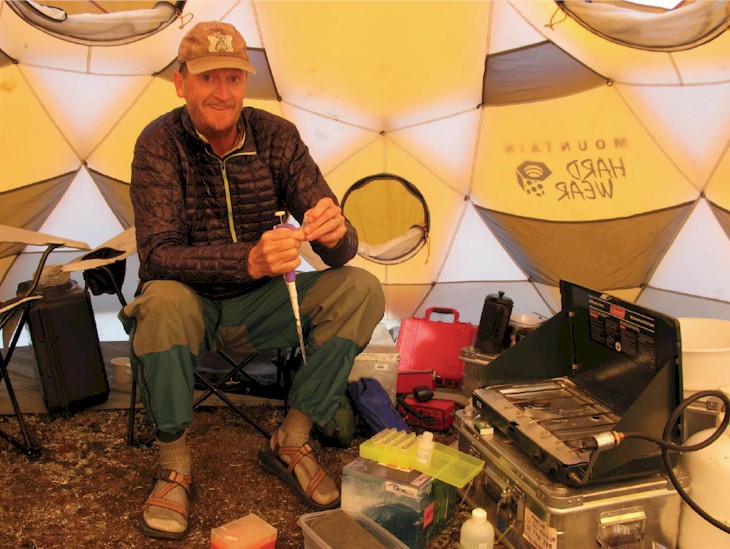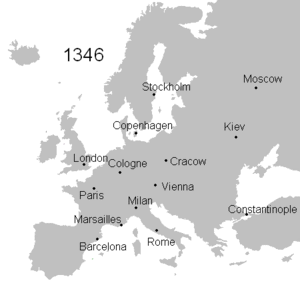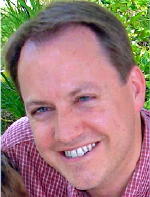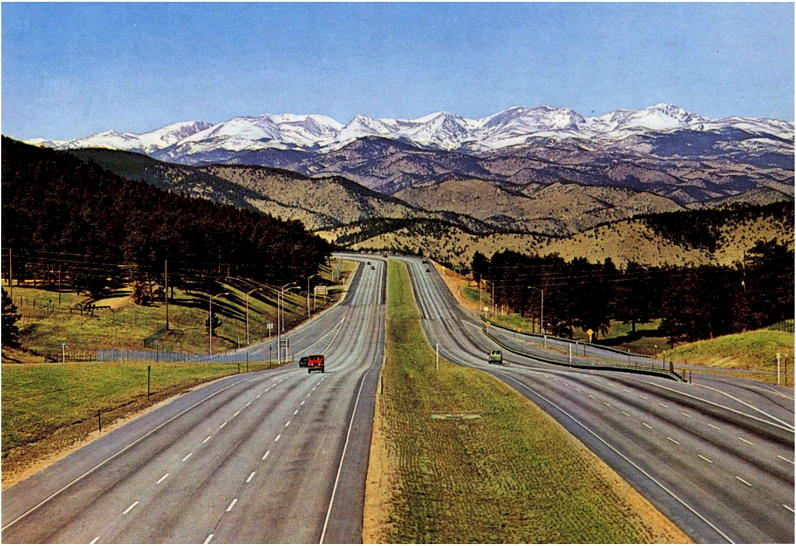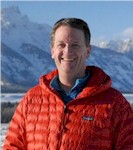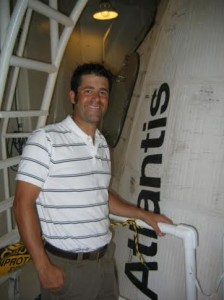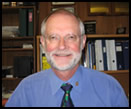Learn about past Golden Beer Talks. The talks prior to 2023 are available for download as podcasts!
May 20, 2025
Off-Site at the Astor House
The Past, Present, and Future of a Golden Landmark
Jasmine Saxon and Jessica Ericson (Archaeologists) – Marcie Miller (Golden Landmarks Association) – Maura Adamson (Foothills Art Center)
April 15, 2025
100th Golden Beer Talk!
Lightening Talks from Past Speakers
John Spear (2014) – Scott Grossman (2017) – Jeff Squier (2014) – Jenny Truax and (2024) – Jim Dale (2014) – Carla Zinanti (2023)
March 18, 2025
Tom Schweich and Ann Norton – Stewards of Golden Open Space
Golden Open Space
January 21, 2025
Russ Schumacher – Colorado State Climatologist
The past, present, and future of Colorado’s weather and climate
November 19, 2024
Terre Deegan-Young
One Woman’s Vietnam War Experience
October 15, 2024
Sydney Mauck – History Colorado
10th Mountain Division: Soldiers on Skis
September 17, 2024
Tim Regan-Porter – CEO, Colorado Press Association
Dan Grech – Founder & CEO – Bizhack Academy
Artificial Intelligence in Journalism
August 20, 2024
Dr. Tanja Rauch-Williams – Metro Water Recovery
Out of Sight, Out of Mind:
A Fascinating Journey through 50 years of Sanitary Water Treatment Sustaining the Livelihood of the Front Range and the City of Golden.
July 16, 2024
Dr. Dendy Sloan
Marv Kay and Three Golden Heroes
June 18, 2024
Lisa Clark and Jenny Truax
accompanied by Twig and Fido, their respective guide dog puppies
Raising Puppies with Guide Dogs for the Blind
May 21, 2024
Kathleen Ermitage and Alan Cogen
The Art of Collaboration in Making a Film & Colorado Connections
April 16, 2024
Frank Blaha
The Most Successful Federal Program You Have Never Heard of – The Army Horse Breeding Program
March 19, 2024
Rex Rideout – Musician and Storyteller of the American West
Songs and Stories of Beer
January 19, 2024
Dr. Jeff Bennett
Total Solar Eclipse Visible in North America in April 2024
Featured Brewery: New Terrain Brewing
November 21, 2023
Pete McCormick – Denver Water
Northwater Treatment Plant Design and Construction
Featured Brewery: New Image Brewery
October 17, 2023
Kate Hogan
Power of Pollinators: Hummingbirds, Butterflies, and Native Bees
Featured Brewery: Cannonball Creek
September 19, 2023
Dr. Dan Berlau
Sound and Color: Can Brown Noise Help with Sleep, Focus, ADHD, and Other Issues?
Featured Brewery: AC Golden
August 15, 2023
Donna Anderson
Golden’s Mining Roots and Their Legacies
Featured Brewery: Coda Brewing
June 20, 2023
Topic: Celebrating Golden Arts Week with Golden’s Celebrated Artist
Speaker: Jesse Crock
Featured Brewery: Mountain Toad
May 16, 2023
Topic: Living in Space: Creating Habitation and Infrastructure for Humans to Live and Work in Orbit, on the Moon, and Beyond
Speaker: Rowan Palmer
Featured Brewery: Holidaily Brewing
March 21, 2023
Topic: Enlightening Thoughts on Local News
Speaker: Dana Coffield, Co-Founder of The Colorado Sun
Featured Brewery: New Terrain
February 21, 2023
Topic: Golden Folks
Speaker: Povy Atchison, Photographer of Golden Folks exhibit at Golden History Museum
Featured Brewery: Over Yonder Brewing
January 17, 2023
Topic: Wildfire Large Animal Evacuations
Speaker: Carla Zinanti – Jefferson County Animal Control Manager
Introduction: Frank Blaha – Jefferson County Horsemen
Featured Brewery: Golden City Brewery
AT HOME EDITION
October, 2020
Becky Brice, USGS
Tree Rings and Snow: an inside peek at paleoenvironmental research
September, 2020
Dr. Dendy Sloan
On Bias In the Brains Of Good People
August, 2020
Carol O’Meara
Victory Gardens
July, 2020
Claire Zilber, MD
Zoom Fatigue
classic beer talks
March 10, 2020
Dr. Michael Kerwin, Director of Environmental Science and Geology Programs, University of Denver
Topic – The Day Cape Town Nearly Ran Out of Water: Implications for Drought and Water Supply in the Denver Area
February 11, 2020
Claire Zilber, MD
Topic – MAN UP! The Shame-Based Roots of Misogyny
January 14, 2019
Charlie Sturdavant, Founder, Golden City Brewery and Sherpa Brewery
Topic – Sherpa Brewery, Five Years Later
December 10, 2019
Barb Warden, Goldentoday.com
Topic – Funiculars of Golden Colorado
November 12, 2019
Bob Raynolds, PhD
Topic – Australopithecines to the Anthropocene: A Geologist’s View of Where We Came from and Where We Are Going
October 15, 2019
Don Sweetkind, Geologist
Topic – From Uravan to Rulison: Tales from Colorado’s Nuclear Past
September 3rd, 2019
Becky Brice, United States Geological Survey
Topic – Tree rings and snow drought: what trees tell us about our changing snowpack
August 13th, 2019
Woody Tasch, Founder of Slow Money
Topic – SLOW MONEY: The Front Range and Beyond
July 9th, 2019
Bill Kilpatrick – Golden Police Chief
Topic – Keeping the Peace in our Golden, Colorado Community.
June 11, 2019
Jim Clawson, PhD – Stellar Solutions, Inc., Technical Advisor, NASA
Topic – Boots on the Moon
May 14th, 2019
Dr. Mikki McComb-Kobza, Ocean First Institute
Topic – The World of Sharks
April 9th, 2019
Christina Burri, Denver Water
Topic – Healthy Forests, Healthy Watersheds
March 12th, 2019
Lisa Gardiner, UCAR Center for Science Education
Topic – Tales from an Uncertain World: What Other Assorted Disasters Can Teach Us About Climate Change
February 12th, 2019
Claire Zilber, MD
Topic – Immune Responses to Stress and Loss
January 8, 2019
Dr. Tom Casadevall, U.S Geological Survey
Title: Preserving and Promoting America’s Geoheritage
December 11, 2018
Jeff Roberts, Colorado Freedom of Information Coalition
Title: Your Right to Know
November 13, 2018
Frank Blaha, Environmental Engineer (and Beer Ambassador)
Title: The Great Influenza Pandemic of 1918
October 9, 2018
Jim Reed, Director of R&D at RockWare, Inc. and Volunteer with volunteer with NecroSearch International
Title: Applying Geological Exploration Methods Towards Locating Clandestine Graves Related to Homicide Investigations
September 11, 2018
Joseph Kerski – Environmental Systems Research Institute
Title: Good Maps, Bad Maps, Location Privacy, and Why It All Matters
August 14, 2018
Dr. Mike Bell – National Park Service Air Resources Division
Topic: Using Science to Influence Management of our National Parks
July 10, 2018
Archivist Erin McDanal of the Colorado State Archives
Topic – Responses to Drought by Colorado’s Governors.
June 12, 2018
Dr. Carla Klehm, Assistant Professor Adjunct at University of Colorado Boulder
Topic – From My Coolest Archaeological Find in Africa to Why Wakanda from Marvel’s Black Panther Movie is (Almost) a Real Place
May 12, 2018
Johanna Kovarik, U.S.Forest Service, National Cave and Karst Program Coordinator
Topic – A Life Underground: Studying and Stewarding the Magical Subterranean World of Caves
March 13, 2018
Cartographer Catherine Costello – USGS
Topic – Mapping & Tracking Wildland Fires
February 13, 2018
Speaker – Brian J. Simonds, Physicist – National Institute of Standards and Technology
Topic – Lasers for Manufacturing – Using Light for Welding
January 9, 2018
Speaker – Rex Rideout
Topic – History of the American West through Music and Lyrics
December 12, 2017
Speaker – Joyce Tannian
Warriors, Water, and Wild Beasts: Quenching Thirst Peacefully in the Shadow of Mt. Kilimanjaro
November 14, 2017
Speaker – Margaret Blaha
Topic – The Horse Protection League
October 10, 2017
Speaker – Adrian Miller
Topic -The President’s Kitchen Cabinet
September 12, 2017
Speaker – Philip Skaff of Metropolitan State University
Topic – Inflammation and Human Heath
August 8, 2017
Trevor Pellerite, the President of the Colorado Prairie Initiative
Topic – Colorado Prairie Initiative
June 13, 2017
Speaker – Daniel McNamara – Research Geophysicist with the USGS
Topic – Forecasting Natural and Human-Caused Earthquakes
May 9, 2017
Speaker – Project Manager Scot Grossman, Jefferson County Open Space
Topic – Peaks to Plains
April 11, 2017
Speaker – Carol O’Meara, Colorado State University Extension Horticulture Entomologist
Topic – Growing Hops and Tomatoes in the Rocky Mountain Region
March 14, 2017
Speaker – Jim Clarke, Associated Press Regional Director for Eight States
Topic – This Just In: How to Spot Fake News
February 14, 2017
Speaker – Dr. John Spear, Colorado School of Mines Department of Civil & Environmental Engineering
Topic – From Mars to Europa: A Comparison of 82N 82W & 23N 58E
January 10, 2017
Speaker – Dr. Keith Neeves,
Colorado School of Mines Chemical & Biological Engineering Department and University of Colorado Denver Department of Pediatrics
Topic – Injectable Microbots for Removing Blood Clots
December 13, 2016
Speaker – Fred Linton
Topic – MillerCoors Environmental Sustainability
November 15, 2016
Speaker – Rick Grubin
Topic – Avalanche Safety
October 11, 2016
Speaker – Jason Hanson
Topic – Brew Your Own: The History of Home Brewing in America
September 13, 2016
Speaker – Ken Regelson
Topic – 100% Renewables? Let’s Go!
July 12, 2016
Speaker – Dr. Robert G. Hancock, Metropolitan State University, Denver
Topic – Mosquitoes, Bed Bugs and Other Blood-Sucking Monsters
June 14, 2016
Speakers – Judy Denison and Don Parker
Topic – Save The Mesas: How a Local Citizen Group Fought for Golden’s Trademark Open Space
May 10, 2016
Speaker – Deputy State Historian Jason Hason
Topic – Beer Here! A Local History of Brewing in Colorado
April 12, 2016
Speaker – Dr. Kathryn Johnson, Colorado School of Mines
Topic – The Evolution of Wind Energy in Colorado and Beyond
March 8, 2016
Speaker – Dr. Kenneth Gage, Centers for Disease Control and Prevention (CDC)
Topic – Plague and Other Vector-Borne Diseases in Colorado
February 9, 2016
Speaker – Darren Beck
Topic – Our Precious Platte River: Endangered Species Recovery and Habitat Restoration
January 12, 2016
Speaker – Dr. Jeffrey Bennett
Topic – An Intuitive Introduction to Einstein’s Theory of Relativity and its 100th Anniversary
December 8, 2015
Speaker – Jason Slowinski, Golden City Manager
Topic – Being Jason Slowinski
November 10, 2015
Speaker – Andrew Novick
Topic – The Atomic Clock: What Time it is—And Why
October 13, 2015
Speaker – Mark Overly
Topic – A Coffee Journey to Sumatra
September 8, 2015
Speaker – Melanie Fischer – Colorado River Recovery Program
Topic – An Overview of the Upper Colorado River Endangered Fish Recovery Program
August 11, 2015
Speaker – Former Golden Mayor Jacob Smith
Topic – Mr. Smith Goes to Washington: Reflections on Two Years in “the District”
July 14, 2015
Speaker – Dr. Catherine Lozupone, University of Colorado at Denver Professor in Medicine and Microbiology
Topic – How the trillions of bacteria that inhabit your gut influence your health
June 9, 2015
Speaker – John Knight, International Organizer World Fly Fishing Champions
Topic – World Youth Fly Fishing Championships Come to Colorado
May 12, 2015
Speaker – Dr. Jeffrey Lockwood
University of Wyoming
Topic – Legend of the Lost Locust
April 14, 2015
Speakers – Charlie Sturdavant of Golden City Brewery and Lhakpa Sherpa of Golden’s Sherpa House Restaurant
Topic – Golden City Brewery Goes to Nepal
March 10, 2015
Speaker – Quint Redmond
Topic – Agriburbia: Growing Sustainable Communities by the Bushel
February 10, 2015
Speaker – Bill Philpott
Topic – Interstate 70: The History of the Highway We Love to Hate
January 13, 2015
Speaker – Jonathon Stalls
Topic – The Endless Benefits of Life at 3 MPH – Walking Across America
December 9, 2014
Speaker – Jim Clawson, Systems Engineer
Topic – Orion EFT1: The First Flight of America’s Newest Spaceship
November 11, 2014
Speaker – Dr. Mark Eberhart
Topic – Science, Energy and the National Strategic Narrative
October 14, 2014
Speaker – Dr. James White
Topic – Climate Change and You – What everyone should know
September 9, 2014
Speaker – Dr. Dendy Sloan and Dr. Cynthia Norrgran
Topic – Three Minds and Memory
August 12, 2014
Speaker – Dr. Jeff Squier, Department Head of Physics at Colorado School of Mines
Topic – Laser Pulses: Focusing Light in Time & Space
July 8, 2014
Speaker – BECKY BRICE
Topic – Tree Rings and the Future of the Colorado River
June 10, 2014
Speaker – JASON HANSON
Topic – A Ditch in Time: The City, The West, and Water
May 13, 2014
Speaker – KEITH ROUNDS
Topic – Cowboy Poetry
April 8, 2014
MIASpeaker – MIA SULLIVAN, BEE KEEPER
Topic – Keeping Bees and Making Honey
March 11, 2014
Speaker – MIKE BESTOR, CITY MANAGER OF GOLDEN
Topic – State of the City
February 11, 2014
Speaker – DR. JOHN SPEAR
Topic – Rocks, Rust, and Fish: Why Microbes Matter
January 14, 2014
DR. JIM DALE
Topic – The Three D’s of Public Health in our Community
December 10, 2013
Speaker – Adam Pender
Topic – Why Go to Space
November 12th, 2013
Speaker – Finn Knudsen
Topic – Beer and Health
October 8, 2013
Speaker – Adrian Miller
Topic – Soul Food
May 20, 2025
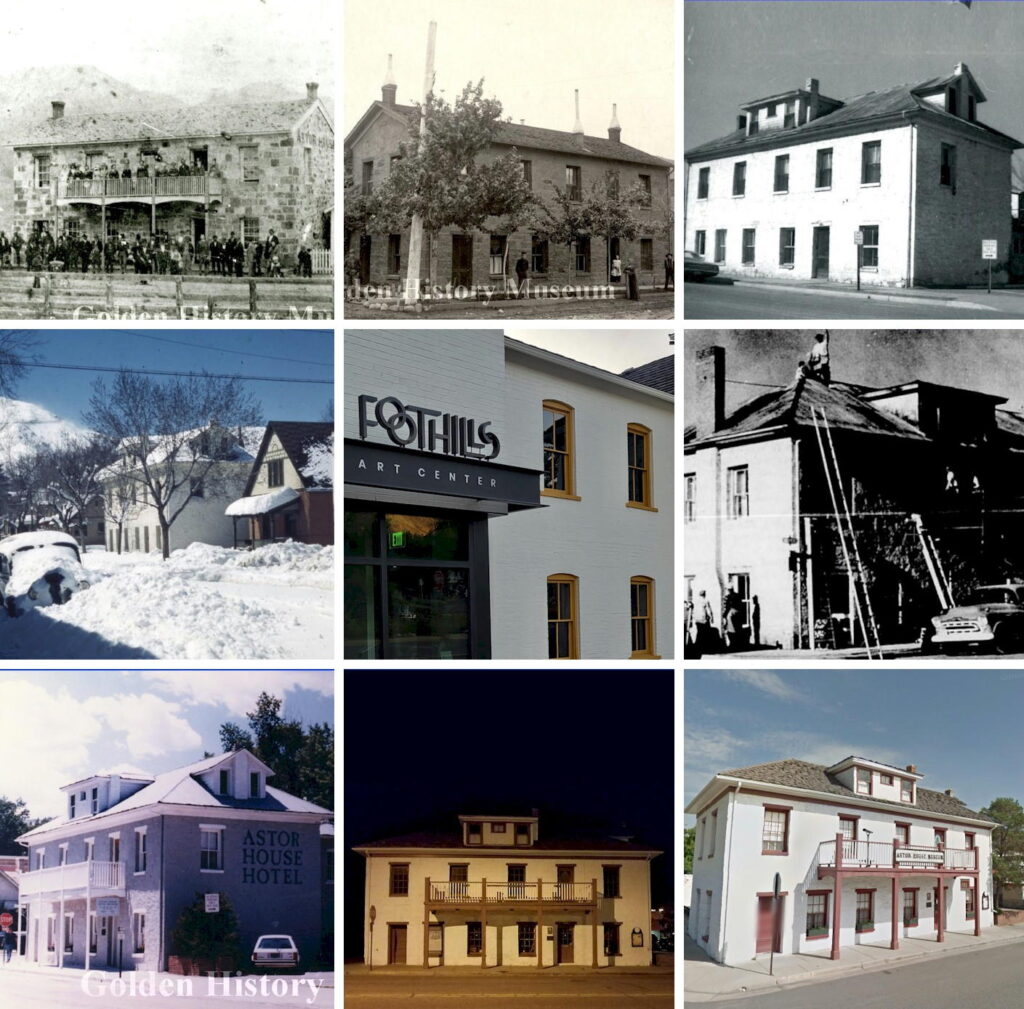
Offsite at the Astor House/Foothills Art Center: The Past, Present, and Future of a Golden Landmark
…a fine stone hotel, fifty feet front, on Second street, has already reached the second story windows, and the work is being pushed with commendable and characteristic energy by the proprietor, Judge Lake. He expects to have it ready for occupancy by the middle of July.
Colorado Transcript – June 12, 1867
THE ASTOR HOUSE has been part of downtown Golden since 1867. It has served as an elegant hotel, a popular boarding house, a museum, and now an Arts Center. The building has had ups and downs along the way, including more than one fire. In 1972, it was nearly demolished to make room for a parking lot. In 2019 the City was looking to sell it to a private party.
Finally, after an extensive remodeling and a big addition, the Astor House has been reborn as the newest part of Foothills Art Center. Join us on May 20th as Golden Beer Talks visits the Astor House and learns about its long and sometimes tumultuous past as well as its exhilarating present and future.
NOTE: We will not be at the Buffalo Rose this month–we will be one block away, at the Astor House!
Foothills Art Center @ The Astor House
1133 Arapahoe Street (map)
Featured Speakers:
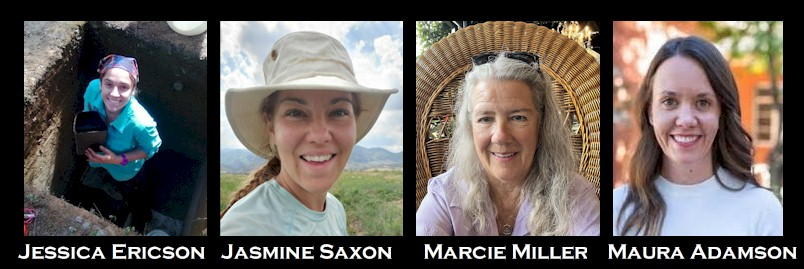
Jasmine Saxon and Jessica Ericson – Jasmine and Jessica worked in the 2021 archaeological dig in the Astor House yard. They will tell us about the history of the building and what they unearthed during the dig.
Marcie Miller – Marcie, a Golden native, practically grew up in the Astor House. Her mother was one of the founding members of Golden Landmarks Association in the early 1970s, and Marcie was involved in their preservation activities from a young age.
Maura Adamson – Maura is the Executive Director of Foothills Art Center. She will tell us about the titanic effort it took to envision, fund, and remodel this latest rendition of the Astor House. She will describe their current activities and future plans.
Featured Brewery: Golden City Brewery
On the Menu: Atomic Cowboy/Fat Sully’s will be selling pizza by the slice!
April 15, 2025
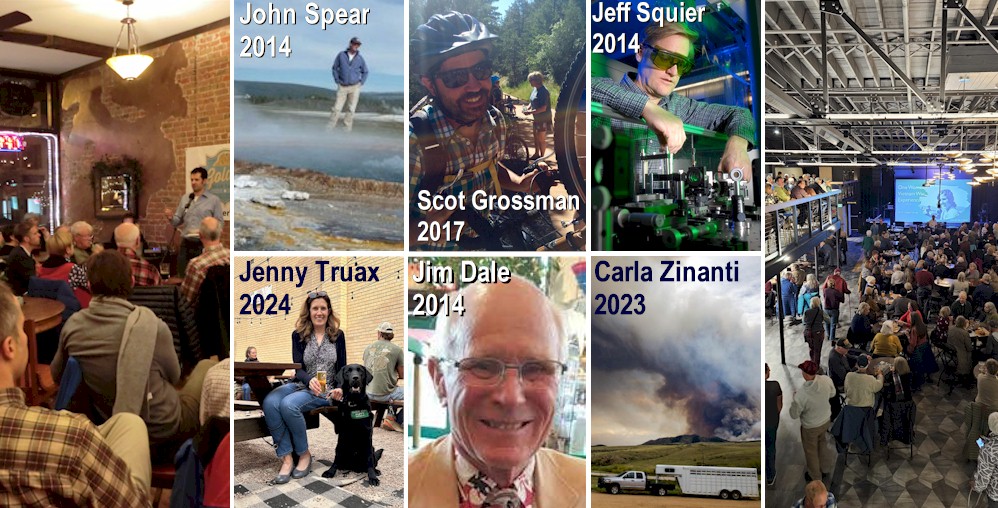
100th Golden Beer Talk!
The Beer Talks team recently did a count and realized that April will be our 100th Beer Talk! To celebrate the occasion, we’re departing a bit from our usual format. Instead of one speaker and one topic, we’ve invited several of our past speakers to give us rapid-fire updates on their projects.
Featured Speakers:
- John Spear – Rocks, Rust, and Fish: Why Microbes Matter (2014)
and From Mars to Europa: A Comparison of 82N 82W & 23N 58E (2017) - Scott Grossman – Peaks to Plains Trail (2017)
- Jeff Squier – Laser Pulses: Focusing Light in Time & Space (2014)
- Jenny Truax – Raising Puppies with Guide Dogs for the Blind (2024)
- Jim Dale – The Three D’s of Public Health (2014)
- Carla Zinanti – Wildfire Large Animal Evacuations (2023)
Instead of a single featured brewery, we’ve asked several of Golden’s breweries to provide a beer of their choice.
Featured Breweries:
March 18, 2025
Tom Schweich and Ann Norton, Stewards of Golden Open Space
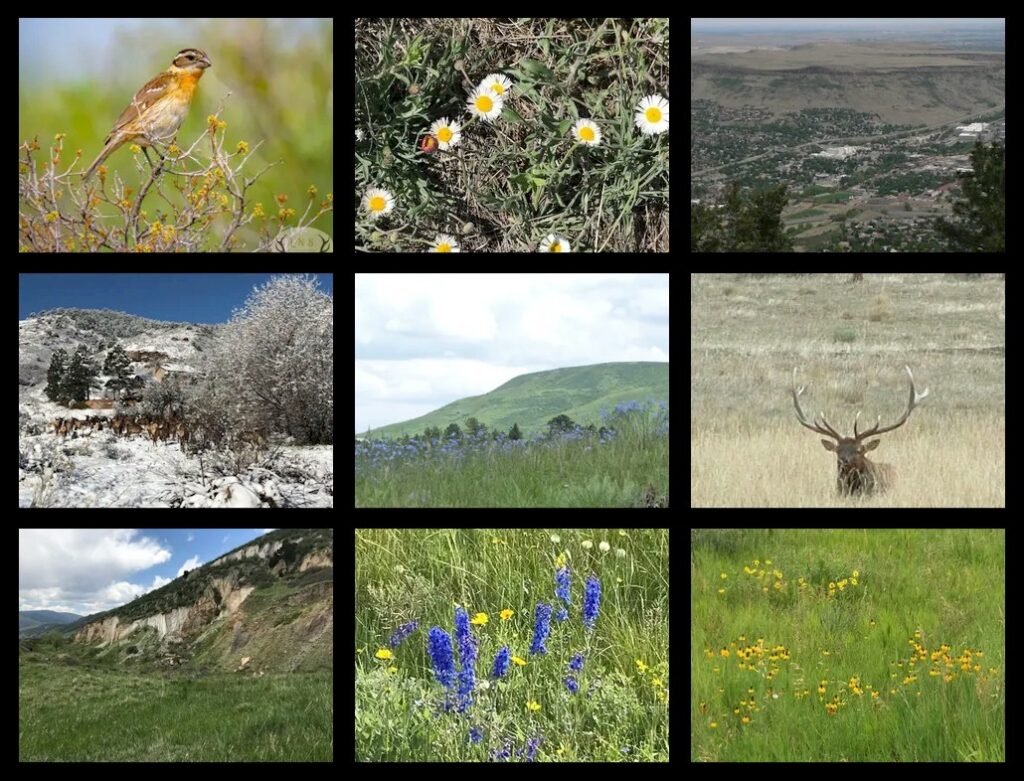
Golden Open Space
Featured Brewery: Mad Macks Brewing
Many are familiar with Jefferson County Open Space and its popular parks around Golden, like North and South Table Mountain, Mount Galbraith, and Apex Park. The city-owned open space in Golden is much smaller and often overlooked, spanning just 375 acres across 15 parcels.
Join Ann Norton and Tom Schweich from Stewards of Golden Open Space as they guide us through these lesser-known city-owned spaces, sharing their locations, unique features, and the natural beauty they preserve. They’ll also dive into the city’s current project to prepare an Open Space Master Plan, which will not only define these areas as true “Open Space” (with a capital O and S) but will also set the policies for preservation, maintenance, and restoration that will shape Golden’s natural landscape for years to come.
Speaker Bio:
Tom Schweich

Despite a career in Information Technology, Tom Schweich has 40 years of experience with plant specimen collection, plant identification, and preservation and curation of plant specimens in California and Colorado, working in the eastern Mojave Desert, the eastern Sierra Nevada at Mono Lake, California, and Golden, Colorado on the east slope of the Rocky Mountains. He is also interested in the history of Colorado botany, i.e., the early expeditions and their scientists, the plants found and the names they were given, and how recent advances in genetics have changed our view of the evolution of plants and their names. The Golden open space parcel, Schweich Hill, is named after him to honor his work there. He is an active member of Stewards of Golden Open Space, a volunteer with Golden’s Weedbusters, and with Jefferson County Open Space.
Speaker Bio:
Ann Norton
Returning to her home state in 2008, Ann has practiced law in a variety of states and federal jurisdictions, most recently with the Norton Law Firm. Her practice and expertise included business and non-profit corporations, land use, community development, real estate and related areas. She has served as a Housing Court Judge, mediator, adjunct professor of law and natural resources issues, and the President of a national public interest firm. She is a co-founder and President of Stewards of Golden Open Space, and serves on the board of Dinosaur Ridge, Golden United and Stonebridge HOA. An avid hiker, biker, canoeist, Nordic and back country skier, she is continuously amazed by the natural world which surrounds us in Golden and Colorado and strives to contribute to efforts to ensure its ongoing sustainability.
January 21, 2025
Russ Schumacher – Colorado State Climatologist
The past, present, and future of Colorado’s weather and climate
Featured Brewery: Barrels & Bottles Brewery
Colorado has a diverse and fascinating climate, owing to our location at the intersection of the mountains and plains, and our position in the midlatitudes that is regularly traversed by weather systems. Colorado is also no stranger to droughts, floods, wildfires, severe thunderstorms, and other hazards. This presentation will outline the history of weather and climate observations in Colorado, what they tell us about the climate of our state, and how a warming climate is expected to affect Coloradans.
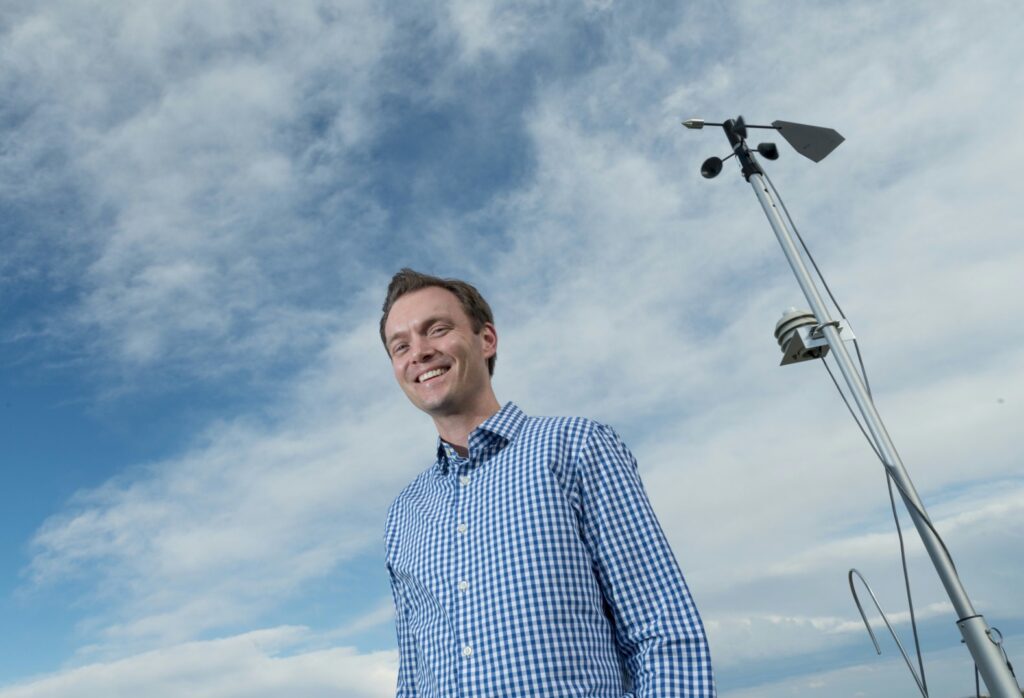
Photo Credit: John Eisele/CSU Photography
Speaker Bio:
Russ Schumacher
Russ Schumacher is a professor in the Department of Atmospheric Science at Colorado State University, and serves as the Colorado State Climatologist and Director of the Colorado Climate Center. He received his M.S. in 2003 and Ph.D. in 2008 in Atmospheric Science at CSU. His research and teaching interests include extreme precipitation, weather prediction, the climatol
November 19, 2024
Terre Deegan Young
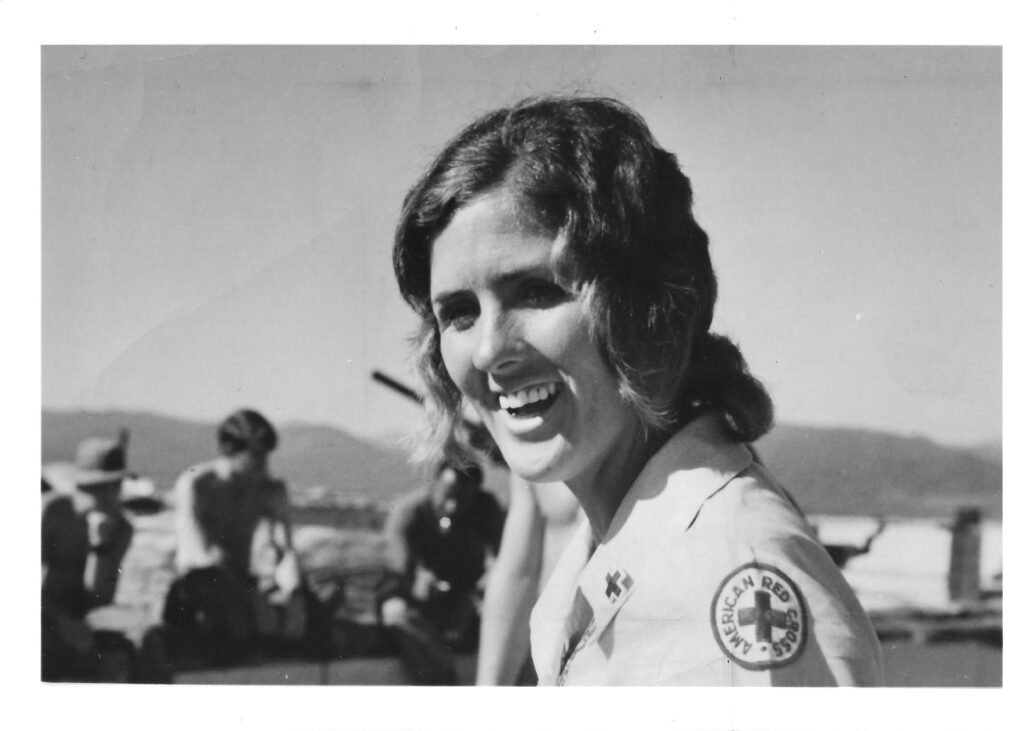
One Woman’s Vietnam War Experience
Featured Brewery: Mountain Toad Brewing
Introduction by: Former Golden Mayor Marjorie Sloan
Golden’s own Terre Deegan-Young will discuss some of her experiences during service as a Red Cross volunteer assigned to Vietnam in the 1970s.
Questioned often about why a woman would “volunteer” to go to a war zone, Terre explains how the turbulent 1960s and her family values led to a life-changing decision to join the American Red Cross as the conflict in Vietnam unfolded.
Terre will describe the military’s request at the time for American Red Cross to design a new, more mobile program for bringing a “touch of home” to soldiers fighting in combat zones. Through pictures coupled with humorous and heartbreaking stories, Terre will talk about her very personal experience during her yearlong tour of duty.
She also will address her return to the United States and the problems presented for re-entry to “normal” life. Very similar to most other returning Veterans from Vietnam, the reception received was far from welcoming.
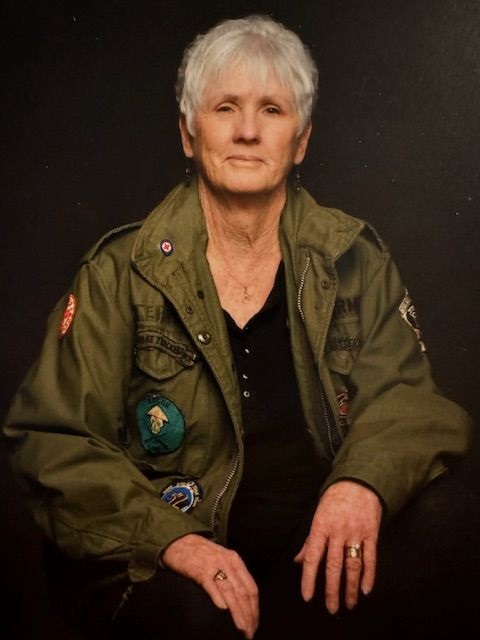
Terre Deegan-Young was raised, along with 6 siblings, in a suburb of Chicago in the 1950s. After college graduation and joining American Red Cross, she was trained to be a mobile recreation specialist. Nicknamed “Donut Dollies,” a holdover from World War II, they created and conducted diversion programs for American soldiers in the field.
They flew daily on helicopters to remote firebase locations where they were able to visit with hundreds of men that didn’t have access to “the rear.” She returned to Vietnam for 6 months in 1974-1975 before the fall of Saigon to work with a Denver adoption agency.
Terre began speaking of her war experience at the request of Regis College’s Center for the Study of War Experience. She has served for a decade on various Regis discussion panels available to students as well as the public where fellow Veterans share their personal experiences. Terre also has spoken to Veterans organizations and a variety of local groups.
Speaker Bio:
Terre Deegan Young
Terre has a BS in Social Work from St. Louis University. She received her Masters Degree in Counseling from University of Colorado Denver. Upon graduation, she began a 21-year career with the Colorado School of Mines as a
October 15, 2024
Sydney Mauck – History Colorado
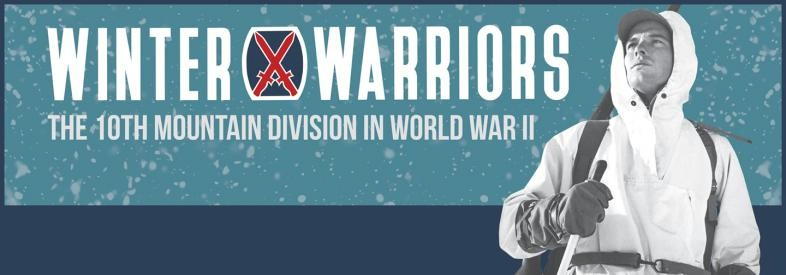
10th Mountain Division: Soldiers on Skis
Featured Brewery: Bruz Beers
Introduction by: Denise Taylor – 10th Mountain Division descendant
Sydney Mauck of History Colorado will share the history of the famed “soldiers on skis,” the 10th Mountain Division.
She will explore the unit’s origins on the advent of World War II, their training at Camp Hale located here in the Rocky Mountains, and their crucial role in the fight against fascism.
This Talk will offer insights into the Division’s time here in Colorado, what it is like working with the 10th Mountain Division collection, and how History Colorado developed its current Winter Warriors exhibition.
Speaker Bio:
Sydney Mauck
Anschutz Military Collections Specialist at History Colorado
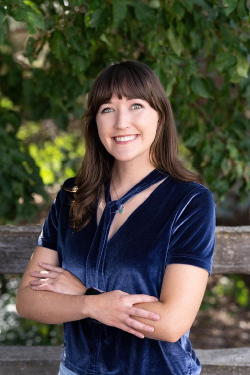
A Colorado local, Sydney Mauck grew up learning about Colorado history, including the famed 10th Mountain Division, from her father and grandfather.
She attended the University of Denver, where she earned a bachelor’s degree in Anthropology and two minors in History and Psychology. Her concentration area is in museum studies and it’s Sydney’s passion to work with museum collections to tell human stories through exhibitions and public programming.
Sydney’s professional background is in museum collection management. She interned for the Denver Art Museum, the Denver Zoo, and with the National Park Service at the Kalaupapa National Historical Park. Her work with these various institutions helped her gain experience in managing artifact collections and using those collections to share knowledge and stories with the public through exhibitions and programming.
Sydney was an intern and contractor at History Colorado from 2020 to 2021 before joining the museum in 2022 as the Anschutz Military Collections Specialist.
It is Sydney’s mission to preserve the museum’s military history collection, which consists of over 10,000 artifacts, and to make the collection accessible to the public. It’s also her responsibility to represent History Colorado’s 10th Mountain Division Resource Center.
History Colorado, partnered with the Denver Public Library, is the official repository for the historic WWII 10th Mountain Division. History Colorado preserves all 3D artifacts while the Denver Public Library preserves the archival collection.
The collections at History Colorado includes uniforms, medals and awards, gear, equipment, and vehicles used by the Division while training at Camp Hale or during combat in Italy. It is the Resource Center’s mission to share the history and legacy of the Division through the online collection, exhibitions, and public programs.
Sydney is grateful to work with the descendants of the 10th Mountain Division veterans to honor the legacy of the men who served and sacrificed their lives for our freedom in Italy 1945.
September 17, 2024

Tim Regan-Porter – CEO, Colorado Press Association
Dan Grech – Founder & CEO – Bizhack Academy
Artificial Intelligence in Journalism
Featured Brewery: 6 and 40 Brewery
Introduction by: Barb Warden – GoldenToday.com
Tim Regan-Porter and Dan Grech will explore the evolving role of Artificial Intelligence (AI) in journalism, addressing its potential to transform—for good and for ill—news. They will discuss how AI can enhance reporting, streamline workflows, and engage audiences in new ways, while also considering the ethical challenges, business model disruptions, and implications of relying on AI in journalism. This talk will offer insights into both the opportunities and pitfalls of AI in the media industry, providing practical examples of AI in journalism and exploring its potential evolution.
Speaker Bio:
Tim Regan-Porter
CEO – Colorado Press Association
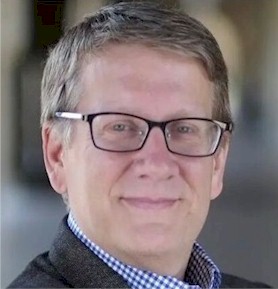
Tim Regan-Porter is CEO of the Colorado Press Association & host of the Local News Matters podcast.
Previously, Regan-Porter was South Region editor for McClatchy, leading newsrooms in Macon, Columbus (Ga.) and Biloxi where he drove experimentation and developed new digital brands. He joined McClatchy after his John S. Knight Journalism Fellowship at Stanford University where he studied systems and strategies for innovation in the Graduate School of Business, Hasso Plattner Institute of Design (d.school) and Computer Science Department.
Prior to his fellowship, Regan-Porter was founding executive director of the Center for Collaborative Journalism, which trains students by adapting the “teaching hospital” model of education. The New York Times called this initiative “one of the nation’s boldest journalism experiments,” and Pew Research Center said, “in many ways, the heart of journalism innovation is emerging from Mercer University.” In 2016, he was a Scripps Entrepreneurial Journalism Fellow at Arizona State University, and in 2014, he was one of 70 technologists from 37 countries selected to participate in Al Jazeera’s inaugural Media in Context Hackathon in Qatar.
As president and co-founder of Paste Media Group, he and his partners bootstrapped Paste magazine to become the 3rd-largest music title in the country. Recognized as a “C-Level Visionary” in the Folio 40, Regan-Porter led the magazine’s digital transition which encompassed multiple national awards including being a three-time finalist for General Excellence at the National Magazine Awards. Industry magazine Min placed Paste in the top five among all magazines in social media activation, and a Cornell University study cited Paste’s Twitter presence as one of the 100 most influential, ahead of The Washington Post, MSNBC, ABC News and Oprah.
Prior to Paste, Regan-Porter spent 10 years in web development at several firms, including IBM’s e-business National Practice where he managed the engineering teams on some of IBM’s largest projects. He majored in economics and math, with a history minor, at Olivet Nazarene University and has done graduate work in computer science, business, economics and math at Stanford University, Georgia State University, University of Illinois (Champaign-Urbana) and University of Georgia.
Speaker Bio:
Dan Grech,Founder & CEO – Bizhack Academy
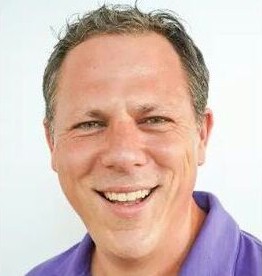
Dan Grech is the founder and CEO of BizHack Academy, whose mission is to give 10,000 underserved small businesses a simpler way to grow. Dan is a Pulitzer Prize-winning former NPR and PBS journalist turned entrepreneur and educator.
He is the grandson of a Philadelphia public school science teacher and of a professional soccer coach in La Liga in Spain, and he carries forward a family legacy of teaching, coaching and entrepreneurship.
Dan trains business owners in the Lead Building System™, a proven process for online lead generation, and the Thought Leadership Pyramid™, a systematic approach to content marketing. Past career highlights include as the head of growth at two software startups and as senior director of digital marketing the nation’s largest Hispanic-owned energy company. He helped take OfferCraft, a gamification SaaS company in the hospitality industry, from pre-revenue to a $2.5M run rate in just two years, culminating in an acquisition.
During his 15-year career as a journalist, he was a correspondent for NPR’s Marketplace and PBS’s Nightly Business Report; the News Director at Miami’s NPR station; and a reporter at The Washington Post, The Boston Globe and The Miami Herald. He co-hosted one of the nation’s first podcasts, Under the Sun. Dan is an active member of the South Florida startup ecosystem.
He started a scholarship program at BizHack for minority- and women-owned businesses that has given out more than $250,000 in training to 125+ entrepreneurs. And he’s mentored entrepreneurs at Babson College’s WIN Lab, StartUP FIU, The Idea Center at Miami Dade College, and the Innovation Hub at Broward College. Dan has taught at top universities including Princeton, Columbia and University of Miami. He’s a graduate of Princeton University; has an MFA in nonfiction storytelling and a Masters in Spanish-language journalism; and was a Fulbright scholar in Argentina. He completed the Goldman Sachs 10,000 Small Business program in 2019 (Miami Cohort 18). Dan is a dual citizen of the U.S. and Spain. He lives in Miami with his wife Gretchen Beesing, CEO of the nonprofit Catalyst Miami, and he has two children, Iris and Henry. Fun fact about Dan: he’s performed for more than a decade in the Miami improv comedy troupe Chasing Tales.

August 20, 2024
Dr. Tanja Rauch-Williams – Metro Water Recovery
Out of Sight, Out of Mind:
A Fascinating Journey through 50 years of Sanitary Water Treatment Sustaining the Livelihood of the Front Range and the City of Golden.
Featured Brewery: Westbound and Down Brewing Company
Introduction by: Frank Blaha
Sanitary wastewater treatment is not given much thought in our daily lives. However, it is an essential pillar for sustaining the high quality of aquatic and human health in our City and State.
This presentation will take the audience through a journey of more than five decades of sanitary water treatment with examples from Colorado and our City, and highlighting today’s engineering opportunities and challenges that will make you think differently about the value of “waste”water.
Tanja will be joined in her presentation by Brian Tracy, Deputy Director Public Works for City of Golden and Mark Koch, Environmental for Molson Coors.
Speaker Bio:
Dr. Tanja Rauch-Williams, Metro Water Recovery
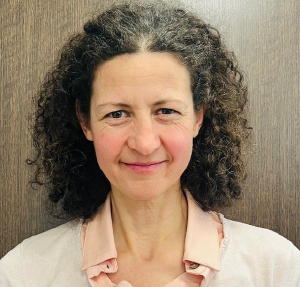
Tanja is an Environmental Engineerwho received her PhD from Colorado School of Mines in 2005. As a student she sampled wastewater from treatment plants in Boulder and Golden for research projects, and this passion has never left her.
She has worked for over 20 years with municipalities across the country on water, reuse, and wastewater infrastructure projects and has conducted various national and international research projects.
Since August 2023 she has served as the Chief Innovation Officer for Metro Water Recovery, the wholesale wastewater provider in Denver. She has lived with her family in Golden since 2001 and served several years on the City’s Sustainability Board. When not working, you may find her in South Golden Road’s Hockey Stop Park in the evenings playing Roller Hockey.
Also featuring Brian Tracy, City of Golden Deputy Director of Public Works and Mark Koch, Molson Coors Sustainability and Environment Director.
July 16, 2024
Dr. Dendy Sloan
Marv Kay and Three Golden Heroes
Featured Brewery: AC Golden
Dr. Sloan—author of a recently published book focused on the accomplishments of Colorado School of Mines football coach and Golden Mayor Marv Kay—will highlight the last 50 years of change in Mines and the City of Golden using the vehicle of Kay, who described the university and the city as “two gloves on the same body.”
During his lifetime, Kay facilitated major Golden changes through his dedication, altruism and empathy—exemplified by three local heroes: Glenn Porzak, Nils Christiansen and Terre Deegan-Young.
Speaker Bio:
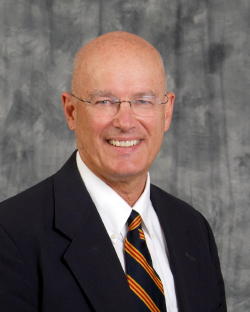
Dr. Sloan, Mines University Professor Emeritus, has earned many awards over his long and respected career. He also is a well-published author, with his ninth book entitled Marv Kay: The Coach, The School and The City released in February of this year.
Golden Beer Talks is honored to welcome Dendy back for his third appearance. Previously he has regaled our audience on the topics of Three Minds and Memory and Bias in the Brains of Good People: Where Neuroscience Meets Social Science.
Lisa Clark and Jenny Truax
accompanied by Twig and Fido, their respective guide dog puppies
Raising Puppies with Guide Dogs for the Blind
Featured Brewery: New Image Brewing
Lisa and Jenny will walk our audience through the journey of young pups until they are teamed up as working guides with their blind or visually impaired partners.
You’ll learn the differences between raising a pet dog versus a puppy in training through the lens of the largest guide dog school in North America. You’ll also learn about “campus life” for the dogs, as well as other career paths available to dogs who, for various reasons, do not become guides.
Speaker Bios:
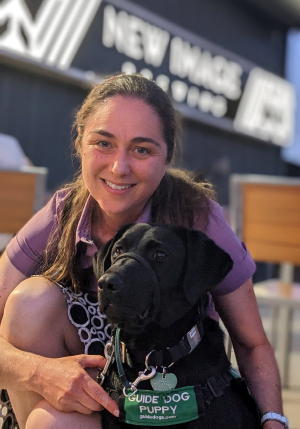
Lisa Clark was first introduced to the guide dog lifestyle by one of her residents during her stint as a Resident Adviser in college. The bond Lisa observed between the resident and her guide dog left a lasting impression. Years later, when her pet dog with large personal space requirements passed away, Lisa started puppy raising with Guide Dogs for the Blind (GDB). Lisa’s first puppy in training, Starlet, was “career challenged” and is now very happily living the pet lifestyle with Lisa replete with agility and nosework. Currently, Lisa is co-raising Twig, a loveable, zipper-nosed female black lab. She has also recently begun to lead the newly formed Golden Puppy Raisers Club for Guide Dogs for the Blind, a group that already boasts four puppies in training. Lisa considers herself “puppy rich,” which is exactly as chaotic and delightful as it sounds.
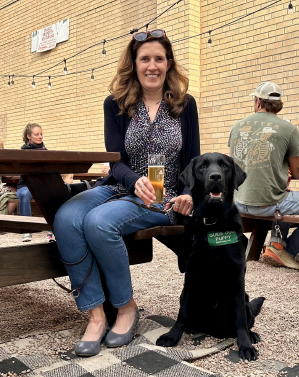
Jenny Truax is a self-proclaimed dog lover (a beer lover). In 2005, she was sitting across from a guide dog team in a restaurant and was brought to tears by witnessing the bond they shared. This made her curious about what it takes to become a guide dog, when less than a week later a coincidental series of events led her to meet a puppy raiser with Guide Dogs for the Blind. She started raising her first guide dog that same year. She raised two dogs—Italy and Hutch—that gradated as working guide dogs, then adopted a ”career challenged” guide dog named Hartley as her pet from 2008 to 2022. In 2023, as she pondered the idea of another dog in her life, Jenny randomly met Daisy Philtron, a mutual Golden resident that was raising Jetson for GDB. Daisy and Jenny started co-raising Jetson, who is now in his final testing before being paired up with his partner to become a guide dog. Jenny is currently raising Fido as her fifth guide dog puppy with Guide Dogs for the Blind.
May 21, 2024
Kathleen Ermitage and Alan Cogen
The Art of Collaboration in Making a Film & Colorado Connections
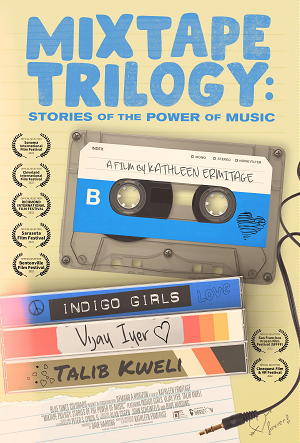
Featured Brewery: Holidaily Brewing
Introduction by: Jacob Smith
Filmmaking team Kathleen Ermitage and Alan Cogen will discuss their inspiring new documentary Mixtape Trilogy: Stories of the Power of Music.
Kathleen and Alan will describe how they took their project from idea to reality, sharing about how the art of collaboration helped them find success in a challenging media environment. They also will talk about seeking to include Colorado connections wherever possible while working with world-renowed musicians and their fans.
Speaker Bios:
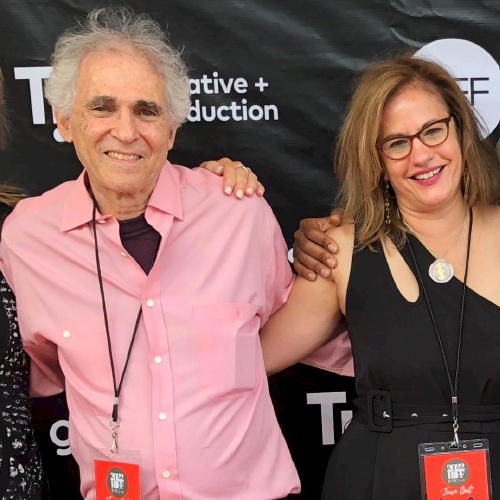
Kathleen Ermitage is a documentary filmmaker. Her directorial debut was Mixtape Trilogy: Stories of the Power of Music. She also worked as a producer on What the Hell Happened to Blood, Sweat & Tears? (nominated for a Critics Choice Award in 2023 for Best Music Documentary); Chasing Trane: The John Coltrane Documentary, and Reinventing Elvis: The Comeback for Paramount +, as well as PBS programs Serio Mendes: In the Key of Joy and Herb Alpert Is. Kathleen currently is working on a film about baseball, a short film about kid entrepreneurs and altruism and developing a project based on a Colorado subject.
Alan Cogen created the Boulder-based organization Pathways to Jazz in 2014 to support jazz musicians. The organization provides grants to assist musicians in creating professionally-produced recordings to advance their jazz careers. It has awarded grants to 93 musicians from states across the nation. Alan also is the Executive Producer of the documentary Mixtape Trilogy: Stories of the Power of Music, which explores the relationship between music artists and their fans. The film features the Grammy-winning folk rock duo Indigo Girls, Grammy-nominated musician composer Vijay Iyer, and hip-hop artist and activist Talib Kweli. This award-winning film had a successful festival run in 2022 and secured U.S. and international distribution, as well as educational distribution.
Documentaries by Kathleen and Alan have been official selections at Telluride, Toronto, IDFA Amsterdam and DOC NYC film festivals, along with being released theatrically all over the world and aired on PBS’ Independent Lens.
April 16, 2024
Frank Blaha
The Most Successful Federal Program You Have Never Heard of – The Army Horse Breeding Program
Featured Brewery: Golden City Brewery
Introduction by: Margaret Blaha, Head Trainer – Harmony Equine Center
Golden Beer Talks has not had a talk that has addressed horses in any way for several years. It’s time change that: the April Talk will cover the highly successful Army Horse Breeding Program of 1920 – 1948.
Only a small percentage of our population owns horses, but the appeal of horses is nearly universal. A recent survey found that 30.5% of Colorado households include a horse enthusiast. The popularity of horses and horse events is currently on the increase due to shows like “Yellowstone” and its progeny, but horse events go well beyond rodeo competitions.
The best current estimate is that the US has 6.65 million horses (somewhat over 200,000 horses in Colorado), and the horse industry accounts for $177 billion dollars and 7.2 million direct and indirect jobs. About 2 million people also serve as volunteers in horse programs. Given the large size of the “horse economy” a historical program that contributed to the vibrancy and diversity of that economy by giving us more serviceable horses and better equine athletes has current relevance, which brings us back to the Army Horse Breeding Program.
This program was run by the Army, but it was not limited to army bases or federal facilities; it had substantial civilian involvement across the country. Without that civilian involvement the program could not have been the success that it was. The broad outlines of this program will be explained, but more emphasis will be placed on the civilian aspects of the program, and particularly those parts that took place in Colorado or locally, down to the level of Golden and horses that you can see today. This will be a small window into a fascinating bit of history involving civic pride, common cause, many exciting horse events, and a highly successful federal program. This is largely forgotten history, but this program has had a significant impact on the horses that we see today in our pastures and at our shows.
Speaker Bio:
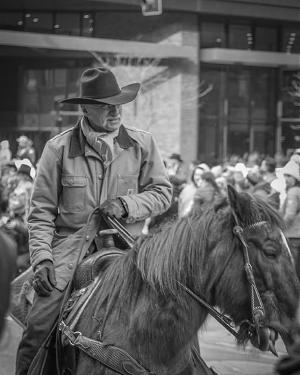
Photo by Ethan Dunlop
IG: @303firephotography
Frank got involved with horses on an ongoing basis in 2002 when his daughter–Margaret–joined Westernaires. He and Margaret got their first horse in 2005, and shortly thereafter Frank joined the Jefferson County Horse Council (JCHC). They both continued to get ever more involved with horses.
Frank is currently the president of JCHC. He is a volunteer patroller (an Equestrian Ambassador) with Jefferson County Open Space, and a Civil War cavalry reenactor. He sometimes drives Margaret’s horse-drawn carriages. Frank often participates in trail rides and obstacle courses while always promoting and supporting American mustang horses.
Frank’s penchant for history and involvement with horses caused him to pull on loose strings associated with the Army Horse Breeding Program, and you can learn where those strings lead on April 16th.
In his working life, Frank has a Master’s Degree in Civil and Environmental Engineering from the University of Wisconsin-Madison, and he works at a non-profit water research organization.
March 19, 2024
Rex Rideout
Musician and Storyteller of the American West
Songs and Stories of Beer
Featured Brewery: Call To Arms Brewing
Rex Rideout of Time Travel Music will regale the crowd with songs of beer and stories of this essential drink in the United States and Europe. With the date so close to St. Patrick’s Day, he may throw in a wee bit about the Irish as well!
Speaker Bio:
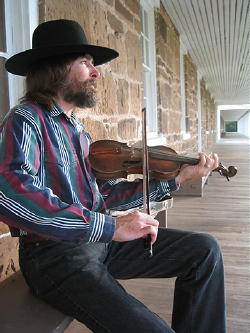
Rex Rideout sings of the American West, from the times of the early explorers, the fur trade, the Civil War and the cattle drive era to the end of the 19th Century.
Rex has performed at countless historic sites and museums across the West playing fiddle, banjo, mandolin and other instruments. His music has been featured on television and radio such as CBS Sunday Morning, museums like the Buffalo Bill Center of the West, the Western American Art collection at the Denver Art Museum and the American Museum of Western Art.
His work is also part of the soundtracks of the four National Park Service visitor center films, the PBS film Badger Clark: Poet Among the Pines and the blockbuster Dreamworks film Cowboys & Aliens.
Rex has studied trades and skills of the 19th Century for more than 30 years, with his strongest interests in woodworking and metalwork with axes and other edge tools. He has been involved in restoring and stabilizing many log buildings and other historic structures.
Rex also appeared as a Golden Beer Talks speaker in 2018!
January 16, 2024
Dr. Jeff Bennett
Total Solar Eclipse Visible in North America in April 2024

Featured Brewery: New Terrain Brewing
Many were able to witness the total solar eclipse in 2017 and/or the annular solar eclipse in 2023. Now it is time to get ready for the total solar eclipse coming on April 8, 2024—which will offer more than four minutes of totality along much of its centerline.
This Talk will offer tips for preparation and understanding of eclipse science through two resources: the free app titled Totality by Big Kid Science—now sponsored by the American Astronomical Society—and Dr. Bennett’s book Totality: An Eclipse Guide in Rhyme and Science.
https://eclipse.aas.org/totality
https://www.bigkidscience.com/books/totality/
Jeff also will briefly explain his views regarding the connections between eclipse science and climate change, a topic addressed in his newly published book A Global Warming Primer.
Speaker Bio:
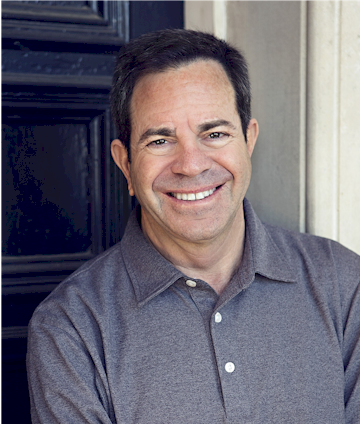
Dr. Jeff Bennett has a B.A. in Biophysics from University of California San Diego, as well as M.S. and Ph.D. degrees in Astrophysics from University of Colorado. He has devoted his career to science and mathematics education and outreach.
Jeff has taught at every level from preschool through graduate school, including more than 50 college classes in astronomy, physics, mathematics and education. He is the lead author of college textbooks in astronomy, astrobiology, mathematics and statistics that together have sold more than 3 million copies; of critically acclaimed books for educators and the public on topics including Einstein’s theory of relativity, the search for extraterrestrial life, and math and science teaching; and of seven award-winning science books for children—all of which have been selected for the Story Time Space Program, in which books are launched to the International Space Station and read aloud by astronauts.
Other career highlights include serving two years as a visiting senior scientist at NASA headquarters; proposing and co-leading development of the Colorado Scale Model Solar System on the CU Boulder campus and the Voyage Scale Model Solar System on the National Mall in Washington, D.C.; creating the free Totality app for learning about solar eclipses; and creating a free online digital textbook for middle school Earth and Space Science.
Among other awards, he is a recipient of the American Institute of Physics Science Communication Award and, most recently, the 2023 Klopsteg Memorial Award for education from the American Association for Physics Teachers.
Jeff previously appeared as a Golden Beer Talks speaker in 2016.
https://www.jeffreybennett.com/
https://www.bigkidscience.com/
November 21, 2023
Pete McCormick
Denver Water Northwater Treatment Plant Design and Construction
Featured Brewery: New Image Brewery
Introduction by: Frank Blaha, Water Research Foundation
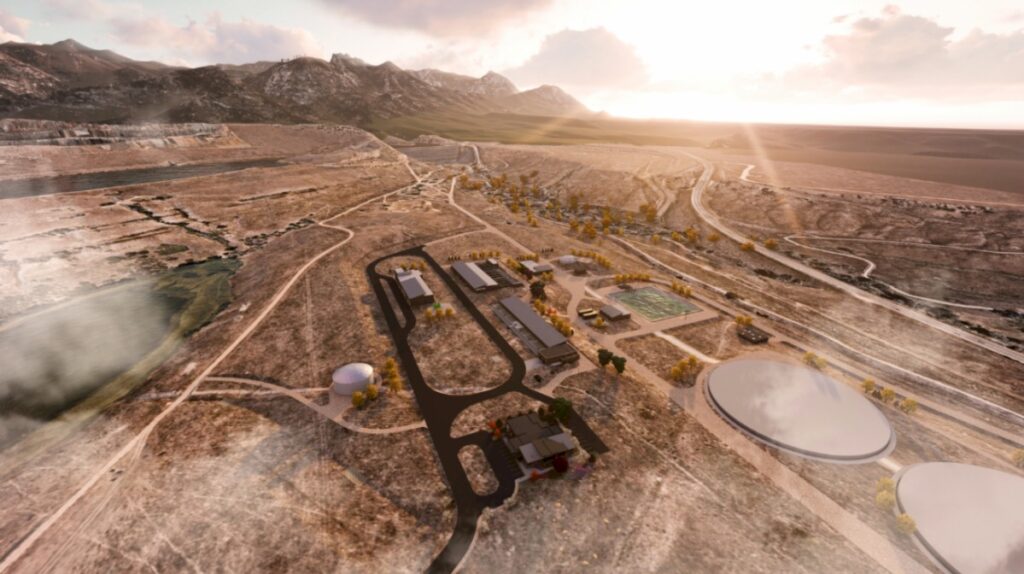
Northwater Treatment Plant (NTP) rendering
Denver Water is building a new, state-of-the-art drinking water facility on a 183-acre site next to Ralston Reservoir, north of Golden in Jefferson County. The Northwater Treatment Plant (NTP) will be capable of treating up to 75 million gallons of water a day when it is operational in 2024. The new facility provides critical updates to Denver Water’s North System that is reaching the end of its lifespan, including improvements to the Moffat Treatment Plant in Lakewood to convey flow from NTP to Denver Water’s distribution system. The upgraded system will be safer, more resilient, and adaptable to changing demands in the future.
Speaker Bio:
Peter McCormick, PE, PMP
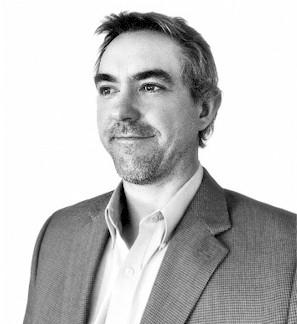
Peter McCormick is Denver Water’s Project Manager for the NTP Project. He has managed the planning, procurement, design, and construction of the new Plant, which is Denver Water’s largest capital project to date at $520M.
Prior to his work on NTP, Peter was a Treatment Engineer for Denver Water, responsible for treatment plant design and construction support spanning a variety of projects. He oversees all project development and delivery functions, including consultant and construction contracts, and manages resulting claims and liabilities. Prior to joining Denver Water 16 years ago, Peter worked for a General Contractor – providing him with a unique perspective on both design and construction.
Peter is originally from upstate New York, where he attended Syracuse University and received a Bachelor’s degree in Environmental Engineering. After moving to Colorado, he earned a Master’s Degree in Civil Engineering from CU Boulder. Peter is a licensed Professional Engineer in the State of Colorado and a certified Project Management Professional.
October 17, 2023

Kate Hogan
Power of Pollinators: Hummingbirds, Butterflies, and Native Bees
Featured Brewery: Cannonball Creek
Introduction by Laurel Starr – Golden gardening expert and pollinators advocate
Pollination is an incredible biological process that we as humans cannot live without! This specialized behavior often falls on the shoulders of some of our tiniest animals, the insects and hummingbirds. Despite having a “buggy” reputation, their power and diversity within the animal kingdom is often overlooked. Be inspired to take actions that help support the pollination powerhouses of Colorado.
Speaker Bio:
Kate Hogan, Denver Audubon
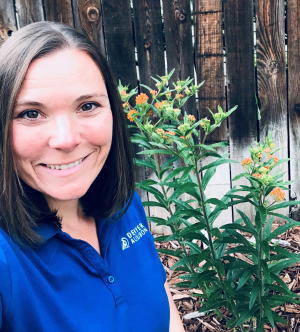
Kate Hogan has worked in the field of environmental education for over 20 years. She holds a B.S. Degree in Natural Science and Biology from the University of Puget Sound and a M.S. Degree in Nonprofit Management from Regis University. For the last eight years, Kate has worked at Denver Audubon as the Community Outreach Manager, where she creates strategic partnerships that help fulfill the organization’s mission to “inspire actions to protect birds, other wildlife, and their habitats through education, conservation, and research”. She presents outreach programs throughout the Denver metro area and manages the Audubon Center at Chatfield, providing public programs and events for visitors who desire a deeper connection to nature.
September 19, 2023
Dr. Dan Berlau
Sound and Color: Can Brown Noise Help with Sleep, Focus, ADHD, and Other Issues?
Featured Brewery: AC Golden
Introduction by Dr. Jeffrey T Lalama – Regis University
You may have heard about the benefits of brown noise recently in the news. That low, pleasant rumble has been associated with myriad health benefits, but what is the actual evidence?
This talk will focus on the studies that show that noise hues might provide benefit for people, specifically looking at sleep benefits and increased focus for people with ADHD.
Speaker Bio:
Dr. Dan Berlau, Regis University Professor of Pharmaceutical Sciences
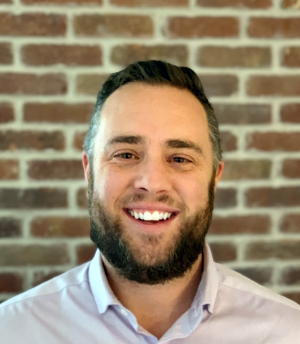
Dan is a professor of pharmaceutical sciences at Regis University in Denver. He earned a PhD in Neurobiology and Behavior from the University of California Irvine.
Regis University has an integrated team-based learning curriculum, and therefore Dan is on teaching teams for a variety of disease states, but his teaching interests are primarily psych/neuro, women’s health and transgender health. He has been awarded Regis School of Pharmacy Teacher of the Year twice and has won the Rueckert Hartman College of Health Professions Senior Teaching Award.
Dan’s research interests focus on alternative ways to improve health, including white/brown noise for ADHD, cannabis as an opioid sparing agent, and kindness. His work has been mentioned in the New York Times, Washington Post, The Guardian and others. Additionally, he has been interviewed on Colorado Public Radio and the medical news podcast, the PV Roundup.
August 15, 2023
Donna Anderson
Golden’s Mining Roots and Their Legacies

Featured Brewery: Coda Brewing
Introduction by Barb Warden
Golden has a long, rich mining history that continues today. Golden began life in 1859 as a mining camp. It became a trade center linking the gold fields to the settlements of the Great Plains, including, of course, Denver, particularly after construction of rail-lines starting in 1870. Golden grew with fits and starts due to the Civil War and the Financial Panic of 1873.
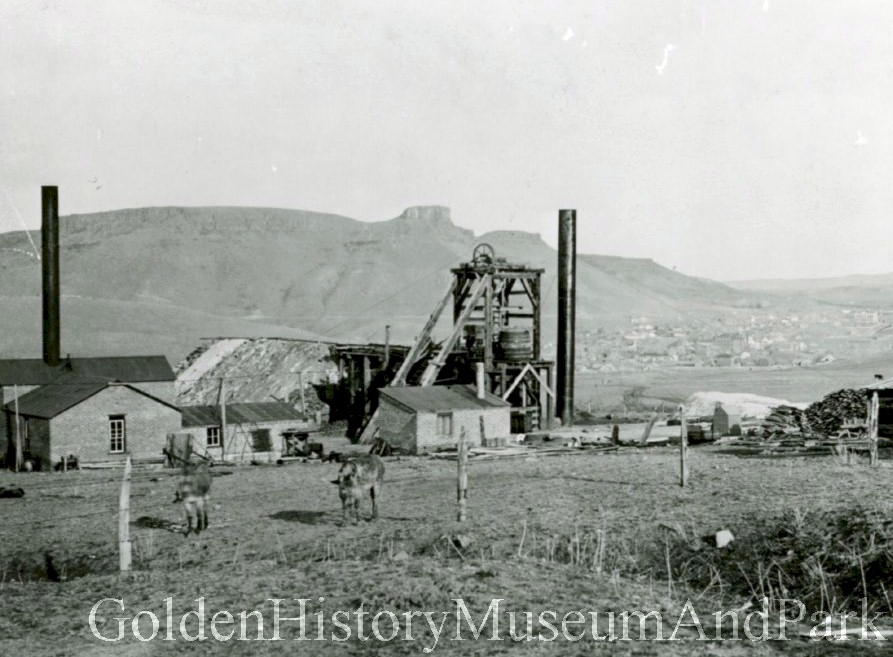
But full of natural resources, literally within the town limits, Golden became a mining center for coal, clay, stone, and limestone. With five smelters processing ore from the gold fields plus industries such as brick-making and beer-brewing, in the late 1800s Golden was a small mining and industrial town with mining-related businesses, most of which are now vanished.
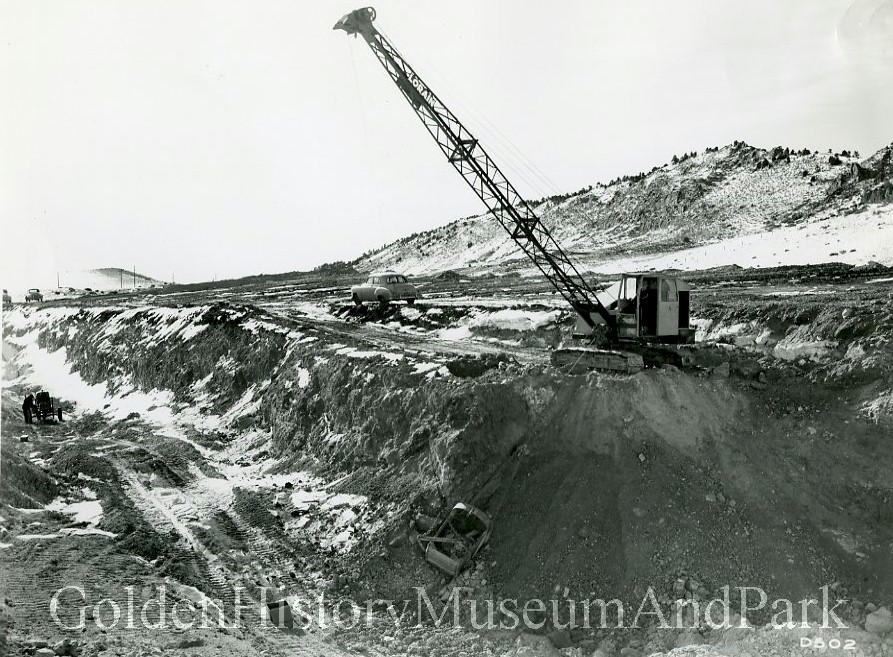
Post-1900 Golden became a major clay-mining center, fostered by Prohibition and World War I. Clay established the only Golden-based industry remaining today from its mining heritage.
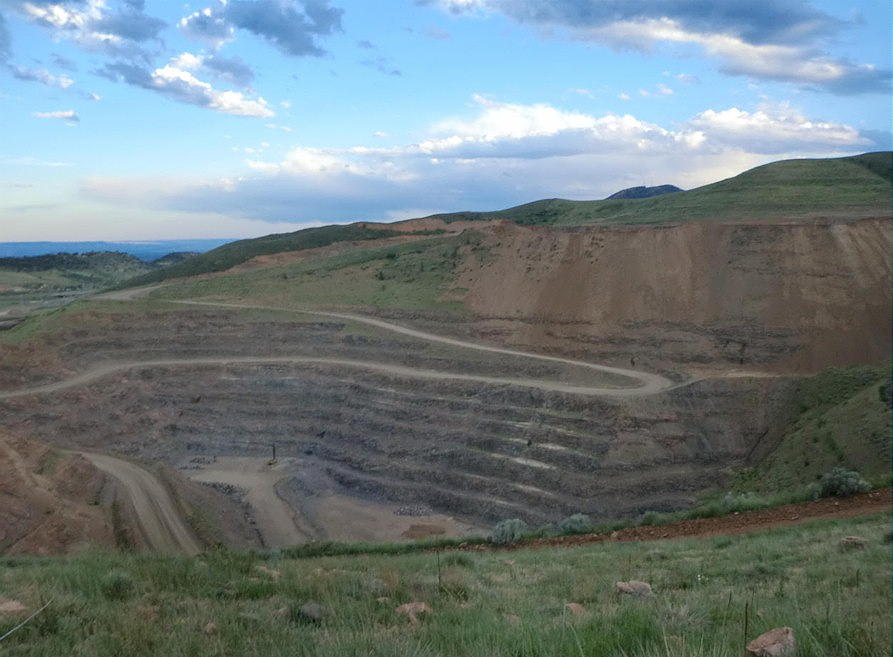
At the same time, the rise of the automobile and demand for surfaced streets created a large demand for aggregate. Perhaps not as alluring as gold and other precious metals, the non-energy mineral resources of crushed rock, sand, and gravel together comprise invaluable commodities that we take for granted, just like clean drinking water. The aggregate industry continues today, amidst much controversy.
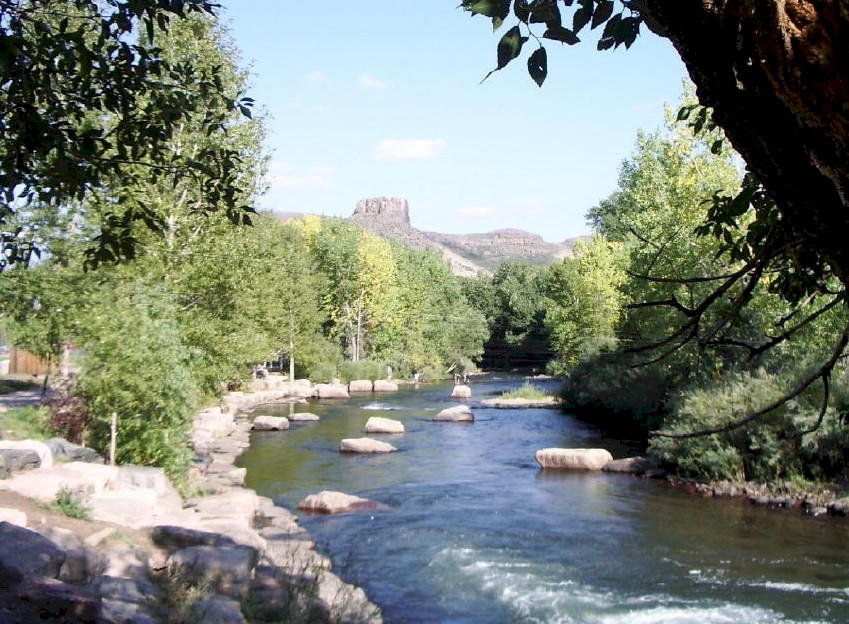
And, perhaps poetically, some of the largest public open-space areas around Golden today have their roots in those controversies. Another mining legacy is that of water quality in Clear Creek. That story began almost immediately after Golden was settled and reached a nadir in 1980. The modern story of water quality in Clear Creek is a tale of metals and nutrients that resulted in a successful cleanup story.
Speaker Bio:
Dr. Donna Anderson, Affiliate Faculty in Geology, Colorado School of Mines
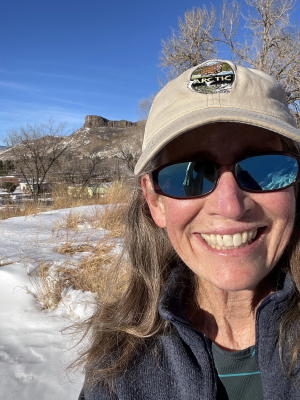
Donna Anderson is a retired (sort of) geologist, having worked since 1974, first in geotechnical engineering and later in the oil and gas industry in the western U.S. and internationally. It took her a while to figure out a career path, so as an undergraduate at California State University at Fullerton she finished in 1974 with two majors, Earth Science and Geography, and a minor in Spanish.
After starting a graduate program in Urban Planning, she finally decided to become a geologist and after working for a while, went on to UCLA, where she earned an M.S. in Geology (1980). After working for 12 years in the oil and gas industry in Denver, and seeing unemployment on the horizon, she went back to school and earned her geology Ph.D. (1997) at Colorado School of Mines (CSM) with a specialty in sedimentary geology.
She has been on the CSM faculty part-time since 2000, having taught courses for engineers and geologists in the classroom and field. Concurrently with CSM, she consulted and worked permanent-part-time in the oil and gas industry, retiring in 2015. She is a past-president of several geologic societies and has served (and still does) on many boards and committees. She has received multiple service and technical awards from the Rocky Mountain Association of Geologists (RMAG), the American Association of Petroleum Geologists (AAPG), and the Rocky Mountain Section of AAPG, including honorary membership of RMAG and AAPG. She is a 2014 graduate of Leadership Golden, where she helped guide that program for two years.
Donna has never forgotten her multi-disciplinary roots and her love of teaching and writing. Today she enjoys peeling back the layers of the geologic landscape for the non-specialist. To that end, she and co-author Paul Haseman recently published Golden Rocks: The Geology and Mining History of Golden, Colorado, a free eBook written for the non-geologist. Research for that book forms the basis for the Golden Beer Talk: Golden’s Mining Roots and Their Legacies.
June 20, 2023
Speaker: Jesse Crock
Topic: Celebrating Golden Arts Week with Golden’s Celebrated Artist
Featured Brewery: Mountain Toad

Jesse Crock is a Colorado-based artist with a love of climbing, cycling, and the outdoors. The rich color and sharp contrast of his acrylic paintings attempt to capture the vibrant Colorado landscape of the places he travels. Jesse is an art teacher who finds that he often connects his work with the playfulness of his students and is inspired by the energy they bring to the classroom.
As an outdoor enthusiast, he brings the viewer’s eye to places that are not often painted. He was chosen as the 2018 Golden Fine Arts Featured Artist and has created several large outdoor murals for the Mountain Toad Brewery, Golden Moon Distillery, and Vital Outdoors and Trailhead Tap house. You can view more of his work at the Mountain Toad Brewery. In Buena Vista, he created numerous paintings for beer labels for the Eddyline Brewery. He exhibits his work at their restaurant and at their tap room you can see his aspen mural.
Please visit his website at…
jessecrockart.com
Tonight’s Featured Brewery: Mountain Toad Brewing
May 16, 2023
Topic: Living in Space: Creating Habitation and Infrastructure for Humans to Live and Work in Orbit, on the Moon, and Beyond
Speaker: Rowan Palmer
Featured Brewery: Holidaily Brewing
Introduction by Jim Clawson
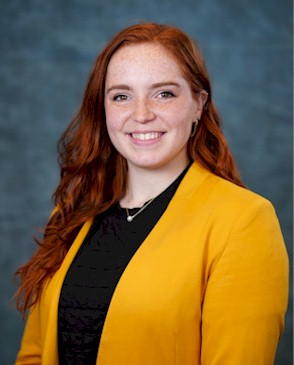
This week’s topic will be Living in Space: Creating Habitation and Infrastructure for Humans to Live and Work in Orbit, on the Moon, and Beyond.
Rowan Palmer is a Systems Engineer for Advanced Programs, Human Space Exploration at Lockheed Martin. A mechanical engineer by education, she was drawn to the space industry by the importance and uniqueness of the problems being solved.
In her role, she supports the development of a more sustainable, interconnected, and accessible future in space, by designing technology for inflatable space habitats and defining the strategy and infrastructure necessary for human and scientific exploration of cislunar space.
She is also a passionate advocate for disability access along with STEM education and empowerment, especially for women in STEM. She is a previous fellow and current selection committee member and mentor for the Brooke Owens Fellowship, an organization supporting undergraduate women and gender minorities breaking into the aerospace field.
Tonight’s Featured Brewery: Holidaily Brewing
March 21, 2023
Dana Coffield

Enlightening Thoughts on Local News from Co-Founder of The Colorado Sun
Introduction by Jim Clarke, Associated Press
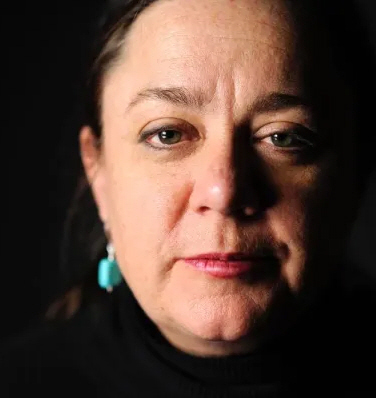
Speaker Bio: Dana Coffield is Senior Editor and co-founder of The Colorado Sun.
She is a Colorado native who became a journalist to try and satiate an endless appetite for knowledge. On the quest, she has worked as an editor and reporter at a variety of publications along the Front Range ranging in size from the Rocky Mountain News to the Louisville Times.
Most recently she was Senior Editor for News at The Denver Post, where she directed coverage of the Aurora theater shooting that led to the Post’s 2013 Pulitzer Prize for breaking news. Sadly, it was her second shared Pulitzer for a gun massacre. Coffield also did stints at The Associated Press and a couple of trade publications, where she developed a keen understanding of telecommunications infrastructure and organic food.
She lives in Lafayette with her husband, a bee hive, four chickens and a mildly intelligent cocker spaniel.
Tonight’s Featured Brewery: New Terrain Brewing
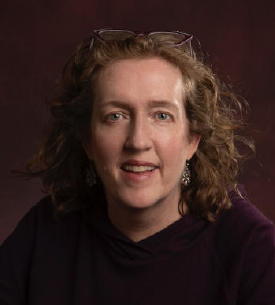
February 21, 2023
Topic: Golden Folks
Speaker: Povy Atchison,
Photographer of Golden Folks exhibit at Golden History Museum
Photographer Povy Kendal Atchison is the artist behind an exhibit of photo portraits highlighting a local wealth of fascinating folks around Golden.
Povy started taking pictures when she was 12 years old, after watching a Charlie perfume commercial. After 44 years, she has photographed for countless magazines, books and non-profits, taking pictures of architecture, food, and people.
Povy will discuss her evolution as a photographer and her connection to her community and the Golden History Museum. She will include photographs from her current Golden History Museum show entitled Golden Folks.
January 17, 2023
Topic: Wildfire Large Animal Evacuations
Speaker: Carla Zinanti – Jefferson County Animal Control Manager
Featured Brewery: Golden City Brewery
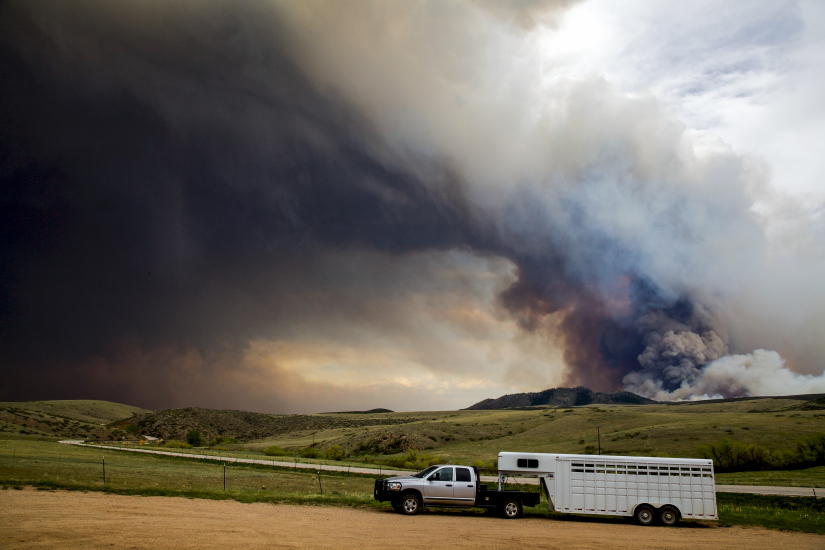
Our first post-pandemic Golden Beer Talk will feature Carla Zinanti – the Manager of the Animal Control Unit for the Jefferson County Sheriff’s Office. Essentially the entire Front Range of Colorado has been identified as a high-risk zone for wildfires, and certainly the recent Marshall Fire underscores the danger that this area is subject to.
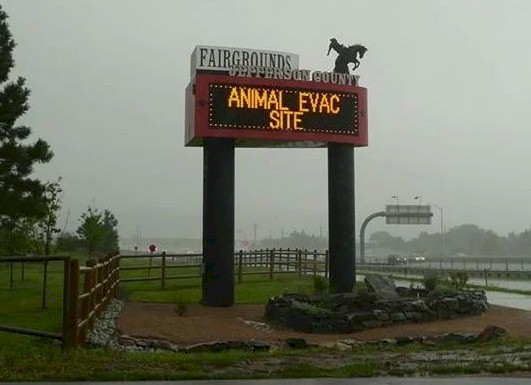
Carla and her Animal Control Unit are in charge of animal evacuations for wildfires, floods, and other events. Carla will briefly describe the massive and complicated structure for emergency evacuations and notices, and delve into details on the efforts and heavy volunteer involvement in evacuating and temporarily housing pets and large animals including livestock when disaster threatens their homes.
AT HOME EDITION
October 2020
Becky Brice, USGS
Tree Rings and Snow: an inside peek at paleoenvironmental research
Snow is not only important for wintertime fun and spectacular views of white-crested peaks along the Colorado Front Range. Snow in the Intermountain West means water. Recent declines in snowpack may be a harbinger for future impact on water supply of the western United States because runoff to rivers and reservoirs is tightly linked to the amount of water present in our snow. Further, recent widespread wildfires in the western United States are a sign of a comprehensive and fundamental shift in climate and the systems affected by it.
This presentation provides updates to expected wintertime weather in 2020-2021 and underscores the importance of long-term information about changes in snowpack and fire in this region. You will be taken on two field expeditions to collect environmental proxies of climate and fire in order to reconstruct conditions in the past. Enjoy spending time in the field with experts and get a first-hand glimpse at the joys and the challenges of paleoenvironmental research.
Speaker bio:
Becky Brice lives in Golden and is a Geographer at the United States Geological Survey. She earned her Ph.D. from the School of Geography and Development at the University of Arizona in 2020 and was a 2017 Climate Assessment for the Southwst Climate and Society Fellow. Her research leverages the finely detailed information contained in tree rings to focus on climate variability, which controls changes in the Earth’s water cycle and hydrologic extremes. Her focus is on water resources and the impacts of climate extremes in the southwestern United States.
September 2020
Dr. Dendy Sloan — On Bias In the Brains Of Good People
Our September video presentation is provided by Dr. Dendy Sloan, who appeared originally at Golden Beer Talks in September 2014 to discuss his book Neuroscience, Memory and Learning with his co-author Dr. Cynthia Norgrann.
Since that time, Dr. Sloan has published a book entitled A Neuroscience Perspective on Learning.
Known more casually as Dendy, Dr. Sloan also is Professor Emeritus at Colorado School of Mines. During his tenure with that entity, he published 5 books related to mining practices.
Inspired by his neuroscience work, Dendy’s video presentation is entitled On Bias In the Brains of Good People (watch it here). It is topical and even includes an online quiz during the Talk!
Golden Beer Talks is deeply grateful to Dendy for his excellent contribution to our At-Home Series.
Our featured brewery this month is Holidaly Brewing Company–a local and national standout for its tasty take on gluten-free beer. Holidaily beers can be found locally on tap at the brewery’s taproom, and at the Buffalo Rose! You can click here for our August edition of Golden Beer Talks At Home Edition!
August 2020
Until we can all meet again in person at our REAL home, the Buffalo Rose, we are offering At Home Editions of Golden Beer Talks! These At Home Editions will include short videos providing an informational talk along with some details about local beers.

Our featured speaker for this At Home Edition is horticultural entomologist Carol O’Meara, a passionate Master Gardener whose work with the Colorado State University Extension. Her many areas of expertise include the history and recent revival of Victory Gardens in the current pandemic, as exemplified by her appearance this month..
Carol is Master Gardener and a widely published gardening expert. Her previous talk in 2017 about growing tomatoes and hops is one of our most popular Past Talks podcasts!
You can click here for our August edition of Golden Beer Talks At Home Edition!
We are also honored to have a local beer recommendation from Luke Smith of Coda Brewing Company!
July, 2020
Claire Zilber, MD
Zoom Fatique
Our featured speaker for this At Home Edition is Dr. Claire Zilber, a two-time past GBT presenter, talking about Zoom Fatigue. Dr. Zilber is a psychiatrist in private practice in Denver and a medical ethicist. Her book, Living in Limbo: Creating Structure and Peace When Someone You Love Is Ill, received a 2018 Silver Nautilus Book Award. She currently serves as President of the Colorado Psychiatric Society.
This month, our featured beer is Colorado Strong, a product of a collaborative fundraising effort by numerous Colorado breweries. Proceeds go to raise money for the Colorado Brewers Guild in addition to healthcare, hospitality, service industry, and gig economy workers across Colorado. Past Golden Beer Talks breweries Over Yonder Brewing Co., CODA Brewing Co., and Bruz Beers participated and have Colorado Strong for sale. Supplies may be limited, but we encourage you to visit these breweries and other local breweries to get some beer!
Click here for our At Home Edition. At the end of the first clip, just let the video continue and it will roll forward to our presentation.
CLASSIC BEER TALKS
March 10, 2020
Dr. Michael Kerwin, Director of Environmental Science and Geology Programs, University of Denver
The Day Cape Town Nearly Ran Out of Water: Implications for Drought and Water Supply in the Denver Area

Listen to podcast of Mike’s talk!
Questions still linger as to how a relatively short drought of 3 years could cause such upheaval in Africa’s tenth largest city and one of the most popular tourist destinations on Earth. Whereas some implicate Cape Town’s inadequate rainfall collection system, others suggest that climatic changes have altered regional rainfall patterns by disrupting the circumpolar vortex that guides westerly storms and frontal systems into the Cape region each winter.
Dr. Kerwin’s talk will explore Cape Town’s plight and its potential implications for the Denver area. Some experts predict that Denver’s future will solidify its position as the cultural, intellectual, and transportation hub of the intermountain west. That is, unless megadrought returns to Colorado—reducing precipitation, snow pack and stream discharge for at least 2 decades and possibly as long as 60 years! In this case—a scenario that tree-ring records suggest as quite possible—all bets are off.
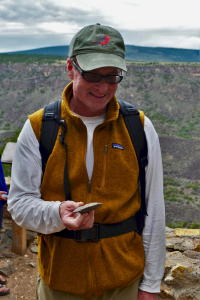
Speaker Bio:
Dr. Michael Kerwin is an Associate Professor of Geography and the Director of the Environmental Science and Geology Programs at the University of Denver. His passion is teaching especially field-based geology and ecology classes where students have the opportunity to collect and analyze data as part of the learning experience. Since 2003, Dr. Kerwin has taught 20 field ecology and geology classes to University students in the southwestern United States, South Africa and Thailand.
In 2007, Dr. Kerwin was awarded the University of Denver’s William T. Driscoll Master Educator Award. In 2012, he won the inaugural Award for Excellence in Teaching from the College of Natural Sciences and Mathematics.
Dr. Kerwin’s research involves reconstructing past temperature and precipitation patterns in Mediterranean, Arctic and arid ecosystems in order to predict future climate changes. Since 2991, he has conducted paleoclimate field work on five continents including Artic Canada, Western Australia, France, southern Africa, and southeast Asia. Currently Dr. Kerwin is collaborating with residents of Cape town to plan for future Day Zero-type droughts that might be worsened by rapidly warming ocean currents in the South Atlantic. He also is using tree ring records in Colorado to examine the frequency of past large rainfall events, which might e needed in the future to fill our reservoirs during times of drought.
Personally, Dr. Kerwin is a Denver native who previously lived in Golden for 14 years with his wife Julie, daughter Catalina, and son James. He is an avid traveler and chef, mostly for his family. In 2009, he studied wine-making and tasting in Western Australia and is an enthusiastic amateur expert on South African varietals. In 2019, he collaborated with the Denver Art Museum for its groundbreaking exhibit on Claude Monet, The Truth of Nature. Dr. Kerwin’s commentary was used as part of the audio guide and as a stand-alone podcast. https://www.youtube.com/watch?v=SWY_B3vZ1ZU
March Guest Tap: Colorado Plus Cidery
February 11, 2020
Claire Zilber, MD
Topic – MAN UP! The Shame-Based Roots of Misogyny
Listen to a podcast of Claire’s talk!
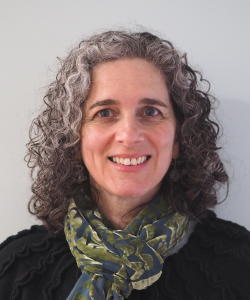
Research shows that parents, teachers and other adults respond differently to little girls and little boys, shaping children’s behavior from very early in life. Boys receive more encouragement to be assertive and even angry, while girls are encouraged to be sensitive and kind. Admonished not to cry or be “a sissy”, boys learn to disavow their softer feelings. This exerts a huge toll for both boys/men and girls/women. Men develop only part of their human potential, cut off from many of their feelings. Having learned to reject the “feminine” aspects of their humanity, men devalue the feminine in others as well, leading to behaviors that subordinate and oppress women.
Rather than blaming men for misogyny, which aggravates the underlying dynamic of shaming men for being who they are, this presentation focuses on increasing our empathy for boys and men. If we deepen our understanding of how our society got to its current state of misogyny and conflict between the sexes, we will be closer to crafting solutions.
This multimedia program will incorporate two slam poetry performances, touch on theories of gender development, summarize recent research on gender equality in youth, and offer discussion about what society can do to heal the false binary of male vs. female so that we all can become whole human beings.

Speaker Bio:
Claire Zilber, MD is a psychiatrist in private practice in Denver and a medical ethicist. Her book, Living In Limbo: Creating Structure and Peace When Someone You Love Is Ill, received a 2018 Silver Nautilus Book Award.
This is Dr. Zilber’s second appearance at Golden Beer Talks, following up on last year’s popular Immune Responses to Stress and Loss.
February 2020 Brewery: Mountain Toad Brewing of Golden
January 14, 2020
Charlie Sturdavant, Founder, Golden City Brewery and Sherpa Brewery
Topic – Sherpa Brewery, Five Years Later
Brewery: Golden City Brewery
Listen to a podcast of Charlie’s talk!
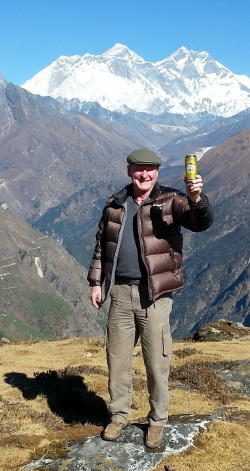
In 2014, Golden City Brewery’s founders began construction of a sister brewery on 10 acres of farmland and forest in Chainpur, Chitwan, Nepal. Golden City’s Charlie Sturdavant will share stories and accomplishments of his company’s enterprise in a rural area of Nepal near the Indian border.
In the intervening years, Sherpa Brewery has introduced craft beer to the region and experienced significant growth, more than quadrupling capacity and adding newer and larger equipment—including a tunnel pasteurizer and a 30-ton glycol refrigeration system, as well as kegerators and 1/6 barrel kegs.
In 2014, the Chainpur area offered spotty and inadequate electricity service, no roadways, a limited skilled labor pool, no access to basic construction supplies, and no municipal water or sewer service.
Sherpa Brewery has fostered many opportunities in the region by building a road and opening the area to development. A neighborhood that once was home to a brick factory and a few shops has been transformed by factories producing chips, snacks, mattresses, noodles, modern bricks, and pharmaceuticals—along with new restaurants, new homes and additional roads.
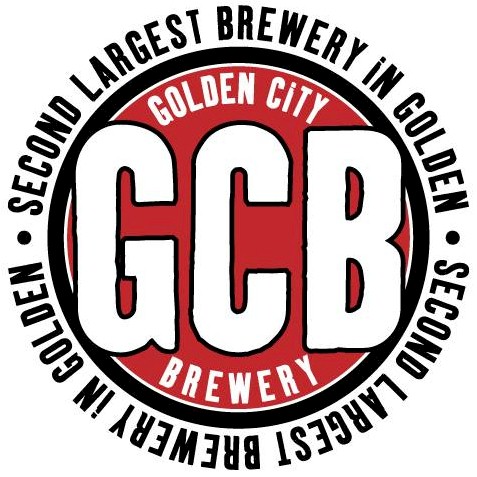
January Brewery
In addition to providing an update on its sister brewery, Golden City Brewery and its beers will be featured at this gathering.

December 10, 2019
Barb Warden, Goldentoday.com
Topic – Funiculars of Golden
Guest Brewery: Bruz Beers
Listen to a podcast of Barb’s talk!
Barb Warden will tell the tale of Golden’s two funicular railways, which were built in 1912 and 1913. Planned as tourist attractions, their popularly was intense, but brief, because in that same period, automobiles were coming into wide use. Convenient as rail travel was, the touring public soon found that driving themselves was even better.
Learn about a Golden that was intent on moving past its pioneer era and into the modern world; about the rivalries between the two funicular promoters, and about Golden’s first foray into the nascent American tourism industry. Hear about a fascinating interlude in Golden’s history!
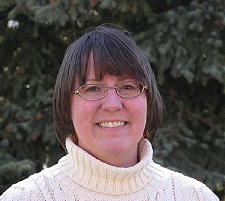
Speaker Bio
Barb Warden runs the website Goldentoday.com , and is the author of the daily email, What’s Happening in Golden?, which often delves into obscure aspects of Golden history For her work with that site, she has received the Golden Chamber’s Civic Award, the Golden Mayor’s Award, and the Golden Landmarks Association’s Living Landmarks Award. She is also a past president of Leadership Golden and one of the founders of Golden Beer Talks!
Barb is the author of three books about Golden, including Funiculars of Golden Colorado. She teaches a Golden history class through OLLI, and is a frequent guest lecturer and tour guide on Golden history topics.
November 12, 2019
Bob Raynolds, Denver Museum of Nature and Science
Topic – Australopithecines to the Anthropocene: A Geologist’s View of Where We Came from and Where We Are Going
Brewery -Cannonball Creek Brewing Company
Listen to a podcast of Bob’s talk!
While we may not have been literally born in the African Rift Valley, our Australopithecine ancestor’s bones are found there because of the coincidence of favorable environments for living and for fossil preservation.
Over the last 4 million years we made 4 quantum leaps: we learned to Speak, we learned to Walk (3.6 MY), we invented Tools (3.3 MY) and we tamed Fire (ca. 2MY?). We left Africa in a steady dribble over the past few million years and settled in Eurasia; a few tens of thousands of years ago we wandered into the New World. Over the past 10,000 years, we made 3 more quantum leaps: Agriculture/Domestication, Cities, and Writing. These carried us through to the eve of the Industrial Revolution when tool-making rose a quantum step and steam and hydrocarbons led us to the gilded era.
We are currently living in a geological age that has been referred to as the Anthropocene, a period in which human activity has become the dominant influence on our world, our climate, and our environment, an era of accelerated extinctions and oil.
Our ascent from our African origins has been accomplished amidst a tragedy of the commons. Beguiled by progress, we have inadvertently, but knowingly triggered and accelerated the sixth extinction. Science has elevated hundreds of millions from poverty during our lifetime—yet we condone a planetary lifestyle where over a billion people lack clean water and 800 million are malnourished. Our world receives more energy than it emits due to man-made modifications of the atmosphere. Ocean temperature and chemistry together with global climate patterns are changing because of our impact. Having climbed to ascendancy in the Anthropocene we can now ponder where we are headed. The world is changing and the rate of change is leading to the Great Acceleration. Young people are coming of age with the realization that we have brought them into life on a planet in peril; they are begging us to pay attention, to act. Perhaps these digital natives will lead us into a new world that we can only dimly discern.
Speaker Bio
Bob is a consulting geologist who has lived in Denver for over 30 years. He has taught at the Center for Excellence in Geology at Peshawar University in Pakistan, at Dartmouth College, and at the Colorado School of Mines where he is presently an adjunct faculty member.
Bob is a Research Associate at the Denver Museum of Nature & Science where his dissertation research on the sedimentary rocks that accumulated at the foot of the Himalayas led him to study rocks in the Denver Basin that record the uplift of the Front Range. This has culminated in a series of publications focusing on deformation history and the stratigraphic control on groundwater distribution patterns.
He is Past-President of the Friends of Dinosaur Ridge and the Colorado Scientific Society. He has taught industry courses on rift valley and Western Interior Basin stratigraphy. His recent lectures focus on the character and integrity of the geological record and its role in helping us understand the impact of changing climate on Colorado’s ecology and water resources.
October 15, 2019
Don Sweetkind, Geologist
Topic – From Uravan to Rulison: Tales from Colorado’s Nuclear Past
Brewery – Resolute Brewing Company

Starting with the discovery of radioactivity in 1898, the development and use of uranium is one of the defining issues of western U.S. history in the past century. Colorado played a central role in that history, from supplying radium to Marie Curie and vanadium for Henry Ford’s Model T cars, to being the site of four underground nuclear tests. Uranium mining and processing in Colorado and surrounding states has left a long-term toxic legacy that will require monitoring for many decades, but the uranium mining boom also opened thousands of miles of backcountry roads that we use for recreation and tourism.
Is uranium set for a revival? In some circles, nuclear power is seen as a “green”, carbon-free energy source. Looking beyond uranium, several other elements are critical to the manufacture of cell phones, electric vehicles, and renewable energy technologies. Current trade policy with other countries, especially China, may have the United States poised to enter a new mining boom across the western U.S. to produce these needed materials.
Don’s talk, “From Uravan to Rulison: Tales from Colorado’s Nuclear Past”, will focus on Colorado’s role in the development and use of uranium in the last century and pose some questions about the future.
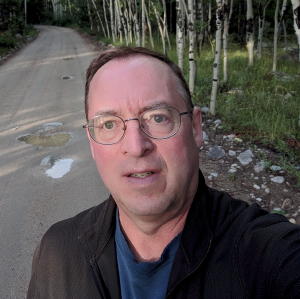
Speaker Bio
Don Sweetkind is a research geologist for the U.S. Geological Survey in Lakewood, CO (and he is also a member of the organizing group for Golden Beer Talks!). Don’s work involves making geologic maps, cross sections, and three-dimensional computer models of the earth’s subsurface to help understand geologic controls on groundwater flow in the western U.S. Don has worked at the Nevada National Security Site (formerly the Nevada Test Site) and at the proposed Yucca Mountain nuclear waste repository.
September 3rd, 2019
Becky Brice, United States Geological Survey
Topic – Tree rings and snow drought: what trees tell us about our changing snowpack
Brewery – New Terrain Brewing Company
Snow is not only important for wintertime fun and spectacular views of white-crested peaks along the Colorado Front Range. Snow in the Intermountain West means water. Recent declines in snowpack may be a harbinger for future impact on water supply of the western United States because runoff to rivers and reservoirs is tightly linked to the amount of water present in our snow.
Tree-rings have been used for nearly a century to understand climate of the past, and to situate current climate conditions into a long-term context. Through research, we’ve learned that trees also record information about the water contained in snow. They provide valuable details about year-to-year snowpack changes and allow us to compare these changes over the past 50 years to those experienced over the lifetime of a tree.
Come to “Tree rings and snow drought: what trees tell us about our changing snowpack” to learn about how trees have been used to better understand snowpack changes in the Four Corners region over the last 300 years and to hear the cautionary tales trees have to tell about future water supplies in the region.
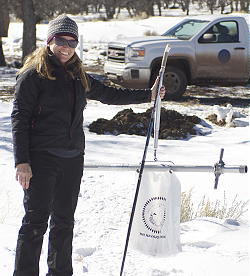
Speaker Bio
Becky Brice lives in Golden and is a research technician at the United States Geological Survey. She is a Ph.D. Candidate in the School of Geography and Development at the University of Arizona and a 2017 Climate Assessment for the Southwest Climate and Society Fellow. Her research leverages the finely detailed information contained in tree rings to focus on climate variability, which controls changes in the Earth’s water cycle and hydrologic extremes. Her focus is on water resources and the impacts of climate extremes on the Colorado Plateau.
This Month’s Local Brewery
New Terrain Brewing Company
August 13th, 2019
Woody Tasch, Founder of Slow Money
Topic – SLOW MONEY: The Front Range and Beyond
Guest Brewery — Over Yonder Brewing Company
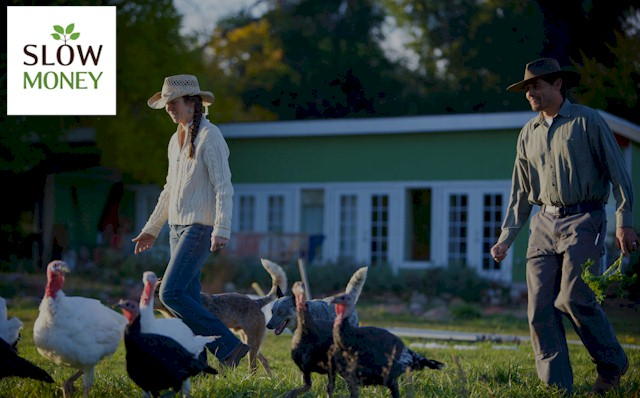
Slow Money is a national movement dedicated to catalyzing the flow of capital to local food systems and “bringing money back down to earth” by connecting local investors to organic farms.
Since 2010, more than $75 million has been invested in over 750 small farms and food enterprises via dozens of volunteer-led local slow money groups around the country. One of the newest elements is SOIL (Slow Opportunities for Investing Locally), which is based in Boulder and making 0% loans by majority vote of its members.
Come hear Slow Money founder Woody Tasch, who lives in the foothills and whose recent book SOIL: Notes Towards the Theory and Practice of Nurture Capital has been called “Walden for the 21st Century.”
Speaker Bio
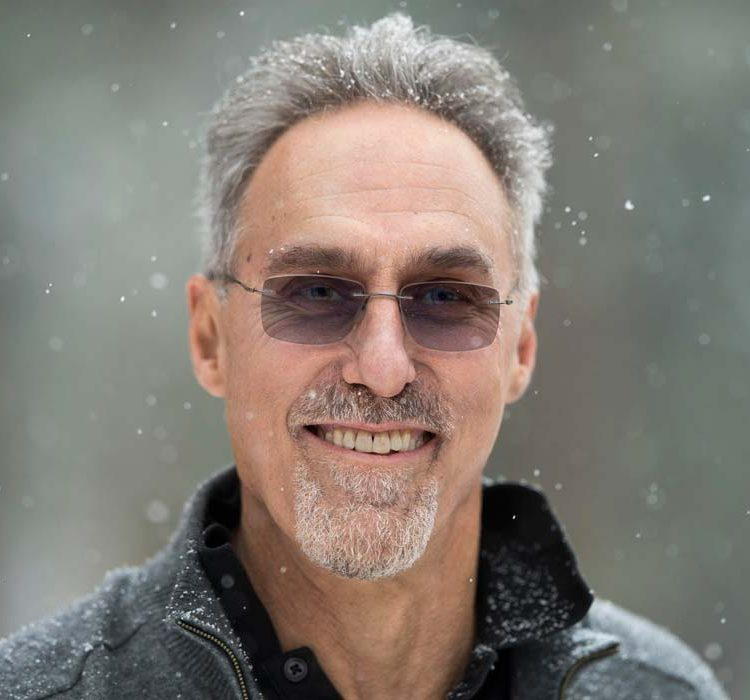
Woody Tasch is the author of Inquiries into the Nature of Slow Money: Investing as if Food, Farms, and Fertility Mattered (Chelsea Green) and SOIL: Notes Towards the Theory and Practice of Nurture Capital (Slow Money Institute).
Tasch is former chairman of Investors’ Circle, a nonprofit angel network that has facilitated more than $200 million of investments in over 300 early-stage, sustainability-promoting companies. As treasurer of the Jessie Smith Noyes Foundation in the 1990s, he was a pioneer of mission-related investing. He was founding chairman of the Community Development Venture Capital Alliance. Utne Reader named him “One Of 25 Visionaries Who Are Changing Your World.”
This Month’s Local Brewery
Over Yonder Brewing Company, Golden Colorado
July 9th, 2019
Bill Kilpatrick – Golden Police Chief
Topic – Keeping the Peace in our Golden, Colorado Community
Guest brewer — 4 Noses Brewing
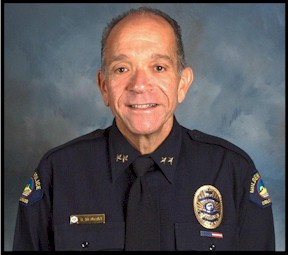
With 30 years of experience keeping the peace in Golden–over half of which have been served in the role of Chief of Police–Chief Kilpatrick knows all about Golden, how it has grown and changed over the years, and what its greatest strengths and challenges are. He will share his plans and insights related to summer code enforcement, homeless issues, interactions with the public related to mental health and substance abuse issues, computer crime, and more. This is a wonderful opportunity to learn more about a local Police Department’s efforts to benefit the community and keep its citizens safe.
Speaker Bio
Chief Kilpatrick joined the Golden Police Department in 1989, having started his career in 1979 with the Englewood Police Department in Englewood, Colorado. He became Chief of Police in December 2002 and established his goal to make Golden Police Department the best policing agency in Colorado. Kilpatrick has a Bachelor’s degree in Criminal Justice, a Master’s degree in Public Administration, and a Juris Doctor degree, and was admitted to the Colorado Bar Association in 1982. Kilpatrick serves on the Jefferson County Criminal Justice Coordinating Committee, an advisory body to the policy makers, judiciary, and stakeholder groups of the criminal justice system in Golden’s community. Among his many notable contributions, he also has served on the Colorado Commission on Criminal and Juvenile Justice, the Suicide Prevention Commission, and the Board of Rocky Mountain Crisis Partners.
June 11th, 2019
Jim Clawson, PhD – Stellar Solutions, Inc., Technical Advisor, NASA
Topic – Boots on the Moon
Guest brewer — Coda Brewing Company
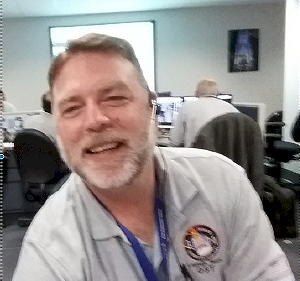
In December of 2017, Space Policy Directive 1 changed the nation’s space policy to provide for a U.S.-led, integrated program with private sector partners for a human return to the Moon, followed by missions to Mars and beyond. Further, at the Fifth Meeting of the National Space Council in March, Vice President Pence remarked, ‘it is the stated policy of this administration and the United States of America to return American astronauts to the Moon within the next five years.’ In order to best accomplish these goals, NASA is going forward to the Moon in two phases. First, we are focused on speed to land the first woman, and next man, on the Moon by 2024. Second, we will establish sustainable missions by 2028. Exploring the moon helps create a vibrant future that establishes American leadership and strategic presence, inspires a new generation, and encourages careers in STEM, leads groundbreaking science and technology, expands U.S. global economic impact, grows U.S. industry and international partnerships, and proves technologies, capabilities and new business approaches for future missions to Mars. This talk will further explore the who, what, when, where , why, and how of getting boots on the Moon by 2024.
Speaker Bio
Dr. Clawson is an aerospace engineer specializing in life support and habitation systems to enable crews to spend extended durations beyond low Earth orbit. Until recently, Jim was a member of the team designing Orion, NASA’s crewed vehicle for deep space exploration. He integrated thermal and power systems as well as scripted the automation sequences for the uncrewed Exploration Flight Test (EFT-1). For the last year, he has been a technical advisor to NASA’s Advanced Exploration Systems Division assisting in acquiring the technology and systems required to return astronaut’s to the moon by 2024.
May 14th, 2019
Dr. Mikki McComb-Kobza, Ocean First Institute
Topic – The World of Sharks
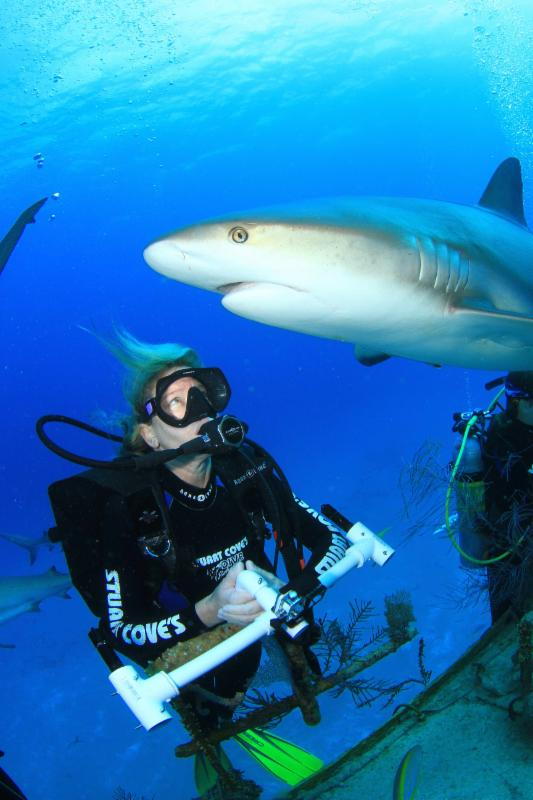
Sharks are iconic and misunderstood species with a long evolutionary history. There are over 500 living shark species, all with unique adaptations, that have radiated into nearly every aquatic habitat. There is tremendous diversity in shark species life histories, reproductive modes, habitat use, sensory biology, ecology, and behavior. Sharks are under global threat from human interference and over 30% are at risk for extinction. Today, research and conservation efforts are targeting effective ways to protect endangered species. For this talk, Dr. Mikki McComb-Kobza will share the story of shark diversification and their fascinating adaptations, as well as aspects of her ongoing conservation and research efforts through the Ocean First Institute.
Ocean First Institute is a nonprofit organization with the mission of ocean conservation through research and education. We work to protect the ocean and imperiled species through scientific research, while also educating youth to take positive action for the environment through community projects and outreach programs.

Speaker Bio
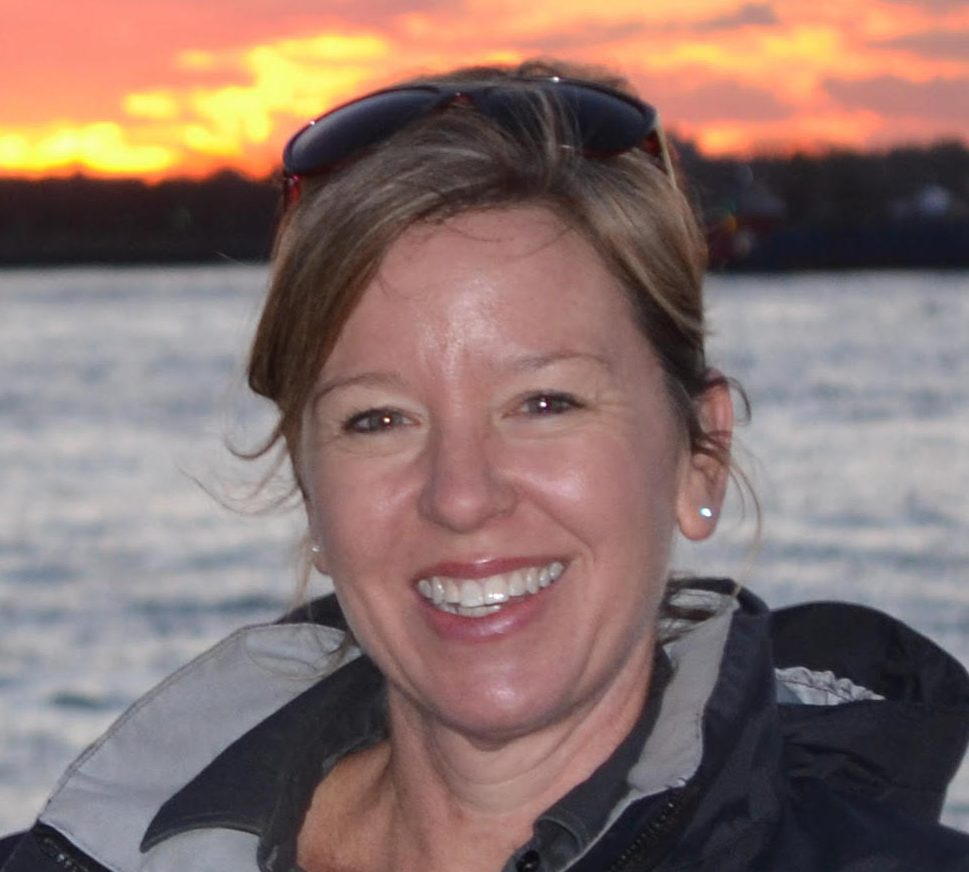
Mikki McComb-Kobza is the Executive Director of Ocean First Institute and strives to bridge the gap between research and education by highlighting the need for conservation. Mikki’s research focus is on sharks and she speaks, teaches and has conducted research in South America, Central America, Africa, Asia and Australia. Her outreach efforts have been covered by the BBC, National Geographic, Discovery Channel’s Shark Week, and CBC National Radio Canada. Mikki holds a Ph.D. in Integrative Biology from Florida Atlantic University and is the author of numerous scientific publications
April 9th, 2019
Speaker – Christina Burri, Denver Water
Topic – Healthy Forests, Healthy Watersheds
Christina Burri will discuss Denver Water’s proactive investments in
forest and watershed health to protect the source water for 1.4 million
people in the Denver Metro Area. She will share the lessons learned in
being reactive to high intensity wildfires, such as the Hayman and
Buffalo Creek fires, and how Denver Water is experiencing a
return-on-investment on proactive forest and watershed management.
Speaker Bio
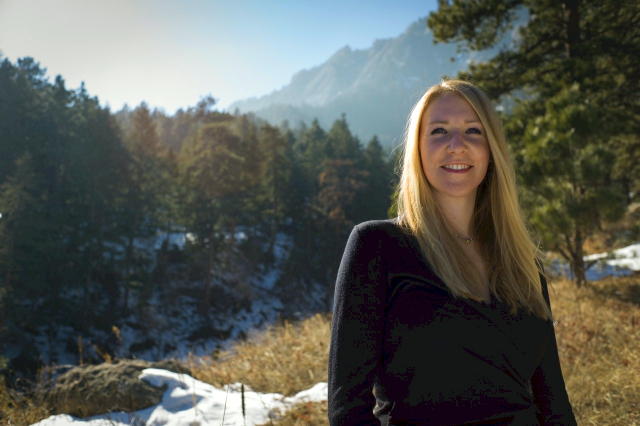
Christina Burri is a watershed scientist at Denver Water. She works
to inventory, protect, and improve the 2.5 million acres of watershed
area in Denver Water’s collection system. She also leads Denver Water’s innovative watershed management and planning efforts, including forest health investments. As part of this effort, Christina manages the “From Forests to Faucets Partnership,” a $66 million agreement between Denver Water, the U.S. Forest Service, Colorado State Forest Service, and Natural Resources Conservation Service to improve the health of Colorado’s forests and watersheds.
Christina serves as the board chair for the Coalition for the Upper
South Platte. She is also involved in several watershed and forest
health collaborative groups such as the Upper South Platte Partnership, Wildfire Watershed Protection Group, Front Range Roundtable, High Country Forest Collaborative, and the South Platte River Urban Waters
Partnership.
Prior to Denver Water, Christina worked as a natural resource specialist for the U.S. Bureau of Reclamation.
Christina holds a degree in Environmental Sciences, with an emphasis on water quality and public health.
In her spare time, she enjoys spending weekends at her cabin and hiking in the Roosevelt National Forest.
March 12th, 2019
Dr. Lisa S. Gardiner
Topic – What Assorted Disasters Teach Us About Climate Change
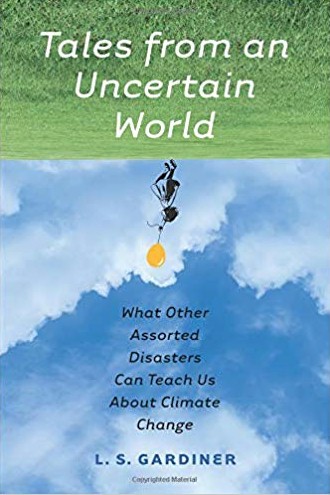
We welcome author and educator Dr. Lisa S. Gardiner of the UCAR Center for Science Education, with a talk about her book Tales from an Uncertain World: What Other Assorted Disasters Can Teach Us About Climate Change.
When it comes to tackling climate change, we need to take quick action, but it can be challenging to know what to do in the face of a global and slow-moving disaster, one that we have never dealt with before. However, we have dealt with smaller scale disasters in the past, and learning from our past experiences can help us navigate climate change.
In this talk, Gardiner will share stories from her book, Tales from an Uncertain World: What Other Assorted Disasters Can Teach Us About Climate Change, illustrating how we can play to our strengths and avoid our blind spots to be more resilient in our changing world. To understand why people are hesitant to take action to tackle the climate change catastrophe, Gardiner investigated how people act during other disasters like floods, fires, invasive species, pollution and earthquakes. Through her explorations she learned that, no matter the type of catastrophe, it is our values, emotions and the way we see risk and uncertainty that determines the actions we take to be resilient.
Speaker bio
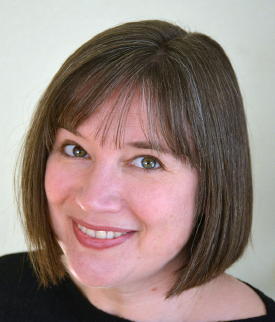
Dr. Gardiner creates educational experiences about weather and climate for blogs, websites, museum exhibits and classrooms at the UCAR Center for Science Education, which is affiliated with the National Center for Atmospheric Research (NCAR) in Boulder. She is a fan of interdisciplinary projects that utilize art and story in order to communicate science. Gardiner also is the author of two and the illustrator of nine books about science for children; she also creates science comics.
Before her education career, research led Gardiner to Bahamian islands where she studied how clams and snails formed communities amidst wild changes in climate and sea level about 120,000 years ago. She holds a PhD in geology from the University of Georgia, a BA in geology and marine science from Smith College, and an MFA in creative nonfiction writing from Goucher College.
February 12th, 2019
Claire Zilber, MD
Topic – Immune Responses to Stress and Loss

Claire Zilber, MD, will discuss the physiological effects of acute and chronic stress, including caregiver stress and grief, on immune functioning. She will review ways to protect against the health effects of stress so that caregivers and people in mourning can remain more physically and emotionally resilient. Copies of the book Living In Limbo: Creating Structure and Peace When Someone You Love Is Ill will be available for purchase at the talk.
Living In Limbo: Creating Structure and Peace When Someone You Love Is Ill.
Laura Michaels, JD, MA and Claire Zilber, MD

Written for the many people who feel trapped in a state of limbo while they shepherd a loved one through a period of illness, this book weaves together a personal story and a clinical perspective, combining individual experience with professional insight. The story centers on Laura’s first-person account of the process of learning about and responding to her husband’s grim medical diagnosis, and wisdom learned along the way. Claire’s accompanying psychiatric and philosophical commentary provides an intellectual framework for the adaptation strategies offered in the story, incorporating elements of psychodynamic, cognitive-behavioral and mindfulness-based therapies.
Speaker Bio
Claire Zilber, MD, received her BA in psychology from Haverford College, her medical degree from Thomas Jefferson University, and her psychiatric training at the University of Colorado. She graduated from the psychodynamic psychotherapy program at the Denver Institute for Psychoanalysis. In 1992, she founded the HIV/AIDS Mental Health Program within the Infectious Disease Clinic at University of Colorado, which she ran for 18 years. Dr. Zilber is in private practice, is a clinical assistant professor in CU’s Department of Psychiatry, and is on the faculty of the Professional/Problem-Based Ethics program at the Center for Personalized Education for Physicians. She has served as Chair of the Colorado Psychiatric Association’s Ethics Committee since 2003, and has also served on the Ethics Committee of the American Psychiatric Association (APA). She is a Distinguished Fellow of the APA, and writes a monthly professional ethics column for the APA’s newspaper, Psychiatric News. She is co-author of the book Living in Limbo: Creating Structure and Peace when Someone You Love Is Ill.
Brewery: Coors
January 8, 2019
Dr. Tom Casadevall – U.S Geological Survey
Topic – Preserving and Promoting America’s Geoheritage
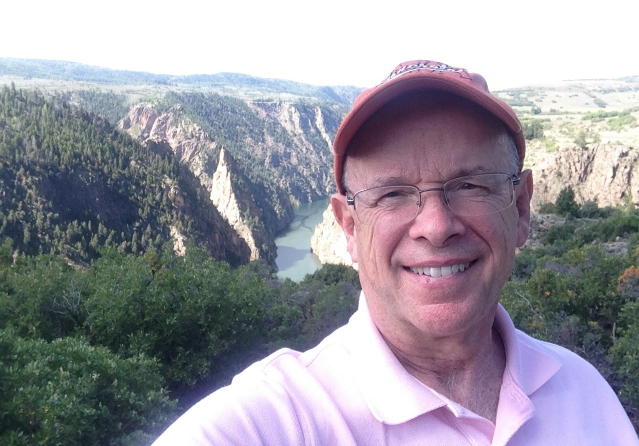
Sites of geological significance in the United States are protected at a variety of federal agencies, including the National Park Service, the Bureau of Land Management, and U.S. Forest Service–as well as tribal, state and local entities.
In 2016, U.S. National Academy of Sciences’ National Committee on Geological Sciences established the U.S. Geoheritage and Geoparks Advisory Group to facilitate communication about geoheritage issues at local, national and international levels. The advisory group’s principal aims are to expand the recognition and understanding of geoheritage domestically, and to provide information and advice to local communities as they pursue development of geoheritage areas and geopark-like entities through currently available designations. Through these efforts, as well as national and international presentations, the advisory group works to raise awareness about geoheritage and promote policies to ensure that the United States’ remarkable legacy is protected for future generations.
Speaker Bio
Thomas Casadevall is a Scientist Emeritus with the U.S. Geological Survey in Denver since 2008. His scientific interests focus on mineral resources related to volcanic environments; on active volcanism and the related hazards to people and aviation operations; and on geologic heritage with an emphasis on Protected Volcanic Landscapes. He currently leads the U.S. Geoheritage and Geoparks Advisory Group and has undertaken the revision of the International Union for the Conservation of Nature (IUCN) thematic study on World Heritage Volcanoes.
From 1996 through 2008, Tom served in the Office of the Director, USGS, with terms are Regional DIrector for the Western Region (1996-1997), Acting Director of the USGS (1998), Deputy Director (1999-2000) and Regional Director for the Central Region (2000-2008). From 1978 to 1996, he worked as a geologist with the USGS Volcano Hazards Program, stationed at the Hawaiian Volcano Observatory, the Cascades Volcano Observatory, the Alaskan Volcano Observatory, and Denver. From 1989 to 1996, he led the USGS project Volcanic Hazards and Aviation Safety. From 1985 to 1998, he was Advisory Volcanologist to the Volcanological Survey of Indonesia, residing in Java, Indonesia. From 1997 to 1998, he taught geology of volcanic environments at the Escuela Politecnica Nacional in Quito, Ecuador. From 1969 to 1972, he worked as a mineral exploration geologist with Bear Creek Mining Company, and from 1972 to 1974 he worked as production geologist for the Sunnyside Gold Mine at Silverton, Colorado.
December 11, 2018
Jeff Roberts – Colorado Freedom of Information Coalition
Topic – Your Right to Know
You may have heard about a time when hundreds of journalists roamed the Denver metro area, keeping an eye on government — among other things — so that people could stay informed about important stuff, like how their tax dollars are spent. Newspaper journalists have become an endangered species in our state, but that doesn’t mean you can’t find out what’s going on in your community if something isn’t covered in the media. The Colorado Freedom of Information Coalition is a nonprofit, nonpartisan alliance of news organizations, groups and individuals that promotes freedom of the press, open courts and open access to government records and meetings. A big part of CFOIC’s mission is to help journalists and the public understand and use their rights of access to the records and proceedings of state and local government and the judiciary.
Speaker Bio
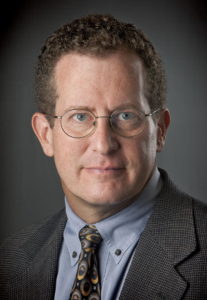 CFOIC Executive Director Jeff Roberts worked in journalism and public policy before coming to the Colorado Freedom of Information Coalition in 2013. Roberts was at The Denver Post from 1984-2007 as a reporter, assistant city editor and data journalism specialist on The Post’s project’s team. He later spent four years at the University of Denver’s Center for Colorado’s Economic Future. Early in his career, he was a reporter at the News-Press in Fort Myers, Fla.
CFOIC Executive Director Jeff Roberts worked in journalism and public policy before coming to the Colorado Freedom of Information Coalition in 2013. Roberts was at The Denver Post from 1984-2007 as a reporter, assistant city editor and data journalism specialist on The Post’s project’s team. He later spent four years at the University of Denver’s Center for Colorado’s Economic Future. Early in his career, he was a reporter at the News-Press in Fort Myers, Fla.
Roberts has bachelor’s and master’s degrees in journalism from Northwestern University. He is a board member of the National Freedom of Information Coalition.
 Title: The Great Influenza Pandemic of 1918
Title: The Great Influenza Pandemic of 1918
Description: November 2018 is the anniversary of the end of World War I, and it is also the anniversary of the Great Influenza Pandemic, often called the Spanish Flu. While the end of World War I is considered an historic event in our history, the 1918 Influenza Pandemic is practically forgotten.
Numbers alone tell a compelling story for the flu being a critical event for humanity. The typical estimates are that approximately 20 million people were killed by World War I over a four-year period, while 50 to 100 million people were killed by the flu–with most of those deaths occurring over a four-month period.
This presentation will shine briefly on the Great Influenza, the important intertwining of the flu with World War I, freedom of speech, and local impacts of and responses to the flu. The flu should be much better remembered, given its impact on humanity.
Speaker Bio:
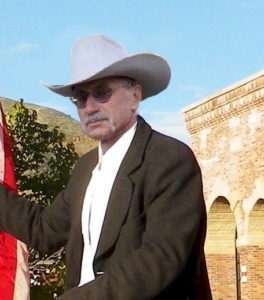 Frank Blaha is an Environmental Engineer, and as such has a strong interest in public health. He has a Master’s Degree in Civil and Environmental Engineering from University of Wisconsin-Madison, and a Bachelor’s Degree from Northwestern University. He is a registered Professional Engineer in Colorado. As part of Frank’s education, the issue of communicable diseases was front and center, where reading included books like John Snow’s On the Mode of Communication of Cholera and Rats, Lice and History. This background partly explains an interest in the Great Influenza of 1918, but another key driver was his father, who was a survivor of the flu. Frank works at the Water Research Foundation, a non-profit organization focused on advancing the science of water, where he has been employed for 22 years.
Frank Blaha is an Environmental Engineer, and as such has a strong interest in public health. He has a Master’s Degree in Civil and Environmental Engineering from University of Wisconsin-Madison, and a Bachelor’s Degree from Northwestern University. He is a registered Professional Engineer in Colorado. As part of Frank’s education, the issue of communicable diseases was front and center, where reading included books like John Snow’s On the Mode of Communication of Cholera and Rats, Lice and History. This background partly explains an interest in the Great Influenza of 1918, but another key driver was his father, who was a survivor of the flu. Frank works at the Water Research Foundation, a non-profit organization focused on advancing the science of water, where he has been employed for 22 years.
Additionally, Frank serves as Beer Ambassador for Golden Beer Talks.
Title: Applying Geological Exploration Methods Towards Locating Clandestine Graves Related to Homicide Investigations
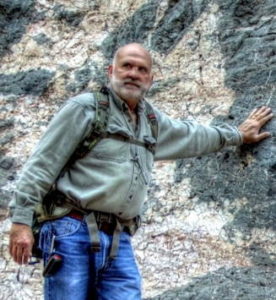 Description: In 1988, NecroSearch International, a non-profit organization, was founded to provide the international law enforcement community with scientific assistance in locating clandestine gravesites related to homicides. Thirty years later, NecroSearch has assisted police and district attorneys with more than 300 cases in 40 states on four continents. Jim’s presentation will describe how that multi-disciplinary expertise of NecroSearch volunteers (e.g. anthropology, botany, criminalistics, entomology, geology, geophysics, meteorology, psychology, etc.) have been applied towards solving crimes.
Description: In 1988, NecroSearch International, a non-profit organization, was founded to provide the international law enforcement community with scientific assistance in locating clandestine gravesites related to homicides. Thirty years later, NecroSearch has assisted police and district attorneys with more than 300 cases in 40 states on four continents. Jim’s presentation will describe how that multi-disciplinary expertise of NecroSearch volunteers (e.g. anthropology, botany, criminalistics, entomology, geology, geophysics, meteorology, psychology, etc.) have been applied towards solving crimes.
Speaker Bio:
Jim Reed is the Director of R&D at RockWare, Inc, a geological software development and consulting company with offices in Golden, Colorado and Lugano, Switzerland. Prior to founding RockWare in 1983, Jim worked at NASA, Arch Coal, Freeport, AMAX, and Wold Minerals. Jim received his geological education at the University of Wyoming and Washington University in St. Louis. He is currently a councilor with the Colorado Scientific Society and a volunteer with NecroSearch International. Over 30,000 individuals, corporations, universities, and government agencies on all continents use Jim’s software products.
See: www.youtube.com/watch?v=rM1eCk0UeTg
Title: Good Maps, Bad Maps, Location Privacy, and Why It All Matters
Description: Mapping and cartography is an ancient art and science, but maps are more relevant and more numerous than ever before. The advent of web based Geographic Information Systems (GIS) has enabled anyone and everyone to make maps and share personal information such as their location. Join Geographer Joseph Kerski as we discuss how you can be a critical consumer of maps, how to make your own maps, and why mapping issues such as location privacy are increasingly relevant.
Speaker Bio: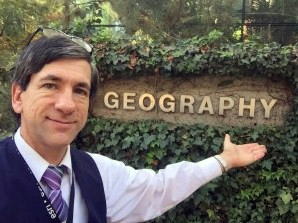 Joseph Kerski is a geographer who believes that mapping and geotechnologies can transform education and society through better decision-making using geography: “A good map helps you ask a better question.” He served for 22 years as geographer and cartographer at NOAA, the US Census Bureau, and the US Geological Survey. He serves as Education Manager for Environmental Systems Research Institute (Esri), where he focuses on GIS-based curriculum development; research in the effectiveness of GIS in education; professional development for educators; and communicating the need for geographic skills, tools, and perspectives. Joseph is active in creating and teaching online courses in spatial thinking and geotechnologies, teaching at the University of Denver, other universities, in K-12 schools, and in online courses. He is the author/co-author of seven books, including the recent book Interpreting Our World: 100 Discoveries that Revolutionized Geography. In 2018, Joseph gave a presentation on the Whys of Where at TEDx Vail.
Joseph Kerski is a geographer who believes that mapping and geotechnologies can transform education and society through better decision-making using geography: “A good map helps you ask a better question.” He served for 22 years as geographer and cartographer at NOAA, the US Census Bureau, and the US Geological Survey. He serves as Education Manager for Environmental Systems Research Institute (Esri), where he focuses on GIS-based curriculum development; research in the effectiveness of GIS in education; professional development for educators; and communicating the need for geographic skills, tools, and perspectives. Joseph is active in creating and teaching online courses in spatial thinking and geotechnologies, teaching at the University of Denver, other universities, in K-12 schools, and in online courses. He is the author/co-author of seven books, including the recent book Interpreting Our World: 100 Discoveries that Revolutionized Geography. In 2018, Joseph gave a presentation on the Whys of Where at TEDx Vail.
Speaker: Dr. Mike Bell – National Park Service Air Resources Division
Topic: Using Science to Influence Management of our National Parks
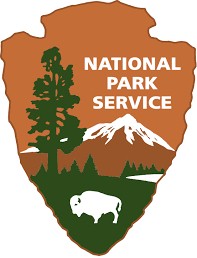 The National Park Service manages 417 units across the United States to preserve natural and cultural resources, and the values of our great nation. From grizzly bears to grizzled peaks and charges to early American history, these units represent some of the most unique places on earth. But as climate change, air pollution and invasive species impact the health of parks, managers must adapt to a new normal in order to preserve the integrity of the ecosystem for future generations.
The National Park Service manages 417 units across the United States to preserve natural and cultural resources, and the values of our great nation. From grizzly bears to grizzled peaks and charges to early American history, these units represent some of the most unique places on earth. But as climate change, air pollution and invasive species impact the health of parks, managers must adapt to a new normal in order to preserve the integrity of the ecosystem for future generations.
To understand the impacts of these changes, the NPS employs scientists to evaluate what has already changed, why it has changed, whether or not we can fix it, and what we can do to prevent similar change in other areas.
Ecologist Mike Bell will discuss how the NPS works with other federal agencies, developers, policy makers, and the public to ensure all work together to maintain a healthy relationship between people and the environment. With a focus on air pollution, he will share the progress made, as well as the methods the NPS is using to enhance the public’s connection to these special places.
Speaker’s Bio:
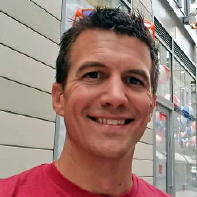 As an ecologist with the National Park Service, Dr. Mike Bell works to understand how air pollution is impacting plants, animals and ecosystems across the park system. Based in Lakewood, Mike has the ability to work with parks across the country, prioritizing those with high air pollution. His focus is determining the amount of air pollution at which the park ecosystems begin to change.
As an ecologist with the National Park Service, Dr. Mike Bell works to understand how air pollution is impacting plants, animals and ecosystems across the park system. Based in Lakewood, Mike has the ability to work with parks across the country, prioritizing those with high air pollution. His focus is determining the amount of air pollution at which the park ecosystems begin to change.
These thresholds are then used to influence management and policy decisions. Additionally, he has a passion for communicating the complex interactions between humans and the environment to try to instill stewardship in the general public. Mike earned his PhD in Botany from the University of California-Riverside and has been working with national parks for 14 years.
Speaker: Archivist Erin McDanal of the Colorado State Archives
Topic: Responses to Drought by Colorado’s Governors.
In large part the history of Colorado is the history of its water use. From at least 1200 A.D. to the current period, the region now known as Colorado has depended on its access to water to support civilization. It hasn’t been easy managing water within an arid and drought-prone region. Many scientists believe that climate change will only stretch the limits of our state’s water supply as Colorado’s population grows, making drought a significant issue in the future as it has been in the past. Erin’s talk will focus on the responses to drought by the governors of Colorado during the development of the state.
Speaker’s Bio:
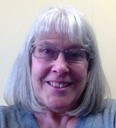 Erin McDanal is a native Coloradan, living here since the early 1950s. She has been an historian and archivist since 1977, with her most “important” claim to fame as co-author of How the Waste Was Won, a history of the Fort Collins sewer system. She worked as an historian, doing public history-type projects and since 1990 has worked at the Colorado State Archives as an archivist. After retiring in 2011, she returned to work on a part-time basis as a water archivist, cataloging the huge amount of records pertaining to water in the Archives. The governors’ collections proved especially interesting, as they shed light on the development of Colorado through its water history. She hopes to spread the word about the Colorado State Archives and the 100,000 cubic feet of state records deposited there.
Erin McDanal is a native Coloradan, living here since the early 1950s. She has been an historian and archivist since 1977, with her most “important” claim to fame as co-author of How the Waste Was Won, a history of the Fort Collins sewer system. She worked as an historian, doing public history-type projects and since 1990 has worked at the Colorado State Archives as an archivist. After retiring in 2011, she returned to work on a part-time basis as a water archivist, cataloging the huge amount of records pertaining to water in the Archives. The governors’ collections proved especially interesting, as they shed light on the development of Colorado through its water history. She hopes to spread the word about the Colorado State Archives and the 100,000 cubic feet of state records deposited there.
Dr. Carla Klehm, Assistant Professor Adjunct at University of Colorado Boulder
Topic – From My Coolest Archaeological Find in Africa to Why Wakanda from Marvel’s Black Panther Movie is (Almost) a Real Place
Or
Just how two giraffes got to China from Africa nearly 80 years before Columbus first visited the Americas is one of many delightful examples of Africa’s long-standing connections to other continents. With the longest record of human history on the globe, Africa offers many surprising stories about which we don’t often hear.
Dr. Carla Klehm’s work as an archaeologist focuses on investigating stories of cultures in contact long before Europeans arrived—in particular, the precolonial kingdoms and states in southern Africa that traded gold and ivory with the Middle East, India and China.
Carla will share stories likely to shift one’s view of the history of sub-Saharan Africa, along with discoveries revealing that Black Panther’s Wakanda is not that far from reality. She also will explain some of the science behind the scenes—from utilizing satellite imagery to “predict” where archaeological sites are located to chemically analyzing glass to source objects from around the world.
Speaker Bio
Dr. Carla Klehm is Assistant Professor Adjunct at University of Colorado Boulder, having received her PhD in Anthropology from University of Texas at Austin in 2013. She has taught about archaeology and Africa at University of Texas at Austin, Washington University in St. Louis, and University of Denver.
Originally a historian and a (failed) pre-med student, Carla found archaeology after merging her love for history and stories with her strengths in quantitative methods. After her first dig in Hungary made her realize she also could travel and be outside for her job, she was sold.
Carla has worked in Africa since 2007, and currently directs a multinational project in Botswana near the Kalahari Desert in southern Africa, supported by the National Science Foundation, National Endowment for the Humanities, National Geographic Society and others. Her research in Botswana investigates questions about the emergence of inequality, urbanization and climate change as the Africa interior is linked through trade to the Middle East and Asia before the arrival of Europeans (ca. 500-1500 AD).
She also has worked in Ethiopia on early human migrations 100,000 years ago out of Africa, in Kenya on 5,000 year-end megalithic monuments, and across Africa on issues of museums and conservation. For a quick and fun read on some of her research, check out theappendix.net/issues/2014/1/trade-tales-and-tiny-trails-glass-beads-in-the-kalahari-desert
May 8, 2018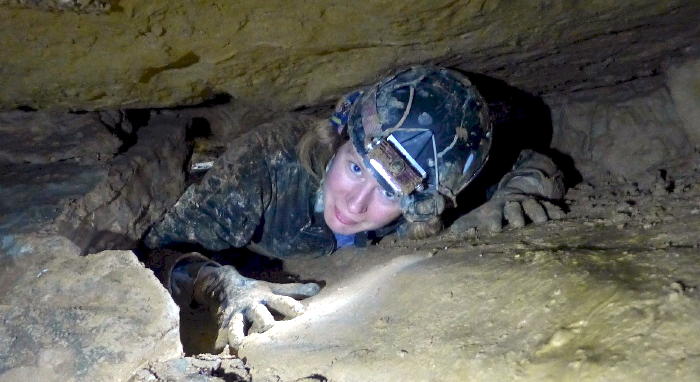 Johanna Kovarik, U.S.Forest Service, National Cave and Karst Program Coordinator
Johanna Kovarik, U.S.Forest Service, National Cave and Karst Program Coordinator
Topic – A Life Underground: Studying and Stewarding the Magical Subterranean World of Caves
Caves and karst landscapes are rich in resources, including the largest springs around the world and the most productive groundwater on Earth. Caves and karst provide a unique subsurface habitat for rare animals. Caves preserve fragile archaeological and paleontological materials for millennia. Throughout history people have used caves for many purposes, from tourism to farming to protection. A growing number of scientists are heading underground to study what caves can offer us as a record of our planet’s past conditions, a home for some of the most fascinating microbes, and in many places the source of our water. It all begins with mapping these caves – the true exploration of these subsurface ecosystems. Learn more about how caves form, how they impact our everyday lives, and travel around the subterranean world with Johanna Kovarik through images and stories of these fantastic places.
Speaker Bio
Johanna Kovarik has been studying and working in caves since she got her first job with the National Park Service in Carlsbad Caverns, New Mexico in 2003. She went on to earn her Masters in Geoscience from Western Kentucky University, and her Ph.D. from the School of Geosciences at the University of South Florida. Her research work is primarily in land use and watershed dynamics, groundwater vulnerability, human disturbance, and natural resource management. In 2014 Johanna was made a Fellow of the National Speleological Society, and she has led and participated in grant-funded cave expeditions around the world as a geoscientist, cave surveyor, and cartographer. She has served for the past six years as the National Cave and Karst Program Lead for the U.S. Forest Service, moving into this role from her work as a geologist and hydrologist on the Tongass National Forest in southeast Alaska from 2004 to 2011. She has also led the National Groundwater Program and managed the GeoCorps internship program for the agency. From 2010 to 2015 she led a multi-faceted project in southern Mexico with the Forest Service’s Office of International Programs, and in 2015 she was awarded the National Rise to the Future: Friend of Fish and Watershed Award from the U.S. Forest Service for her national and international work with karst watersheds. Her latest project was creating and producing an educational program called CavesLIVE on caves and karst, with a 40 minute pre-taped program and a LIVE Q&A program streamed from Blanchard Springs Caverns in Virginia this past March. To learn more, visit www.CavesLIVE.org.
March 13, 2018
Cartographer Catherine Costello – usgs
Topic – Mapping & Tracking Wildland Fires
The Geospatial Multi-Agency Coordination (GeoMAC) app is an internet-based mapping application originally designed for fire managers to access online mapping of locations and perimeters for wildland fires burning in the United States. With a standard web browser, GeoMAC allows fire personnel to view and pinpoint affected areas. With growing concern over western wildland fires, the app became available to the public in 2000. Today, GeoMAC is the primary source for all wildland fire perimeters, and in 2017 the app—including website and data services—received almost 1 billion hits.
Speaker Bio
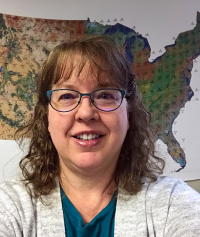 Catherine Costello has been a cartographer with the United States Geological Survey (USGS) for 31 years. Much of her career has revolved around natural hazards. She worked as a GIS (Geographic Information System) specialist during Hurricane Katrina, drove a truck delivering fire fighting supplies for two summers, collaborated with FEMA (Federal Emergency Managemet Agency) on food and landslide hazard maps. Costello recently became the project lead for the GeoMAC group.
Catherine Costello has been a cartographer with the United States Geological Survey (USGS) for 31 years. Much of her career has revolved around natural hazards. She worked as a GIS (Geographic Information System) specialist during Hurricane Katrina, drove a truck delivering fire fighting supplies for two summers, collaborated with FEMA (Federal Emergency Managemet Agency) on food and landslide hazard maps. Costello recently became the project lead for the GeoMAC group.
She has a B.S. in Geography from Utah State University, and an M.S in GIS from the University of Denver.
Speaker – Brian J. Simonds, Physicist – National Institute of Standards and Technology
Topic – Lasers for Manufacturing – Using Light for Welding
High-power laser systems are becoming ubiquitous in manufacturing as they often prove to be faster and cheaper than traditional methods. The development and design of these industrial laser processes require very careful and accurate measurements of phenomenon during the interaction of the intense light with the material. A great example of an important industrial process is laser welding where a focused light beam is used to join two pieces of metal. Using light to melt metal may seem strange as most are pretty reflective. However, in a short amount of time an intense laser light can turn even the shiniest metals into a highly absorbing swirling cavity of metal. At the National Institute of Standards and Technology in Boulder, I measure and observe this transformation to better understand the process in order to help industry know how to make better laser welds. During this talk, I will describe the physical process of how intense laser light melts metal and the novel measurements used to observe the process.
Speaker Bio
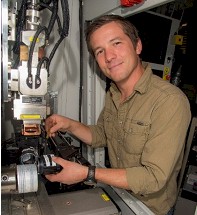 Brian moved to Golden in 2006 to pursue a Ph.D. in Applied Physics from the Colorado School of Mines. This was awarded in 2012 for studies of defects in nanostructured silicon solar cell materials. Not wanting to stray too far from the mountains, he then completed a postdoctoral appointment at the University of Utah where he developed novel laser processes for cadmium telluride solar cells. In 2014, Brian was able to move back to Golden when he joined the National Institute of Standards and Technology (NIST) as a National Research Council postdoctoral fellow; he is currently a staff physicist at NIST. Brian spends most of his free time rock climbing and skiing with his lovely wife Mary.
Brian moved to Golden in 2006 to pursue a Ph.D. in Applied Physics from the Colorado School of Mines. This was awarded in 2012 for studies of defects in nanostructured silicon solar cell materials. Not wanting to stray too far from the mountains, he then completed a postdoctoral appointment at the University of Utah where he developed novel laser processes for cadmium telluride solar cells. In 2014, Brian was able to move back to Golden when he joined the National Institute of Standards and Technology (NIST) as a National Research Council postdoctoral fellow; he is currently a staff physicist at NIST. Brian spends most of his free time rock climbing and skiing with his lovely wife Mary.
January 9, 2018
Speaker – Rex Rideout
Topic – History of the American West through Music and Lyrics
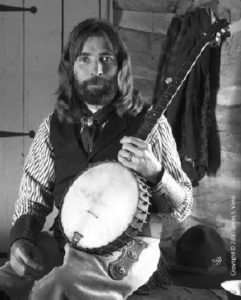 In our increasingly busy and technologically intense lives, we are forgetting some of our heritage, history and connection with the land. Living historians, at places like Bent’s Old Fort in southeastern Colorado, try to re-create and portray these earlier eras in as accurate a manner as possible. Rex Rideout has been immersed for over 30 years in understanding how 19th-Century Americans obtained their food, shelter, and entertainment. The history of music is his particular passion and he approaches this subject as a historian, consulting manuscript materials, diaries and journals, early sheet music, historic photographs, vintage recordings and oral sources. Rex will describe how he conducts his research, share some of his findings, and perhaps perform a song or two.
In our increasingly busy and technologically intense lives, we are forgetting some of our heritage, history and connection with the land. Living historians, at places like Bent’s Old Fort in southeastern Colorado, try to re-create and portray these earlier eras in as accurate a manner as possible. Rex Rideout has been immersed for over 30 years in understanding how 19th-Century Americans obtained their food, shelter, and entertainment. The history of music is his particular passion and he approaches this subject as a historian, consulting manuscript materials, diaries and journals, early sheet music, historic photographs, vintage recordings and oral sources. Rex will describe how he conducts his research, share some of his findings, and perhaps perform a song or two.
Speaker Bio
Rex sings of the American West–from the times of the early explorers, the fur trade, the Civil War and the cattle drive era to the end of the 19th century– by re-creating documented music of the 19th and early 20th centuries. He approaches music as an historian, consulting manuscript materials, diaries and journals, early sheet music, historic photographs, vintage recordings and oral sources. Rex has worked with interpreters of historic sites, humanities councils and theatres in presentation of the life of the first cowboys.
December 12, 2017
Speaker – Joyce Tannian
Topic – Warriors, Water, and Wild Beasts: Quenching Thirst Peacefully in the Shadow of Mt. Kilimanjaro
Joyce Tannian is Founder of Water is Life Kenya, (WILK) a non-profit organization. While working as a volunteer in Kenya in 2006, Joyce saw the glaring need for clean, accessible, dependable water in rural communities in southern Kenya. Water is Life Kenya’s 16 major water projects provide water to nearly 50,000, transforming the lives of women, men and children.
An innovator and creator, Joyce and her team developed WILK’s Livestock as a Business program, which increases incomes by training farmers in improved livestock keeping. Higher incomes, along with effective local water management committees trained by WILK, ensure consistent water supply,
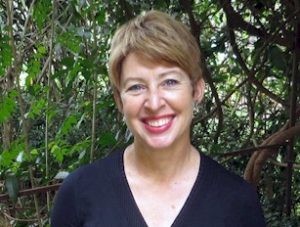 Water is Life Kenya’s Fair Trade Certified beaded handicrafts business brings income to dozens of families, while profits fund WILK’s clean water projects.
Water is Life Kenya’s Fair Trade Certified beaded handicrafts business brings income to dozens of families, while profits fund WILK’s clean water projects.
Speaker Bio
Before the “Kenyan Chapter” of Joyce’s life, she worked at HBO in New York while pursuing a freelance singing career, performing in opera, oratorio and recitals. In Kenya, Joyce appears regularly as mezzo soprano soloist.
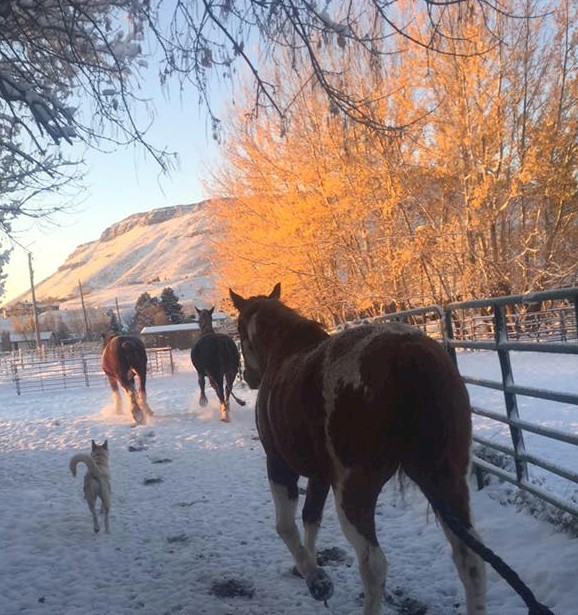 November 14, 2017
November 14, 2017
Speaker – Margaret Blaha
Topic – The Horse Protection League
LISTEN
Our November speaker, Margaret Blaha, will tell us about the Horse Protection League. She will describe why this horse rescue exists and how it came to be housed at the beautiful and historic Churches Ranch, just north of Golden. She will tell us how horses come to the Ranch, what HPL does for them, and how they find new homes.
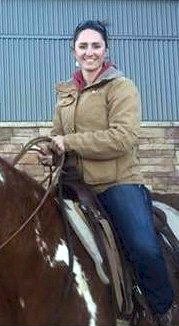 Speaker Bio
Speaker Bio
Margaret Blaha is a life-long horse enthusiast. She participated in Jefferson County-based Westernaires for nine years and spent two years studying horse training under the World Champion Colt-Starter in western Nebraska. She has competed in the Mustang Makeover five times, and placed in the top 10 each time. She is currently training another mustang for the Extreme Mustang Makeover, to be held in Fort Worth Texas in January.
She serves as the full-time Manager of the Horse Protection League, while also training client horses. She owns Clear Creek Carriage Company, which provides the carriage rides for Golden’s public events.
October 10, 2017
Speaker – Adrian Miller
Topic – The President’s Kitchen Cabinet
 Join us as Adrian Miller delves into the fascinating history of presidential chefs. He’ll share stories from his latest book, The President’s Kitchen Cabinet: The Story of the African Americans Who Have Fed Our First Families from the Washingtons to the Obamas. You’ll learn more about these unique cooks were celebrated culinary artists, First Family confidantes, civil rights advocates and more.
Join us as Adrian Miller delves into the fascinating history of presidential chefs. He’ll share stories from his latest book, The President’s Kitchen Cabinet: The Story of the African Americans Who Have Fed Our First Families from the Washingtons to the Obamas. You’ll learn more about these unique cooks were celebrated culinary artists, First Family confidantes, civil rights advocates and more.
If you want a copy of Adrian’s book, please pre-order here: https://blackchefswhitehouse.wordpress.com/about/about-the-book/
Speaker Bio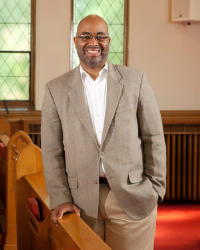 Adrian Miller is a food writer, attorney and certified barbecue judge who lives in Denver, CO. He is currently the executive director of the Colorado Council of Churches and, as such, is the first African American and the first layperson to hold that position. Miller previously served as a special assistant to President Bill Clinton and a senior policy analyst for Colorado governor Bill Ritter Jr. He has also been a board member of the Southern Foodways Alliance. Miller’s first book, Soul Food: The Surprising Story of an American Cuisine, One Plate at a Time won the James Beard Foundation Award for Scholarship and Reference in 2014.
Adrian Miller is a food writer, attorney and certified barbecue judge who lives in Denver, CO. He is currently the executive director of the Colorado Council of Churches and, as such, is the first African American and the first layperson to hold that position. Miller previously served as a special assistant to President Bill Clinton and a senior policy analyst for Colorado governor Bill Ritter Jr. He has also been a board member of the Southern Foodways Alliance. Miller’s first book, Soul Food: The Surprising Story of an American Cuisine, One Plate at a Time won the James Beard Foundation Award for Scholarship and Reference in 2014.
September 12, 2017
Speaker – Philip Skaff of Metropolitan State University
Topic – Inflammation and Human Heath
Our speaker for September will be Metropolitan State University Professor Philip Skaff, with a talk entitled Inflammation and Human Health.
Philip will be discussing the topic of inflammation and its role in overall health. He will focus specifically on how diet and exercise influence inflammation, the role it plays in various diseases, and ways to decrease it.
Speaker Bio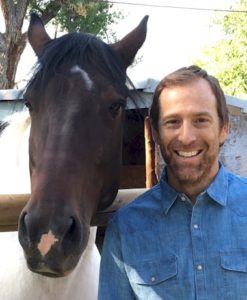 Philip Skaff (MS, RD, and CSSD) is a Colorado native who loves the Colorado lifestyle. He received a Bachelor’s degree in Biology from MSU Denver in 1998. He developed an interest in nutrition during years of travel in developing countries.
Philip Skaff (MS, RD, and CSSD) is a Colorado native who loves the Colorado lifestyle. He received a Bachelor’s degree in Biology from MSU Denver in 1998. He developed an interest in nutrition during years of travel in developing countries.
In 2007, Skaff graduated from Colorado State University with a Master’s degree in Nutrition, and shortly thereafter completed a Registered Dietitian internship with the Florida Department of Education. Since 2009, he has been teaching a variety of classes at MSU Denver, including Cultural Aspects of Nutrition, and Nutrition & Sports Performance. He is Board Certified as a Specialist in Sports Dietetics (CSSD) and works with the MSU Denver Athletics Department to help athletes reach dietary goals for sport.
August 8, 2017
Speaker – Trevor Pellerite, the President of the Colorado Prairie Initiative
Topic – Colorado Prairie Initiative
The Pawnee and Comanche National Grasslands of Colorado provide the public with opportunities to explore one of the most imperiled ecosystems on the continent. The shortgrass prairies of Colorado offer a bounty of unique wildlife, as well as recreational opportunities unlike those afforded anywhere else in the state. But the prairies face many challenges, ranging from energy exploration to incompatible land uses to controversial wildlife management. This presentation will give a brief history of the National Grassland system in the United States and highlight some of the incredible opportunities that are present on the two National Grasslands in Colorado. It will conclude with a discussion of the challenges facing the Colorado prairies and what we can do to protect these incredible places. This presentation will be given by Trevor Pellerite, the President of the Colorado Prairie Initiative, a Fort Collins-based nonprofit organization dedicated to restoring and conserving the prairie and grassland ecosystems of Colorado.
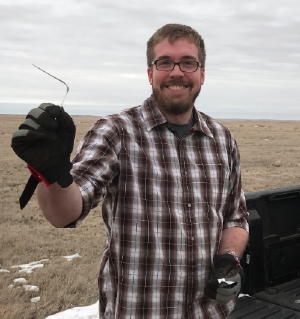 Trevor Pellerite is an attorney and conservation advocate living in Boulder, CO. After growing up in Minnesota, Trevor moved to Colorado to attend law school at CU-Boulder. During his time at CU, Trevor developed a passion for the wide open landscapes of the Colorado prairies, and started the Colorado Prairie Initiative to advocate for its continued protection and conservation. In his spare time, Trevor enjoys fishing, hunting, and bird watching.
Trevor Pellerite is an attorney and conservation advocate living in Boulder, CO. After growing up in Minnesota, Trevor moved to Colorado to attend law school at CU-Boulder. During his time at CU, Trevor developed a passion for the wide open landscapes of the Colorado prairies, and started the Colorado Prairie Initiative to advocate for its continued protection and conservation. In his spare time, Trevor enjoys fishing, hunting, and bird watching.
Speaker – Daniel McNamara – Research Geophysicist with the USGS
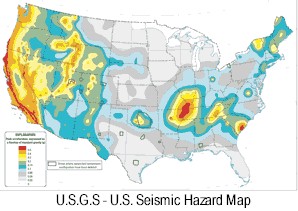 Topic – Forecasting Natural and Human-Caused Earthquakes
Topic – Forecasting Natural and Human-Caused Earthquakes
Learn about how the United States Geologic Survey forecasts potential earthquake hazard and impact. With an emphasis on recent human-caused quakes, this talk will provide a brief history of this phenomena, discuss Colorado’s scientific role and finish with a focus on recent quake activity in Oklahoma, Texas and Kansas.
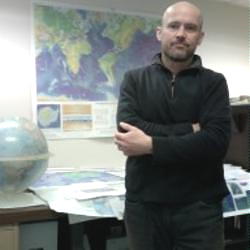 Daniel McNamara is a Research Geophysicist with the USGS Geologic Hazards Science Center, currently working in the National Seismic Hazard Modeling Project on induced earthquake forecasts, ground motion modeling and hazard forecast validation. In addition, Dan works on improving earthquake and tsunami monitoring at the USGS National Earthquake Information Center, using the global network on permanent seismic stations.
Daniel McNamara is a Research Geophysicist with the USGS Geologic Hazards Science Center, currently working in the National Seismic Hazard Modeling Project on induced earthquake forecasts, ground motion modeling and hazard forecast validation. In addition, Dan works on improving earthquake and tsunami monitoring at the USGS National Earthquake Information Center, using the global network on permanent seismic stations.
May 9, 2017
Speaker – Project Manager Scot Grossman, Jefferson County Open Space
Topic – Peaks to Plains
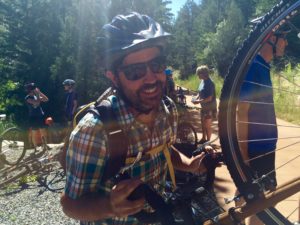 The 65-mile Peaks to Plains Trail will one day connect the 2.5 million residents of the Denver metro area to the Continental Divide at Loveland Pass via a 10-foot wide trail. It will bring visitors to the water’s edge, meander along a steep canyon walls and raging rapid in a one -of-a-kind experience.
The 65-mile Peaks to Plains Trail will one day connect the 2.5 million residents of the Denver metro area to the Continental Divide at Loveland Pass via a 10-foot wide trail. It will bring visitors to the water’s edge, meander along a steep canyon walls and raging rapid in a one -of-a-kind experience.
The area is home to the federally protected Preble’s meadow jumping mouse, cliff-nesting raptors, and big horn sheep–but also rafters, kayakers, anglers, gold panners, rock and ice climbers. It is soon-to-be a place where hikers and cyclists will be able to enjoy a world-class recreation experience.
Come learn about the successes and challenges of working in harsh, Colorado-style conditions, to realize a decades-old vision of a trail with an elevation drop of 5,600 feet from the Continental Divide, deep into the densely populated Denver metropolitan area.
Speaker Bio:
Scot Grossman holds a Master’s of Urban and Regional Planning from the University of Colorado at Denver, a bachelor’s degree in Biology from Colorado College, and more than 10 years’ experience in project management, planning, design and development, field biology, land conservation, public involvement, and construction.
As a field biologist he worked on restoring the historic Atlantic salmon runs in New England, studied the adaptive radiation of Andean cloud forest orchids in Ecuador, as well as the behavioral interactions of canids post wolf reintroduction in Yellowstone National Park.
Most recently, Scot has devoted his last 7 years to Jefferson County Open Space on the Planning and Projects Team, focused on the development and preservation of a diverse open space system of 54,000 acres of land, 230 miles of trails and 28 open space parks. He is the Project Manager for the Peaks to Plains Trail, one of Colorado’s 16 priority projects, and a project of statewide significance. He takes great pride in preserving these special places for both the residents of today and the generations to come.
————————————————————————–
April 11, 2017
Speaker – Carol O’Meara, Colorado State University Extension Horticulture Entomologist
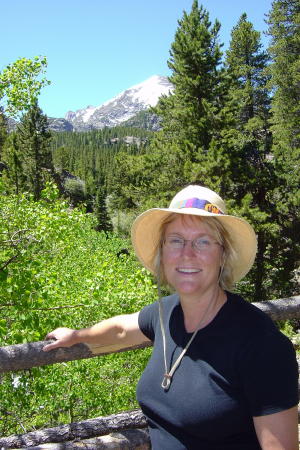 Topic – Growing Hops and Tomatoes in the Rocky Mountain Region
Topic – Growing Hops and Tomatoes in the Rocky Mountain Region
Tomatoes and hops go together like pizza and beer. But growing them is a challenge for Colorado gardeners—one’s a diva and the other’s a wild child. Join us for a discussion on tips and tricks for getting the most from these plants by giving them what they need.
Speaker Bio:
Carol O’Meara is a gardening enthusiast in Boulder County, where she works as a Horticulture Entomologist for Colorado State University Extension. Her gardening articles appear in the Boulder Daily Camera, Longmont Times-Call, Boulder County Home and Garden Magazine, and Loveland Reporter Herald.
——————————————————————–
March 14, 2017
Speaker – Jim Clarke
Associated Press Regional Director for Eight States
Topic – This Just In: How to Spot Fake News
 Have you heard that Hillary Clinton is part of a pedophile ring? Or that both the Pope and Denzel Washington endorsed Donald Trump? Or get this—there’s proof that scientists have conspired to fake global warming evidence?!
Have you heard that Hillary Clinton is part of a pedophile ring? Or that both the Pope and Denzel Washington endorsed Donald Trump? Or get this—there’s proof that scientists have conspired to fake global warming evidence?!
Did you also know that these 3 examples of fake news…?
This talk will focus on what news is, how professionals gather it, the sources to be trusted, how to spot fake news and how to avoid it.
Speaker Bio:
Jim Clarke is the Associated Press regional director for eight states, and has led a wandering life for the news cooperative for the past 24 years.
A Rhode Island native, his time with the AP has taken Clarke from the farthest stretches of the Aleutian Islands to the Deep South and the Utah desert. He has covered the Iditarod, coordinated local efforts for the 2002 Winter Olympics and led the work on the Elizabeth Smart disappearance in Utah, as well as the BTK serial killer case in Kansas.
Before joining the AP in 1993, he worked in Washington, D.C., for The Energy Daily, covering the nuclear power industry and the nuclear weapons complex. He also worked at newspapers in Fairfax, VA and Westerly, RI. He did his undergraduate work at The George Washington University and earned an Masters of Science degree in journalism from Columbia University in 1990.
Clarke lives in Arvada with his wife, Jennifer, and daughters Hope and Grace.
February 14, 2017
Speaker – Dr. John Spear,
Colorado School of Mines Department of Civil & Environmental Engineering
Topic – From Mars to Europa: A Comparison of 82N 82W & 23N 58E
This talk focused on research sites located at Canada’s Ellesmere Island and Muscat, Oman—locations that help scientists further research on far-flung locations like Jupiter’s moon Europa and planet Mars.
Borup Fiord Pass, Ellesmere Island, Nunavut, Canada is an amazing site and model for Europa. It also is a remarkable location for explaining, tracking and better understanding the effects of Climate Change, which is causing the disappearance of this site.
The area west of Muscat, Oman, provides a model site for better understanding the origin of life and how to find life on places like Mars. Research on the biogeochemistry of the subsurface is possible in this unique location, the only site of its kind on planet Earth.
Both of these projects are funded by the National Aeronautics and Space Administration (NASA), and Dr. Spear’s work takes him to both of these sites—with a departure for Oman scheduled a few days after his Golden Beer Talks appearance!
Speaker Bio:
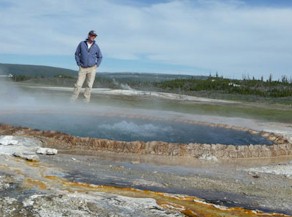 John is a 25 year resident of Golden, Colorado and a professor of Civil and Environmental Engineering at the Colorado School of Mines. Though buried in an engineering department and school, he is really an environmental microbiologist who specializes in life in ‘extreme’ environments having done a lot of work in places like Yellowstone National Park, the bottom the Henderson Mine in Empire, Colorado and Baja California. John also thinks about research, campus wide at Mines, as an Associate Vice President for Research. John likes to ski, and was probably skiing this morning. In Golden, he was one of the founders of the Golden Resource for Education, Arts and Theater (GREAT), which now lives on as the Colorado Environmental Film Festival at the American Mountaineering Center in February.
John is a 25 year resident of Golden, Colorado and a professor of Civil and Environmental Engineering at the Colorado School of Mines. Though buried in an engineering department and school, he is really an environmental microbiologist who specializes in life in ‘extreme’ environments having done a lot of work in places like Yellowstone National Park, the bottom the Henderson Mine in Empire, Colorado and Baja California. John also thinks about research, campus wide at Mines, as an Associate Vice President for Research. John likes to ski, and was probably skiing this morning. In Golden, he was one of the founders of the Golden Resource for Education, Arts and Theater (GREAT), which now lives on as the Colorado Environmental Film Festival at the American Mountaineering Center in February.
Speaker – Dr. Keith Neeves,
Colorado School of Mines Chemical & Biological Engineering Department and University of Colorado Denver Department of Pediatrics
Topic – Injectable Microbots for Removing Blood Clots
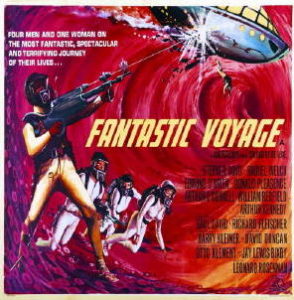 The 1966 science fiction classic The Fantastic Voyage depicted a submarine and its crew, shrunk to microscopic size in order to remove a blood clot from the brain of a defecting Soviet scientist. This talk will describe a better, alternate approach that relies on microbots that researchers call microwheels. These microwheels consist of small blood cell-sized particles assembled, driven and powered by magnetic fields. In his talk, Dr. Keith Neeves will share from his experience and show how microwheels are utilized to ablate blood clots.Speaker Bio:
The 1966 science fiction classic The Fantastic Voyage depicted a submarine and its crew, shrunk to microscopic size in order to remove a blood clot from the brain of a defecting Soviet scientist. This talk will describe a better, alternate approach that relies on microbots that researchers call microwheels. These microwheels consist of small blood cell-sized particles assembled, driven and powered by magnetic fields. In his talk, Dr. Keith Neeves will share from his experience and show how microwheels are utilized to ablate blood clots.Speaker Bio: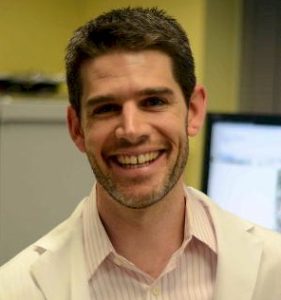 Dr. Neeves is a Colorado native, born and raised in Colorado Springs, who obtained his B.S. in chemical engineering at University of Colorado Boulder and a Ph.D. in chemical and biomolecular engineering at Cornell University. He was a postdoctoral fellow in the Institute for Medicine and Engineering at the University of Pennsylvania before starting his own lab at Colorado School of Mines in 2008 that focuses diagnosis and treatment of cardiovascular diseases. His research is supported by grants from National Institutes of Health, Department of Energy, National Science Foundation and American Heart Association.
Dr. Neeves is a Colorado native, born and raised in Colorado Springs, who obtained his B.S. in chemical engineering at University of Colorado Boulder and a Ph.D. in chemical and biomolecular engineering at Cornell University. He was a postdoctoral fellow in the Institute for Medicine and Engineering at the University of Pennsylvania before starting his own lab at Colorado School of Mines in 2008 that focuses diagnosis and treatment of cardiovascular diseases. His research is supported by grants from National Institutes of Health, Department of Energy, National Science Foundation and American Heart Association.Speaker – Fred Linton
Topic – MillerCoors Environmental Sustainability
Listen here or on iTunes
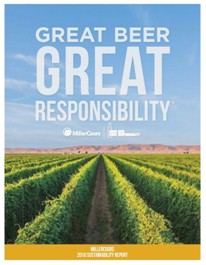
Our environmental sustainability strategy strives to reduce environmental impacts at every stage of the brewing process and focuses on three main areas:
- Reducing water use in our manufacturing facilities and agricultural supply chain
- Reducing our carbon footprint across our value chain
- Eliminating waste at all major manufacturing facilities
I’ll share some of the gains across MillerCoors and some of the gains we’ve achieved at the Golden Brewery and how we achieved them.
Speaker Bio:
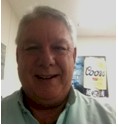 I have a chemical engineering degree from Colorado University and an MBA from Denver University. I’ve worked at the Golden Brewery for 26.5 years and held multiple positions during that time. Currently, I’m the Environmental and Sustainability Engineer for the Golden Brewery. Prior to that I worked at Phillips 66 as a reservoir and production engineer.
I have a chemical engineering degree from Colorado University and an MBA from Denver University. I’ve worked at the Golden Brewery for 26.5 years and held multiple positions during that time. Currently, I’m the Environmental and Sustainability Engineer for the Golden Brewery. Prior to that I worked at Phillips 66 as a reservoir and production engineer.
Speaker – Rick Grubin
Watch this: kbyg.org
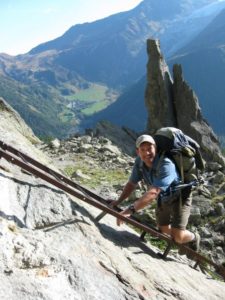 Avalanches can happen to those skiing, snowboarding, snowmobiling, hiking, driving, hunting, bike riding, and more. If you live, work, or recreate in snowy mountains, you need to learn about avalanches – it may save your life, or enable you to provide important information for friends and family members likely to benefit.Avalanches kill an average of 42 people each year in North America, and hundreds more are injured. This talk provides vital coaching from the Know Before You Go (KBYG) program, bolstered by the extensive field experience of our speaker, Rick Grubin.Speaker Bio:Rick is a member of the Loveland Ski Patrol snow safety / mitigation team, and oversees avalanche education and training for all on-mountain ski area staff. He is a qualified course leader and instructor for the American Institute for Avalanche Research and Education (AIARE), and a former member of the American Avalanche Association governing board. He presents KBYG to honor the memory of his friend who perished in an avalanche in December, 2010.
Avalanches can happen to those skiing, snowboarding, snowmobiling, hiking, driving, hunting, bike riding, and more. If you live, work, or recreate in snowy mountains, you need to learn about avalanches – it may save your life, or enable you to provide important information for friends and family members likely to benefit.Avalanches kill an average of 42 people each year in North America, and hundreds more are injured. This talk provides vital coaching from the Know Before You Go (KBYG) program, bolstered by the extensive field experience of our speaker, Rick Grubin.Speaker Bio:Rick is a member of the Loveland Ski Patrol snow safety / mitigation team, and oversees avalanche education and training for all on-mountain ski area staff. He is a qualified course leader and instructor for the American Institute for Avalanche Research and Education (AIARE), and a former member of the American Avalanche Association governing board. He presents KBYG to honor the memory of his friend who perished in an avalanche in December, 2010.Speaker – Jason Hanson
Topic – Brew Your Own: The History of Home Brewing in America
From the earliest colonists to the today’s hobbyists, Americans have made their own beer for centuries. These home brewers have, at times, met demand in times of scarcity, thwarted embargoes and prohibitions, kept traditions alive, pioneered new styles, and ultimately given rise to today’s craft beer industry. This talk will raise a pint to this rich history as we explore who these home brewers were, why they brewed their own, and what they brewed.
This will be Jason’s third appearance, and the 3-year anniversary, for Golden Beer Talks!
Speaker Bio:
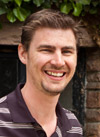 Jason Hanson is the Director of Interpretation and Research at History Colorado, where he facilitates the exhibit program for the History Colorado Center in downtown Denver and at community museums around the state.
Jason Hanson is the Director of Interpretation and Research at History Colorado, where he facilitates the exhibit program for the History Colorado Center in downtown Denver and at community museums around the state.
——————–
September 13, 2016
Speaker – Ken Regelson
Topic – 100% Renewables? Let’s Go!
Listen here or on iTunes
In a world of boring, heavy, complex information about energy and climate change, Ken’s talks are a breath of fresh air – fun, upbeat, quick, and clear! This talk will cover renewable energy cost and comfort, as well as strategies for transitioning to 100% renewable energy—or darn close. Other topics will be electrifying cars and the surprising changes in the last year that may indicate a tipping point for renewable energy.
Speaker Bio:
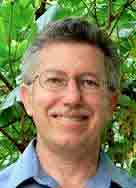 Ken Regelson is an energy policy analyst, storyteller, and a clean energy advocate. As the founder of EnergyShouldBe.org, (meaning Energy Should Be News), he makes short videos encouraging action toward a 100% renewably-powered world by 2035 – videos with more than 95,000 YouTube views. Regelson has many awards for his work in renewable energy and a Masters Degree in electrical engineering.
Ken Regelson is an energy policy analyst, storyteller, and a clean energy advocate. As the founder of EnergyShouldBe.org, (meaning Energy Should Be News), he makes short videos encouraging action toward a 100% renewably-powered world by 2035 – videos with more than 95,000 YouTube views. Regelson has many awards for his work in renewable energy and a Masters Degree in electrical engineering.
August 9, 2016
Speaker – Cristi Painter, United States Forest Service
Topic – Thunder Basin National Grassland – A Visual Tour
Thunder Basin National Grassland is home to many imperiled species like the black-tailed prairie dog, burrowing owl, and mountain plover. Located in northeastern Wyoming and spanning approximately 553,000 acres, Thunder Basin is the only National Grassland in Wyoming.
With an amalgamation of ecosystems that converge in one location, Thunder Basin provides for a variety of wildlife species that call it home and a vast array of beautiful vistas like nowhere else. Grasslands are some of the most imperiled ecosystems on the planet due to climate change and human development, and this presentation will introduce you to the beauty of Thunder Basin National Grassland, and perhaps create interest in all of the other National Grasslands.
Speaker Bio:
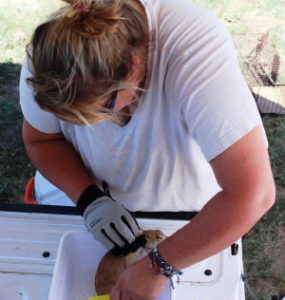 Cristi Painter is a Wildlife Biologist for the United States Forest Service, Douglas Ranger District in Wyoming. Most of her work is centered on the Thunder Basin National Grassland. Painter has spent the bulk of her career working on National Grasslands, either for the US Forest Service or other Federal agencies and/or State agencies. A native of Colorado, she received her Bachelor’s Degree from the University of Wyoming in Wildlife and Fisheries Biology and Management. As reflected by her remarkable photography, Painter has a great passion for grasslands and enjoys introducing people to all the wonderful resources the grasslands hold.
Cristi Painter is a Wildlife Biologist for the United States Forest Service, Douglas Ranger District in Wyoming. Most of her work is centered on the Thunder Basin National Grassland. Painter has spent the bulk of her career working on National Grasslands, either for the US Forest Service or other Federal agencies and/or State agencies. A native of Colorado, she received her Bachelor’s Degree from the University of Wyoming in Wildlife and Fisheries Biology and Management. As reflected by her remarkable photography, Painter has a great passion for grasslands and enjoys introducing people to all the wonderful resources the grasslands hold.
July 12, 2016
Speaker – Dr. Robert G. Hancock, Metropolitan State University, Denver
Topic – Mosquitoes, Bed Bugs and Other Blood-Sucking Monsters
 Blue jungle mosquitoes that feed on monkeys, swarming hoards of “swamp angel” mosquitoes in the everglades, wicked mosquitoes that transmit Zika, West Nile and other agents of disease, bedbugs, lice… believe it or not, Dr. Hancock loves them all. He finds a special beauty in their syringe-like anatomies and marvels at the ways in which they steal blood from titanic hosts (like us) to survive and reproduce. This Golden Beer talk will make you laugh, squirm and wonder about the amazing world of blood suckers and one man’s pursuit to get to know as many of them as he can.
Blue jungle mosquitoes that feed on monkeys, swarming hoards of “swamp angel” mosquitoes in the everglades, wicked mosquitoes that transmit Zika, West Nile and other agents of disease, bedbugs, lice… believe it or not, Dr. Hancock loves them all. He finds a special beauty in their syringe-like anatomies and marvels at the ways in which they steal blood from titanic hosts (like us) to survive and reproduce. This Golden Beer talk will make you laugh, squirm and wonder about the amazing world of blood suckers and one man’s pursuit to get to know as many of them as he can.
Speaker Bio:
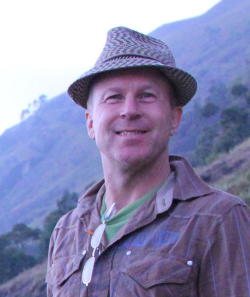 Filmmaker, Entomologist and Dynamo Dr. Robert G. Hancock has studied, taught about and filmed insects all over the world. His spectacular close-up footage has been featured on network and cable television programs world-wide and his documentary series “MosquitoMan” has won significant international awards. As an authority on mosquitoes, bedbugs and other blood-sucking insects, Hancock is the author of many scholarly articles on their behavior and physiology. After serving 15 years as a beloved and highly-decorated Professor of Biology at the University of the Cumberlands in Williamsburg, KY, Hancock brought his talent and enthusiasm in 2008 to Metropolitan State University of Denver.
Filmmaker, Entomologist and Dynamo Dr. Robert G. Hancock has studied, taught about and filmed insects all over the world. His spectacular close-up footage has been featured on network and cable television programs world-wide and his documentary series “MosquitoMan” has won significant international awards. As an authority on mosquitoes, bedbugs and other blood-sucking insects, Hancock is the author of many scholarly articles on their behavior and physiology. After serving 15 years as a beloved and highly-decorated Professor of Biology at the University of the Cumberlands in Williamsburg, KY, Hancock brought his talent and enthusiasm in 2008 to Metropolitan State University of Denver.
A native of Scottsbluff, Nebraska, Hancock graduated with Bachelors degrees in Biology and Chemistry from Hastings College (Nebraska) and M.S. and PH.D. degrees in Medical Entomology from the Ohio State University. Hancock currently lives in Denver, CO with his blues/jazz/soul singer wife Diane Jobe. On weekends he can often be seen playing the trumpet in her band.
June 14, 2016
Speakers – Judy Denison and Don Parker
Topic – Save The Mesas: How a Local Citizen Group Fought for Golden’s Trademark Open Space
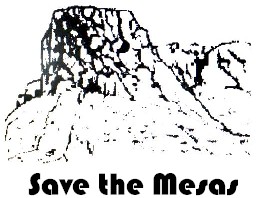 Many people enjoy and utilize the open space areas found on Golden’s North and South table mesas, yet not all are aware of the fight to keep Nike from building a complex for 5,000 employees on North Table Mountain in 1998. Although both mesas are well used recreation areas today, this was not always an assured outcome.
Many people enjoy and utilize the open space areas found on Golden’s North and South table mesas, yet not all are aware of the fight to keep Nike from building a complex for 5,000 employees on North Table Mountain in 1998. Although both mesas are well used recreation areas today, this was not always an assured outcome.
Judy Denison and Don Parker, two of the founders of Save The Mesas, will discuss the work of the citizen group they helped create and led during the controversy. The legacy of their activism continues to echo through daily life for Goldenites and visitors.
Speaker Bios:
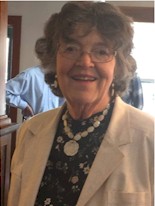 Judy Denison grew up in rural western Massachusetts, and came to Colorado for graduate school. She has lived in Golden for 25 years. She was a co-founder of Save The Mesas, Mesa Music Fest, Table Mountains Conservation Fund, CINQ (beltway issues), Golden Relief Group, Belize Education Project, Golden Action for Public Safety, Golden Community Choirs, and Golden Votes, and has been active in the Rotary and political campaigns. She has published the Golden Newsletter for 18 years. Her children and their families live in Parker, Laramie, Torrance CA, and Germany.
Judy Denison grew up in rural western Massachusetts, and came to Colorado for graduate school. She has lived in Golden for 25 years. She was a co-founder of Save The Mesas, Mesa Music Fest, Table Mountains Conservation Fund, CINQ (beltway issues), Golden Relief Group, Belize Education Project, Golden Action for Public Safety, Golden Community Choirs, and Golden Votes, and has been active in the Rotary and political campaigns. She has published the Golden Newsletter for 18 years. Her children and their families live in Parker, Laramie, Torrance CA, and Germany.
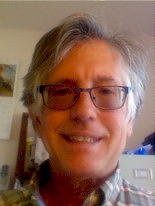 Don Parker and his wife Mary moved from Denver to Golden in 1989. When Nike proposed a development on South Table Mountain in 1997 he and Mary and many other Golden residents formed Save the Mesas and the Table Mountain Conservation Fund and became active in working to counter the proposal and then to get both Table Mountains into Open Space so there would be no further development threats. Don grew up in rural Sedgwick County Colorado (where the population has been dropping since the 1930s). Don owns Golden Solar, a solar panel installation company.
Don Parker and his wife Mary moved from Denver to Golden in 1989. When Nike proposed a development on South Table Mountain in 1997 he and Mary and many other Golden residents formed Save the Mesas and the Table Mountain Conservation Fund and became active in working to counter the proposal and then to get both Table Mountains into Open Space so there would be no further development threats. Don grew up in rural Sedgwick County Colorado (where the population has been dropping since the 1930s). Don owns Golden Solar, a solar panel installation company.
May 10, 2016
Speaker – Deputy State Historian Jason Hason
Topic – Beer Here! A Local History of Brewing in Colorado
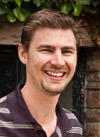 The first locally brewed key of Colorado beer was tapped in Denver to rave reviews from residents at the end of 1859, and today more than 300 breweries throughout the state pour locally made libations for appreciative patrons.
The first locally brewed key of Colorado beer was tapped in Denver to rave reviews from residents at the end of 1859, and today more than 300 breweries throughout the state pour locally made libations for appreciative patrons.
Hanson explores the history of the state’s early breweries and the agricultural enterprises that supported them. Along the way, Hanson investigates what the state’s brewing industry can tell us about broader economic forces–and what exactly it means to buy local when you’re buying the next round.
In addition to his duties as Deputy State Historian at History Colorado, Hanson is a member of the research faculty at the Center of the American West at the University of Colorado Boulder. His work focuses on issues related to natural resource development, land use and Colorado history–with a beer in hand when applicable!
April 12, 2016
Speaker – Dr. Kathryn Johnson, Colorado School of Mines
Topic – The Evolution of Wind Energy in Colorado and Beyond
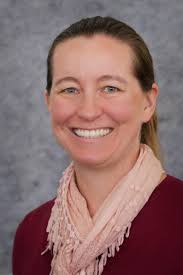 Wind energy systems have the potential to contribute significantly to the electricity mix in Colorado and across the United States. Between 2005 and 2014, Colorado’s wind-generated electricity increased from 1.5% to 13.6% of total generation, according to the U.S. Energy Information Administration. Colorado currently ranks 10th in the U.S. for wind energy installations, with approximately 3000 MW of installed capacity.
Wind energy systems have the potential to contribute significantly to the electricity mix in Colorado and across the United States. Between 2005 and 2014, Colorado’s wind-generated electricity increased from 1.5% to 13.6% of total generation, according to the U.S. Energy Information Administration. Colorado currently ranks 10th in the U.S. for wind energy installations, with approximately 3000 MW of installed capacity.
Wind energy presents a major growth opportunity spanning 2014’s 4.4% of national electricity generation and the 20% penetration described in the U.S. Department of Energy’s 20% Wind Energy by 2030 report.
Dr. Kathryn Johnson will describe how advances in wind turbines have contributed to the rapid growth of wind energy systems and how local research has contributed to that growth. She also will describe future directions for wind energy systems that will enable more cost-efficient clean energy generation.
Dr. Kathryn Johnson is an Associate Professor at the Colorado School of Mines in the Department of Electrical Engineering and Computer Science and is Jointly Appointed at the National Renewable Energy Laboratory’s National Wind Technology Center. Since 2002, she has studied wind energy control systems, in which she and her team work to improve the operation of wind turbines and wind farms using advanced control system methods. Recently, she was part of a successful bid for a DOE “ARPA-E” award to design and study a Segmented Ultralight Morphing Rotor to enable a 50-MW turbine.
March 8, 2016
Speaker – Dr. Kenneth Gage, Centers for Disease Control and Prevention (CDC)
Topic – Plague and Other Vector-Borne Diseases in Colorado
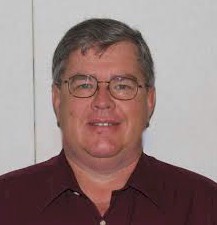 News coverage in recent years has highlighted cases of plague in Colorado—just one aspect of the broad expertise possessed by Dr. Kenneth Gage. Gage will discuss recent plague cases in our region, and provide useful information about how the disease is transmitted and diagnosed.
News coverage in recent years has highlighted cases of plague in Colorado—just one aspect of the broad expertise possessed by Dr. Kenneth Gage. Gage will discuss recent plague cases in our region, and provide useful information about how the disease is transmitted and diagnosed.
In his work with the CDC’s Division of Vector-Borne Diseases (DVBD), based in Fort Collins, Gage oversees efforts to prevent and control diseases transmitted by mosquitoes, ticks, fleas and mites—including plague, West Nile virus, Lyme disease, Zika virus and Heartland virus.
As Chief of Entomology and Ecology Activity at DVBD, Gage focuses on domestic and international monitoring, prevention and control of vector-borne diseases on behalf of CDC, and as a consultant to the World Health Organization (WHO) and its affiliates. Gage is the author/co-author of more than 183 scientific publications, including 127 peer-reviewed articles, 8 invited reviews and 21 book chapters.
Spread of the Black Death in Europe (1346–53)
Source: https://en.wikipedia.org/wiki/Black_Death
(Because it’s just not a complete plague discussion without a mention of the Black Death in medieval Europe.)
Listen to some of our earlier Beer Talks on the Past Talks page!
February 9, 2016
Speaker – Darren Beck
Topic – Our Precious Platte River: Endangered Species Recovery and Habitat Restoration
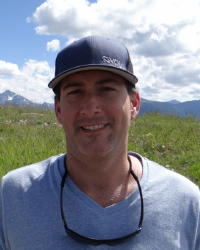 Since 1997, a cooperative effort known as the Platte River Recovery Implementation Program (PRRIP) has worked to improve management of the Platte River for the health of the ecosystem and the people who depend upon it—including residents of the greater Denver metro area. At the helm of this effort, Darren Beck leads this endangered species recovery and habitat restoration project, which is based on a unique partnership between the states of Colorado, Wyoming and Nebraska, as well as the federal Department of Interior. The PRRIP is focused on increasing stream flows and supporting the endangered whooping crane, the threatened piping plover, interior least tern and pallid sturgeon.
Since 1997, a cooperative effort known as the Platte River Recovery Implementation Program (PRRIP) has worked to improve management of the Platte River for the health of the ecosystem and the people who depend upon it—including residents of the greater Denver metro area. At the helm of this effort, Darren Beck leads this endangered species recovery and habitat restoration project, which is based on a unique partnership between the states of Colorado, Wyoming and Nebraska, as well as the federal Department of Interior. The PRRIP is focused on increasing stream flows and supporting the endangered whooping crane, the threatened piping plover, interior least tern and pallid sturgeon.
Beck is a Professional Hydrologist and Director of Water Resources for the PRRIP on behalf of Headwaters Corporation. His experience includes 12 years of water resources engineering, hydrologic analyses, water resources planning and management, river surveying and project management.
January 12, 2016
Speaker – Dr. Jeffrey Bennett
Topic – An Intuitive Introduction to Einstein’s Theory of Relativity and its 100th Anniversary
 Einstein’s Theory of Relativity received a recent rush of media attention for its 100th anniversary, but not everyone has an opportunity to appreciate its critical importance to our modern understanding of the universe. Astrophysicist and educator Dr. Jeffrey Bennett will celebrate this important anniversary with his outstanding presentation on relativity’s basic ideas and its everyday importance for all of us.
Einstein’s Theory of Relativity received a recent rush of media attention for its 100th anniversary, but not everyone has an opportunity to appreciate its critical importance to our modern understanding of the universe. Astrophysicist and educator Dr. Jeffrey Bennett will celebrate this important anniversary with his outstanding presentation on relativity’s basic ideas and its everyday importance for all of us.
Bennett has served as faculty in several capacities with University of Colorado Boulder. His scientific career also includes work with Challenger Center for Space Science Education, California Institute of Technology Jet Propulsion Laboratory and the National Aeronautics and Space Administration (NASA).
For more information: http://www.jeffreybennett.com/about/
December 8, 2015
Speaker – Jason Slowinski, Golden City Manager
Topic – Being Jason Slowinski
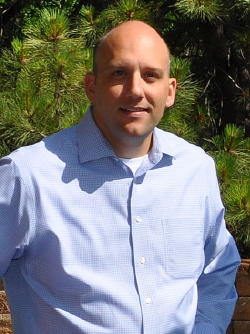 Our speaker this month is Jason Slowinski, City of Golden’s new City Manager. Slowinski will share stories and tales from his career as a city manager and provide an inside look into some of the more unusual and difficult circumstances and decisions presented to a city manager. Slowinski also will discuss the history of the city manager form of government, how a typical day in the life of a city manager looks, and reasons for pursuing the profession.
Our speaker this month is Jason Slowinski, City of Golden’s new City Manager. Slowinski will share stories and tales from his career as a city manager and provide an inside look into some of the more unusual and difficult circumstances and decisions presented to a city manager. Slowinski also will discuss the history of the city manager form of government, how a typical day in the life of a city manager looks, and reasons for pursuing the profession.
Slowinski was appointed as City Manager in September 2015, and he is the 9th person to hold the position in the history of City of Golden. Slowinski lives in Golden with his wife, Stephanie, and two school-aged daughters.
Immediately prior to joining the City of Golden, Slowinski served as Village Manager for Lake Zurich, Illinois and Assistant/Acting City Manager for Des Plaines, Illinois.
Slowinski is recognized as a Credentialed Manager by the International City and County Management Association. He earned a Bachelor’s degree in Business Administration from the University of Wisconsin-Milwaukee and a law degree from The John Marshall School of Law in Chicago. He also has completed graduate studies in public administration at Northern Illinois University.
November 10, 2015
Speaker – Andrew Novick
Topic – The Atomic Clock: What Time it is—And Why
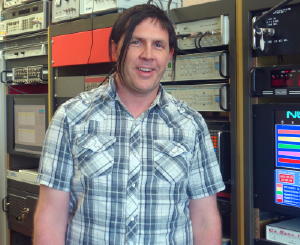 Andrew Novick is an electrical engineer and expert on the atomic clock administered by the National Institutes of Standards and Technology (NIST). Novick discussed atomic clocks and how they work, along with addressing fascinating questions including: How do we get time from atoms? And why do we need such accurate time?
Andrew Novick is an electrical engineer and expert on the atomic clock administered by the National Institutes of Standards and Technology (NIST). Novick discussed atomic clocks and how they work, along with addressing fascinating questions including: How do we get time from atoms? And why do we need such accurate time?
By the time you finish listening, you will know exactly what time it is—and why!
Novick has worked in the Time and Frequency Services group at NIST since he was a freshman at the University of Colorado Boulder in the late 1980s. As a time meteorologist, Novick measures time and compares atomic clocks. He also is responsible for disseminating time—getting time “out there” to industry and the general population.
Novick also creates food events and demonstrations, “performs” PowerPower presentations, and promotes other events in the Denver metro area.
NIST is a federal standards organization, contributing to the definition is the Standard International (SI) units, such as length, mass, temperature, electric current and more.
October 13, 2015
Speaker – Mark Overly
Topic – A Coffee Journey to Sumatra
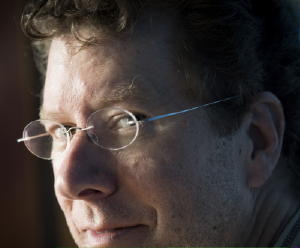 Join Mark Overly, coffee buyer for Kaladi Coffee Roasters, on a journey to Northern Sumatra in Indonesia on a quest to discover the best tasting coffee. You will discover the hidden world of coffee production and preparation and some of the challenges associated with securing the best possible beans.
Join Mark Overly, coffee buyer for Kaladi Coffee Roasters, on a journey to Northern Sumatra in Indonesia on a quest to discover the best tasting coffee. You will discover the hidden world of coffee production and preparation and some of the challenges associated with securing the best possible beans.
Kaladi is an independent roaster of premium estate, shade grown, organic and Fair Trade Certified coffee.
Overly has more than 25 years’ experience as a coffee buyer, beginning in Anchorage, Alaska where he grew a small roasting enterprise into the largest in the state. Mr. Overly was awarded the State of Alaska Small Business Person of the Year in 1993 by the Small Business Administration. He has been featured in numerous national publications including Nation’s Business and Entrepreneur Magazine.
Overly was one of the first roasters in America to be Fair Trade Certified by Transfair USA. His coffee has been awarded “Best Coffee” and “Best Espresso” by Rocky Mountain News and 5280 Magazine on multiple occasions. He has traveled extensively around the world assessing coffee producers for quality management and sustainability, and has lectured internationally on coffee quality. Overly’s current Colorado venture, Kaladi Coffee Roasters, is an independent roaster of premium estate, shade grown, organic and Fair Trade Certified coffee.
September 8, 2015
Speaker – Melanie Fischer – Colorado River Recovery Program
Topic – An Overview of the Upper Colorado River Endangered Fish Recovery Program
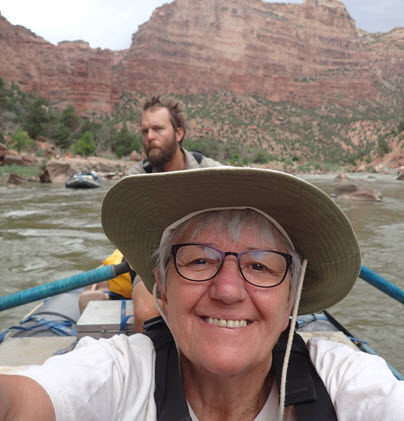 In 1988, the Upper Colorado River Endangered Fish Recovery Program was established to help bring four species of endangered fish back from the brink of extinction: the humpback chub, bonytail, Colorado pikeminnow, and razorback sucker.
In 1988, the Upper Colorado River Endangered Fish Recovery Program was established to help bring four species of endangered fish back from the brink of extinction: the humpback chub, bonytail, Colorado pikeminnow, and razorback sucker.
The Upper Colorado River Basin is home to 14 native fish species, including the endangered humpback chub, bonytail, Colorado pikeminnow, and razorback sucker. These endangered fish are found only in the Colorado River system.
The Recovery Program is a unique partnership of local, state, and federal agencies, water and power interests, and environmental groups working to recover endangered fish in the Upper Colorado River Basin while water development proceeds in accordance with federal and state laws and interstate compacts.
This major undertaking involves restoring and managing stream flows and habitat, boosting wild populations with hatchery-raised endangered fish, and reducing negative interactions with certain nonnative fish species. The goal of recovery is to achieve natural, self-sustaining populations of the endangered fish so they no longer require protection under the federal Endangered Species Act.
The Recovery Program was initiated in 1988 with the signing of a cooperative agreement by the Governors of Colorado, Utah, and Wyoming; the Secretary of the Interior; and the Administrator of Western Area Power Administration. In 2001, these parties agreed to extend the cooperative agreement through September 30, 2013. The Recovery Program provides Endangered Species Act compliance for continued operation of federal water and power projects in accordance with project purposes.
With its demonstrated successes, the Upper Colorado River Endangered Fish Recovery Program has become a national model for its collaborative conservation efforts to protect endangered species.
Speaker – Former Golden Mayor Jacob Smith
Topic – Mr. Smith Goes to Washington: Reflections on Two Years in “the District”
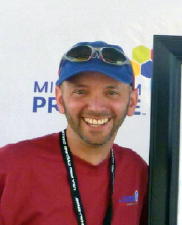 After completing his tenure as Golden’s mayor, Jacob headed to Washington, D.C. for a stint in the U.S. Senate as Senator Bernie Sanders’ energy and climate policy adviser. Jacob is back home in Golden after his two-year adventure, and shared some reflections on just how closely House of Cards and Veep resemble what life is actually like on Capitol Hill, what it was like working for a senator—who is now a presidential candidate–and the politics of energy and climate change.
After completing his tenure as Golden’s mayor, Jacob headed to Washington, D.C. for a stint in the U.S. Senate as Senator Bernie Sanders’ energy and climate policy adviser. Jacob is back home in Golden after his two-year adventure, and shared some reflections on just how closely House of Cards and Veep resemble what life is actually like on Capitol Hill, what it was like working for a senator—who is now a presidential candidate–and the politics of energy and climate change.
Speaker – Dr. Catherine Lozupone, University of Colorado at Denver Professor in Medicine and Microbiology
Topic – How the trillions of bacteria that inhabit your gut influence your health
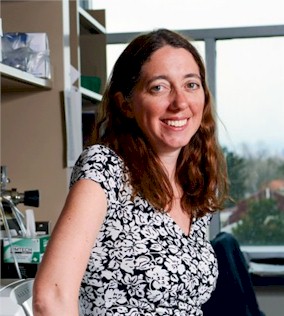 Your gut contains a complex community of bacteria, fungi, and viruses (collectively called the ‘microbiome’), which emerging research has shown can influence a wide array of aspects of your health—ranging from whether you are obese, to whether you have have heart disease, or are depressed.
Your gut contains a complex community of bacteria, fungi, and viruses (collectively called the ‘microbiome’), which emerging research has shown can influence a wide array of aspects of your health—ranging from whether you are obese, to whether you have have heart disease, or are depressed.
Dr. Lozupone’s research lab in the Department of Medicine at the University of Colorado Anschutz Medical Campus works with clinicians to study the gut microbiome in the context of a variety of diseases, including with HIV infection, Autism Spectrum Disorders, asthma, and in cancer patients undergoing stem cell transplant. She discussed this research and also more generally, what has been learned over the past several years about the typical composition of the gut microbiome and how it is influenced by factors such as age and diet.
Dr. Lozupone also discussed the mechanisms by which the microbiome has the potential to influence health, ranging from its role in metabolically transforming otherwise indigestible components of our diet, to influencing our immune system. Finally, although it is still “early days” in taking microbiome research “from bench to bedside,” she discussed various approaches that researchers are exploring for targeting the gut microbiome therapeutically, ranging from fecal transplants to probiotics.
For more information:
Lozupone Lab, University of Colorado School of Medicine
June 9, 2015
Speaker – John Knight, International Organizer World Fly Fishing Champions
Topic – World Youth Fly Fishing Championships Come to Colorado
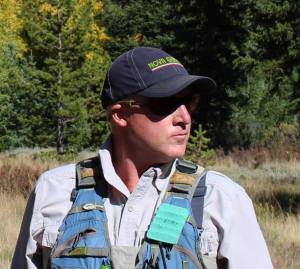 John Knight will share stories and provide insights into the world of competitive fly fishing, as he and his nonprofit organization prepare to host the 14th FIPS Mouche World Youth Fly Fishing Championship in Colorado this summer.
John Knight will share stories and provide insights into the world of competitive fly fishing, as he and his nonprofit organization prepare to host the 14th FIPS Mouche World Youth Fly Fishing Championship in Colorado this summer.
With the mission of showcasing Colorado’s watershed rivers and lakes, youth from around the world will enjoy our state’s natural beauty and hospitality whilst competing in the waters of the Eagle River, Colorado River, Sylvan Lake and Dillon Reservoir.
In addition to guiding professionally and producing seven international fly fishing tournaments since 2008, Knight works with Project Healing Waters to provide an annual fly fishing experience for American soldiers. Knight has competed in four United States National Fly Fishing Championships, five Teva Games, and serves as secretary of the Eagle Valley Trout Unlimited chapter.
For more information:
www.wyffc2015.com
www.theamericacup.org
May 12, 2015
Speaker – Dr. Jeffrey Lockwood
University of Wyoming
Topic – Legend of the Lost Locust
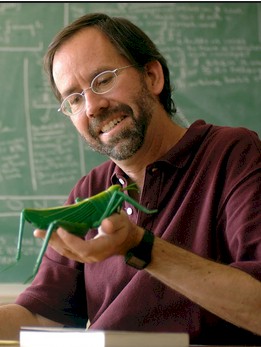 Dr. Lockwood will discuss the topic of his 2009 book, Locust: The Devastating Rise and Mysterious Disappearance of the Insect that Shaped the American Frontier. The infamous Rocky Mountain locust was the most abundant terrestrial creature on earth in the 19th century, but the last living specimen was caught in 1903. The extinction of this species was one of the great, ecological mysteries in the decades that followed—and now that we know its fate, there are profound lessons for our own future.
Dr. Lockwood will discuss the topic of his 2009 book, Locust: The Devastating Rise and Mysterious Disappearance of the Insect that Shaped the American Frontier. The infamous Rocky Mountain locust was the most abundant terrestrial creature on earth in the 19th century, but the last living specimen was caught in 1903. The extinction of this species was one of the great, ecological mysteries in the decades that followed—and now that we know its fate, there are profound lessons for our own future.
Jeff Lockwood was hired as an insect ecologist at the University of Wyoming in 1986. But over the course of 20 years he metamorphosed into a Professor of Natural Sciences & Humanities. His position is split between the department of philosophy and the MFA program in creative writing—along with an appointment in the Program in Ecology. He teaches courses in environmental ethics and the philosophy of ecology, along with writing workshops in nature and environmental writing. His essays have been honored with a Pushcart Prize, a John Burroughs Award, and inclusion in Best American Science & Nature Writing. His most recent books are Six-Legged Soldiers: Using Insects as Weapons of War and The Infested Mind: Why Humans Fear, Loathe and Love Insects.
April 14, 2015
Speakers – Charlie Sturdavant of Golden City Brewery and Lhakpa Sherpa of Golden’s Sherpa House Restaurant
Talk – Golden City Brewery Goes to Nepal
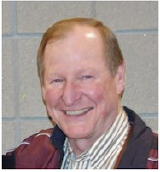 Our guests and several partners have spent the last 20 months building a brewery that will not only bring craft beer to Nepal, but will also provide well-paying jobs.
Our guests and several partners have spent the last 20 months building a brewery that will not only bring craft beer to Nepal, but will also provide well-paying jobs.
The country of Nepal is beautiful and attracts visitors to the Himalayas to both climb and trek. It also is a study in contrasts, as a Third World country striving to modernize despite low per-capita income.
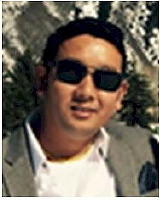 This special endeavor involved land purchase, landscaping, and construction of buildings, as well as purchasing and installing brewing equipment. Several unanticipated problems have arisen along the way, along with many joyful experiences with the local community.
This special endeavor involved land purchase, landscaping, and construction of buildings, as well as purchasing and installing brewing equipment. Several unanticipated problems have arisen along the way, along with many joyful experiences with the local community.
March 10, 2015
Speaker – Quint Redmond
Talk – Agriburbia: Growing Sustainable Communities by the Bushel
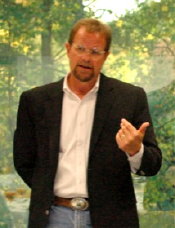 In today’s climate of soaring gas prices, international conflicts, and concerns about food availability and quality, there are highly profitable opportunities emerging in sustainable land development. Quint Redmond’s firm, Agriburbia®, incorporates sustainable practices such as alternative energy, natural storm water management, and pedestrian focus and adds a new element that is the re-integration of food production directly within the living environment.
In today’s climate of soaring gas prices, international conflicts, and concerns about food availability and quality, there are highly profitable opportunities emerging in sustainable land development. Quint Redmond’s firm, Agriburbia®, incorporates sustainable practices such as alternative energy, natural storm water management, and pedestrian focus and adds a new element that is the re-integration of food production directly within the living environment.
This “truly” sustainable initiative improves the quality of life by combining the best qualities of rural living with the advantages of urban conveniences and culture. The result is improved agriculture, enhanced development practices and the enrichment of the residents, tenants, and guests within these Agriburbia® mixed-use developments.
Mr. Redmond is co-owner of AgriNETx LLC and Agriburbia LLC. and has more that 20 years of professional experience in design, planning, natural resources, agriculture and spatial technologies. His combined knowledge in each of these disciplines allows him to effectively manage projects that result in innovative designs, technologically adv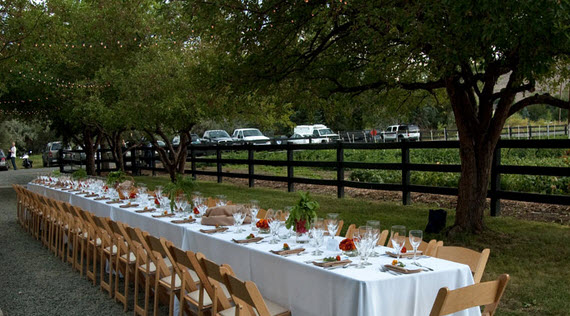 anced data management, and new approaches to sustainabledevelopment. Mr. Redmond has a strong multi-faceted agricultural background which plays heavily in his innovative ideas for incorporating agriculture back into our modern communities. He and his wife are the Co-Creators of Agriburbia®.
anced data management, and new approaches to sustainabledevelopment. Mr. Redmond has a strong multi-faceted agricultural background which plays heavily in his innovative ideas for incorporating agriculture back into our modern communities. He and his wife are the Co-Creators of Agriburbia®.
February 10, 2015
Speaker – Bill Philpott
Talk – Interstate 70: The History of the Highway We Love to Hate
Dinner – Pulled Pork Sandwiches with Beans
Brewery – Cannonball Creek
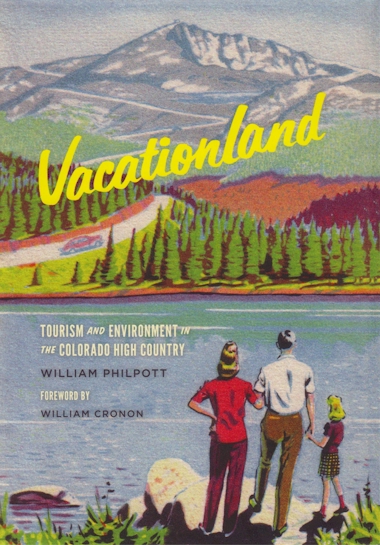 It’s hard to love Interstate 70, a highway that mostly makes the news for snow closures, construction delays, and endless debates over how to ease the horrendous traffic jams. But if we follow I-70 back in time, it leads us straight into one of Colorado history’s most dramatic episodes: the explosion of post-World War II recreational development, when faded mining towns and quiet ranching valleys morphed into the motel clusters and ski resorts of a new mass outdoor leisure age.
It’s hard to love Interstate 70, a highway that mostly makes the news for snow closures, construction delays, and endless debates over how to ease the horrendous traffic jams. But if we follow I-70 back in time, it leads us straight into one of Colorado history’s most dramatic episodes: the explosion of post-World War II recreational development, when faded mining towns and quiet ranching valleys morphed into the motel clusters and ski resorts of a new mass outdoor leisure age.
In this Golden Beer Talk, University of Denver historian Bill Philpott will tell the surprising history of I-70: how the high country ended up with a superhighway it was never supposed to get, why the interstate ended up taking the twists and turns it did, and what those tell us about the changing economic and environmental politics of their time — with implications for our own time. At the very least, this talk will give you something to think about the next time you’re stuck in Eisenhower Tunnel traffic behind some SUV from Texas.
Bill Philpott, who grew up in the Denver suburbs, teaches history at the University of Denver. He is the author of Vacationland: Tourism and Environment in the Colorado High Country, which won the 2014 Spur Award for Contemporary Western Nonfiction from the Western Writers of America.
Speaker – Jonathon Stalls
Talk – The Endless Benefits of Life at 3 MPH – Walking Across America
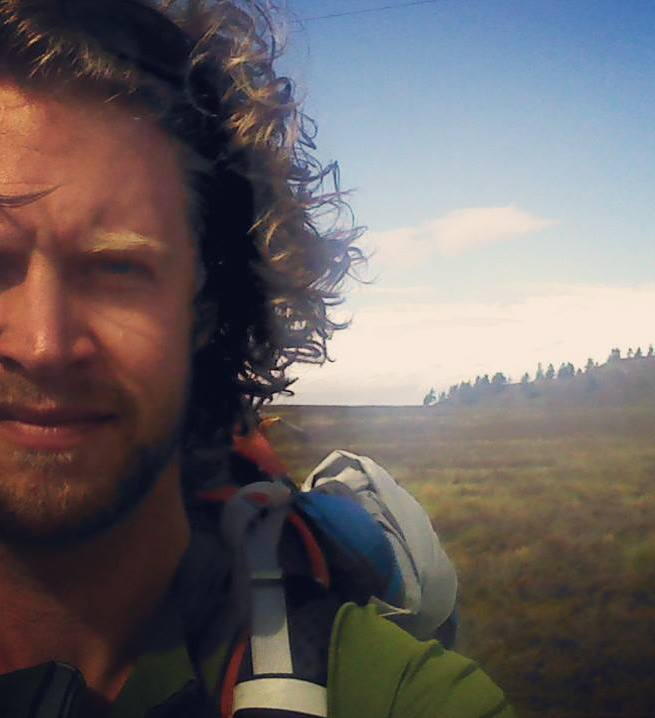 Jonathon Stalls started walking West from the Atlantic Ocean in Delaware on 1 March 2010. After walking 3,030 miles across the USA, he has much to say about trusting strangers, embracing the unknown, living with less, and what can be gained by doing more life by foot. This popular TEDx Youth@Mile High presenter will share stories and tales from his journey while also inviting you into the birth of and goals for his 2-year-old, Colorado-based social business, Walk2Connect.
Jonathon Stalls started walking West from the Atlantic Ocean in Delaware on 1 March 2010. After walking 3,030 miles across the USA, he has much to say about trusting strangers, embracing the unknown, living with less, and what can be gained by doing more life by foot. This popular TEDx Youth@Mile High presenter will share stories and tales from his journey while also inviting you into the birth of and goals for his 2-year-old, Colorado-based social business, Walk2Connect.
To learn more, watch Jonathon’s TEDx video
————————————————————————
Speaker – Jim Clawson, Systems Engineer
Talk – Orion EFT1: The First Flight of America’s Newest Spaceship
Brewery – Barrels & Bottles
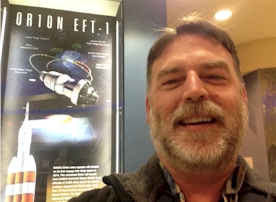 A mere five days after its test launch, a systems engineer working on NASA’s Orion Multipurpose Crew Exploration Vehicle will share his experiences working on the project, and participating in the launch. Working with Stellar Solutions at Lockheed Martin, Jim Clawson is part of the Orion mission’s Integrated Vehicle Performance Team, focused on sequencing automated functions and assessing anticipated thermal, power and communications functionality.
A mere five days after its test launch, a systems engineer working on NASA’s Orion Multipurpose Crew Exploration Vehicle will share his experiences working on the project, and participating in the launch. Working with Stellar Solutions at Lockheed Martin, Jim Clawson is part of the Orion mission’s Integrated Vehicle Performance Team, focused on sequencing automated functions and assessing anticipated thermal, power and communications functionality.
The December flight test from the Cape Canaveral Air Force Station will send the unscrewed Orion spacecraft 3,600 miles from Earth on a two-orbit flight to test critical systems for a series of future deep space missions. During the 4.5-hour flight, Orion will travel farther than any crewed spacecraft has gone in more than 40 years, before reentering Earth’s atmosphere at speeds near 20,000 mph and generating temperatures up to 4,000 Fahrenheit. This initial test flight will evaluate launch and high-speed reentry systems, such as avionics, altitude control, parachutes and heat shield.
———————————
November 11, 2014
Speaker – Dr. Mark Eberhart
Talk – Science, Energy and the National Strategic Narrative
Dinner – Beef Curry or Vegetable Curry
Brewery – Cannonball Creek
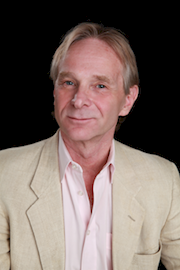 Every generation of Americans has faced grand challenges and responded with a new world vision and a transformed society. Many, if not all, of these past struggles were sustained and facilitated by the persuasive power of strategic narrative—stories grounded in the past, containing a faithful vision of the future along with actions in the present to link the past and the future. For example, our Cold War strategy was sustained by a narrative stating that Soviet aggression, derived from historic Russian xenophobia, was to be contained until such time as the Soviet Union failed due to its internal defects.
Every generation of Americans has faced grand challenges and responded with a new world vision and a transformed society. Many, if not all, of these past struggles were sustained and facilitated by the persuasive power of strategic narrative—stories grounded in the past, containing a faithful vision of the future along with actions in the present to link the past and the future. For example, our Cold War strategy was sustained by a narrative stating that Soviet aggression, derived from historic Russian xenophobia, was to be contained until such time as the Soviet Union failed due to its internal defects.
The great challenge facing today’s world is changing the way we use our energy resources—and in the case of energy transformation, a cohesive narrative has yet to fully emerge. But when it does, we can be sure that science and technology will figure more prominently than in past narratives. Precisely because well-structured narratives can be so persuasive by appealing to the visceral, scientists have distanced themselves from communicating in narrative form—a strength in the pursuit of truth, but a weakness when it comes to motivating change.
This talk will review the changing character of science and technology in the emerging energy narratives and argue that aided by scientists, the public image of technology has been distorted. Countering these distortions with positive images will require scientists to embrace their own history, present and future from a new perspective.
Dr. Eberhart is Professor of Chemistry and Geochemistry at Colorado School of Mines. He holds degrees from Massachusetts Institute of Technology and University of Colorado.
———————————
October 14, 2014
Speaker – Dr. James White
Talk – Climate Change and You – What everyone should know
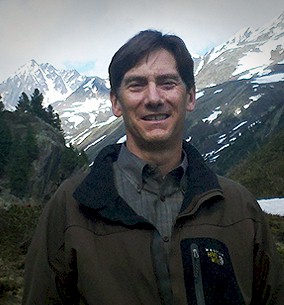 Humans are the major agent of change on the planet today, dominating a number of the key functions of our planet, including the climate system. How we deal with that power, and in particular, how we take responsibility for our actions, is a key question for the coming years to decades, as we transition from an unsustainable path to a sustainable one. This talk will lay out the case for human impacts on the planet, especially the climate system, and then explore consequences and solutions.
Humans are the major agent of change on the planet today, dominating a number of the key functions of our planet, including the climate system. How we deal with that power, and in particular, how we take responsibility for our actions, is a key question for the coming years to decades, as we transition from an unsustainable path to a sustainable one. This talk will lay out the case for human impacts on the planet, especially the climate system, and then explore consequences and solutions.
Dr. James White is a noted climate scientist working on abrupt climate change, sea ice and sea-level changes, and carbon cycles. His research interests are broad but revolve around the use of environmental stable isotope ratios that tell us about paleoclimate, biogeochemistry, and global change. He has been involved in reconstructing both the longest and the most high-resolution climate records obtained from ice cores.
His work has been instrumental in showing that large climate changes tend to occur as abrupt shifts in mode, probably driven by internal adjustments in the Earth climate system (rather than gradual adjustments to changing external conditions like energy received from the sun). Shifts of more than 10˚C in mean temperature in less than a human lifetime are common in the paleoclimate record, and serve as a warning that adaptation to future climate changes may not be easy.
Dr. White is a popular teacher as well as researcher, and regularly conducts courses and innovative programs that address human interactions with the environment.
Dr. White is Director and Fellow of the Institute of Arctic and Alpine Research, Professor of Geological Sciences, and a Professor in the Environmental Studies Program at the University of Colorado Boulder. According to Web of Science, he is one of the top 1% most highly cited authors in his field. He received his PhD from Columbia University in 1983.
———————————————————————-
September 9, 2014
Speaker – Dr. Dendy Sloan and Dr. Cynthia Norrgran
Talk – Three Minds and Memory
Beer – Mountain Toad Brewing
Dinner – Pulled BBQ Pork Sandwiches, Corn on the Cob with Herbed Butter, Homemade Cole Slaw
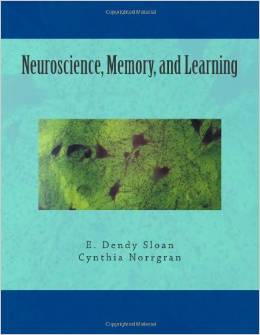 We hope that you will be able to join us for the next Golden Beer Talks gathering on Tuesday, 9 September, at Windy Saddle Cafe!
We hope that you will be able to join us for the next Golden Beer Talks gathering on Tuesday, 9 September, at Windy Saddle Cafe!
Our speakers are Dr. Dendy Sloan and Dr. Cynthia Norrgran, coauthors of Neuroscience, Memory, and Learning, and their much-anticipated joint presentation is entitled Three Minds and Memory.
Drs. Sloan and Norrgran will briefly discuss functions of the three brain portions each of us have: reptilian, Paleomammilian (animal), and neocortical (human). Connecting those three parts to simple memory types (short-term, working, and long-term) will be done next. The talk will conclude with a working example and a list for those who wish to read further.
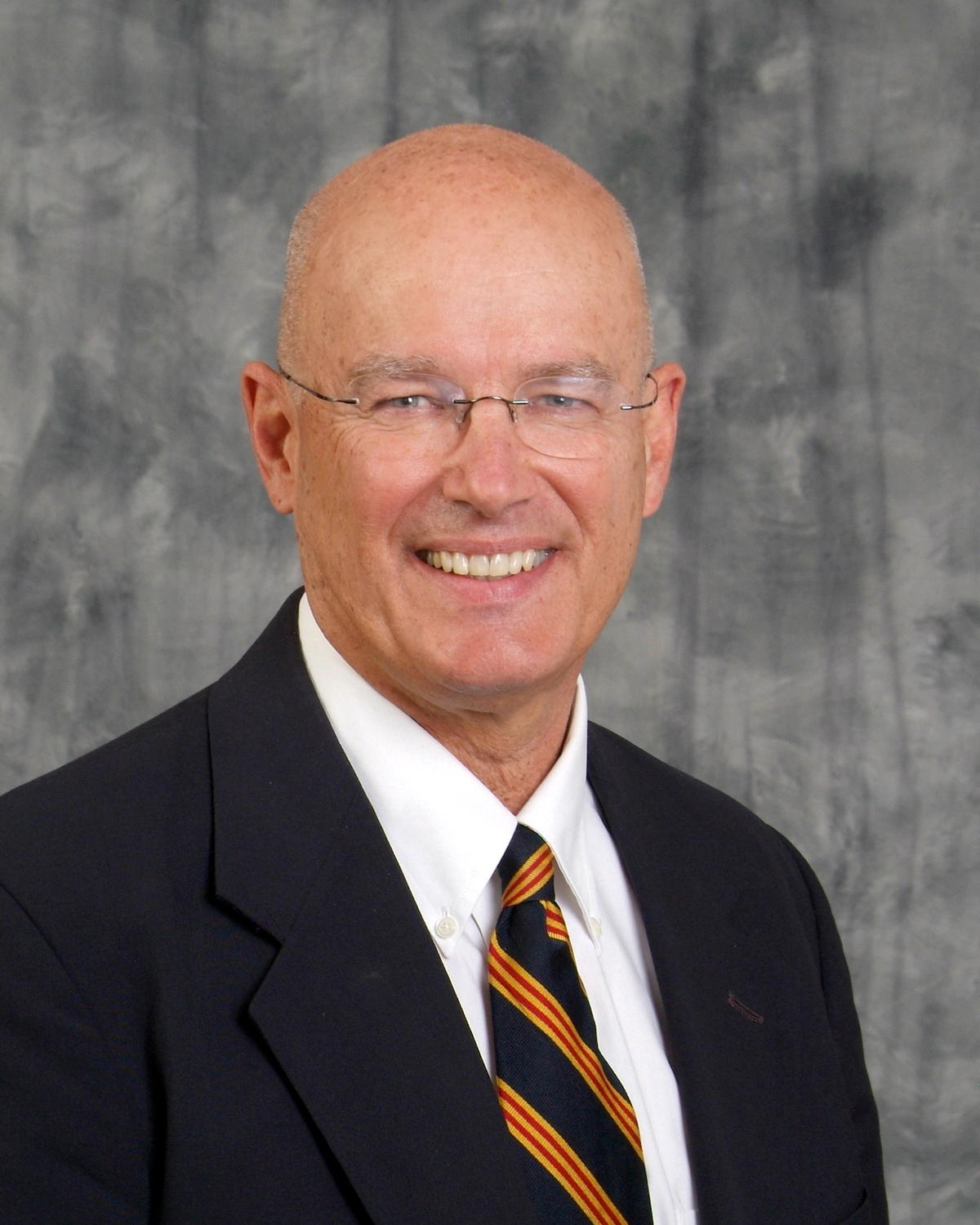 Dr. Norrgran is Teaching Associate Professor and Dr. Sloan is University Professor Emeritus in the Chemical and Biological Engineering Department at the Colorado School of Mines. Dr. Norrgran is a retired neurosurgeon with 15 years of practice, and Dr. Sloan has a half-century of engineering teaching and practice. Their monograph Neuroscience, Memory, and Learning was published in 2013.
Dr. Norrgran is Teaching Associate Professor and Dr. Sloan is University Professor Emeritus in the Chemical and Biological Engineering Department at the Colorado School of Mines. Dr. Norrgran is a retired neurosurgeon with 15 years of practice, and Dr. Sloan has a half-century of engineering teaching and practice. Their monograph Neuroscience, Memory, and Learning was published in 2013.
———————————————————————-
August 12, 2014
Speaker – Dr. Jeff Squier, Department Head of Physics at Colorado School of Mines
Talk – Laser Pulses: Focusing Light in Time & Space
Brewery – A C Golden
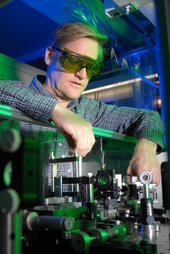 Ultrashort laser pulses, only a few 100 millionths of a billionth of a second can now be routinely created, and are finding their way into real world applications. For example, these ultrashort bursts of light are enabling new forms of microscopy that allow scientists to visualize biological structure and function in three dimensions. A particularly exciting application is using these bursts of light to perform delicate surgeries. State-of-the-art eye correction now employs such lasers for example.
Ultrashort laser pulses, only a few 100 millionths of a billionth of a second can now be routinely created, and are finding their way into real world applications. For example, these ultrashort bursts of light are enabling new forms of microscopy that allow scientists to visualize biological structure and function in three dimensions. A particularly exciting application is using these bursts of light to perform delicate surgeries. State-of-the-art eye correction now employs such lasers for example.
At the Colorado School of Mines we have developed a novel lensing system that allows us to focus these bursts of light inspace and time! The ability to create such lensing systems has resulted in a profoundly different manner in which we can optically manipulate materials. Short movie clips demonstrating the perplexing behavior of ultrashort laser pulses that are simultaneously focused in space and time will be presented.
Dr. Squier is the Department Head of Physics at Colorado School of Mines. He also is a CSM alum, with a Bachelors degree in Engineering Physics and a Masters in Applied Physics. Squier has a PhD in Optics, awarded by University of Rochester. His research interests include Do-It-Yourself (DIY) electronics—he has his own UAV fleet—as well as 3D multiphoton microscopy for biological and material science applications, and micromachining with intense femtosecond laser pulses.
———————————————————————-
July 8, 2014
Speaker – BECKY BRICE
Talk – Tree Rings and the Future of the Colorado River
As a lifeline for the southwestern United States, the Colorado River provides water for municipalities, agriculture, hydropower and recreation, as well as fish and wildlife species. Tree ring research provides valuable clues about pre-historic streamflow in the Colorado River, and suggests that it will be dramatically different in the future than the body of water with which we are familiar today. Among other fascinating insights, tree ring reconstructions raise questions about the sustainability of the Colorado River Compact set into stone in 1922.
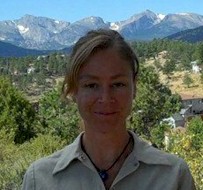 Becky Brice is a PhD student at the University of Arizona and researcher for the Climate Assessment for the Southwest (CLIMAS) and the Laboratory of Tree Ring Research in Tucson, Arizona. Her work is devoted to discovering what trees’ archives can tell us about atmospheric circulation, streamflow extremes and climate. Her current work uses tree rings as a proxy of snowpack, soil moisture and air temperature.
Becky Brice is a PhD student at the University of Arizona and researcher for the Climate Assessment for the Southwest (CLIMAS) and the Laboratory of Tree Ring Research in Tucson, Arizona. Her work is devoted to discovering what trees’ archives can tell us about atmospheric circulation, streamflow extremes and climate. Her current work uses tree rings as a proxy of snowpack, soil moisture and air temperature.
—————————————————————–
June 10, 2014
Speaker – JASON HANSON
Talk – A Ditch in Time: The City, The West, and Water
 In 1860, in a rare moment of honesty prevailing over boosterism, Denver’s Rocky Mountain News admitted that the young city of Denver was a sepia-toned settlement still embarrassingly “treeless, grassless, [and] bushless.” Today, the runoff from the Rocky Mountains helps to keep Denver and its metro area both verdant and vibrant (and, not coincidentally, awash in good beer). Jason Hanson, coauthor with Patty Limerick of A Ditch in Time: The City, The West, and Water, will discuss how Denver was transformed through the creation of its water supply system.
In 1860, in a rare moment of honesty prevailing over boosterism, Denver’s Rocky Mountain News admitted that the young city of Denver was a sepia-toned settlement still embarrassingly “treeless, grassless, [and] bushless.” Today, the runoff from the Rocky Mountains helps to keep Denver and its metro area both verdant and vibrant (and, not coincidentally, awash in good beer). Jason Hanson, coauthor with Patty Limerick of A Ditch in Time: The City, The West, and Water, will discuss how Denver was transformed through the creation of its water supply system.
Jason Hanson is a member of the research faculty at the Center of the American West at CU-Boulder. In addition to his work on water, he focuses on issues surrounding energy development and land use, Colorado history, and beer. He is currently guest editing a special issue of Journal of the West devoted to the history of beer in the region, due out next spring.
—————————————————————–
Speaker – KEITH ROUNDS
Talk – Cowboy Poetry
Brewery – Golden City Brewery
Listen to Keith’s poetry from Golden Beer Talks
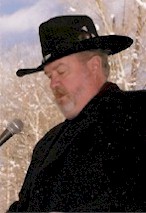 With a deep and abiding love for Cowboy culture, Keith Rounds got his start with Cowboy Poetry when he penned his first effort as a wedding anniversary gift to his lovely wife about 25 years ago. He is the author of The Ride: A Collection of Cowboy Poems.
With a deep and abiding love for Cowboy culture, Keith Rounds got his start with Cowboy Poetry when he penned his first effort as a wedding anniversary gift to his lovely wife about 25 years ago. He is the author of The Ride: A Collection of Cowboy Poems.
Rounds is a Wyoming native whose work relies on experiences involving family ranches in his native rural southwest Wyoming, as well as important life passages. His roots on the range extend back to the 1840s, when his great grandparents settled in the Bridger Valley. In fact, his great grandfather was a Pony Express rider and is the subject of an epic poem composed by this exceptionally entertaining poet.
Now retired, Rounds currently works part time as the jovial, well-loved Doorman for the Wyoming House of Representatives.
—————————————————————–
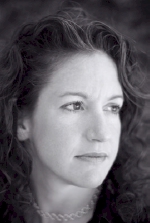 Speaker – MIA SULLIVAN, BEE KEEPER
Speaker – MIA SULLIVAN, BEE KEEPER
Talk – Keeping Bees and Making Honey
Dinner – Meat Marinara over pasta and honey wheat garlic bread
Brewery – Mountain Toad Brewing Company
Listen to Mia talk about bees and beekeeping
This month’s talk featured Bee Keeper Mia Sullivan, who provided an overview of honey, the keeping of bees and why these topics are so important on both a small and larger scale.
Honey: “The dew distilled from the stars and the rainbow.” — Aristotle
—————————————————————–
Speaker – MIKE BESTOR, CITY MANAGER OF GOLDEN
Talk – State of the City
Brewery – Golden City Brewery
Dinner: Gumbo
Mike Bestor has been Golden’s City Manager since 1993. Mike is directly responsible for all the City’s facilities, services, and the overall operation of the entire City.
Once a year (in March), Mike delivers a “State of the City” address to the Golden Chamber of Commerce. His speech is always interesting, insightful, and amazingly funny. We thought it was worth sharing with non-Chamber members, so Mike graciously agreed to give our March Golden Beer Talk.
—————————————————————–
Speaker – DR. JOHN SPEAR
Talk – Rocks, Rust, and Fish: Why Microbes Matter
Brewery – Barrels and Bottles
Beer – Uncle Judd’s Oatmeal Stout! & Einhorn ist Finkle IPA
Dinner: Chicken Spinach Dahl and Vegetarian Dahl
John Spear, an Associate Professor in the Department of Civil and Environmental Engineering up the hill at the Colorado School of Mines. John got his B.A. in Physiology & Biochemistry at U.C. San Diego and his M.S. and Ph.D. from the Colorado School of Mines. John is an environmental microbiologist, looking for the kinds of microbes in any number of environments from a hot spring in Yellowstone to what is inside the average beer.
The invisible microbial world surrounds us and is part of us with a diversity of life that dwarfs the visible, macrobial world. With both traditional cultivation approaches and recent molecular approaches of DNA and RNA sequencing, work in the microbial world is beginning to reveal the secrets of life and its evolution. With an examination of the kinds of microbes that are in rocks, the kinds of microbes that cause corrosion of steel and the kinds of microbes that are critical for water treatment, new possibilities become apparent for biotechnology—how to work with mine tailings, how to work with rust, how to make a better protein and how to make a better beer!
—————————————————————–
DR. JIM DALE
The Three D’s of Public Health in our Community
As the recently retired Director of Environmental Health for Jefferson County Public Health Department, Dr. Dale possesses deep insight on the health of Golden and its surrounding communities. His educational—and no doubt gregarious—talk will broaden our understanding of illness and disability in our region.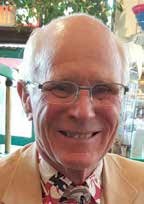
Among other distinguished accomplishments, Jim holds a Doctorate in Veterinary Medicine (DVM), Masters in Public Health (MPH) and Masters in Business Administration (MBA).
Jim also is a retired, veteran 30-year Air Force Colonel. His final assignment was as Chief of Prevention Operations in the Office of the Air Force Surgeon General at Headquarters Air Force.
In addition to his active participation with Golden’s Planning Commission, Dr. Dale serves on the Board of Directors of the Colorado Public Health Association (CPHA). He also has earned distinguished service awards from the CPHA, Colorado Environmental Health Association, Colorado Professionals in Onsite Wastewater, Leadership Jefferson County and the American Public Health Association.
===============================================
Speaker – Adam Pender
Brewery – Cannonball Creek Brewing Company
Adam Pender, a Propulsion Engineer at Lockheed Martin Space Systems Company in Littleton, Colorado spoke on ‘Why Go To Space?’. Adam earned Bachelor’s and Master’s degrees in Aerospace Engineering from Purdue University, and is currently working on an Engineering PhD through the University of Denver. Over his career, he has worked on numerous NASA spacecraft propulsion systems, including Mars Science Laboratory, Phoenix, Juno, MAVEN, InSight, and OSIRIS-REx, in addition to several other government and non-government spacecraft.
Adam led a great talk, on “Why go to space?”. This discussion included a short summary of the various benefits that our space program has yielded thus far, including the various technological advancements enabled by the space program, and put to use in our everyday lives. Additionally, various science discoveries that our space exploration efforts have yielded. Following the short presentation, a Q&A session was held, where participants had the opportunity to ask questions as diverse as is anyone working on warp drive, to is NASA studying climate change.
=================================
Speaker – Finn Knudsen
Brewery – Mountain Toad Brewery
Topic – Beer and Health!
Originally from Denmark, Finn has more than 40 years of experience in the brewing industry and has held research and management positions with Tuborg, Rainier, Molsen, Coors, and others. He now does international consulting in the brewing industry.
Finn discussed research indicating that beer may aid in the prevention of osteoporosis, heart disease, breast, uterine, and prostate cancer, stroke, high blood pressure, Alzheimer’s disease, ulcers, and kidney stones. It is a good source of many key nutrients, antioxidants, fiber, niacin, riboflavin, pyrodoxine, folate, panthothen acid, biotin, and silicon.
=================================
Speaker – Adrian Miller
Topic – Soul Food
Brewery – Golden City Brewery
Listen to this talk!
We plan to make history on Tuesday, October 8th, 2013 with the very first GOLDEN BEER TALK!
Our speaker will be Adrian E. Miller, author of Soul Food: The Surprising Story of an American Cuisine, One Plate at a Time. You may have heard this guest in one of several radio interviews, the most recent being Colorado Matters on Colorado Public Radio.
Adrian describes himself as, “…a recovering lawyer and politico turned culinary historian, and I’m doing what I can to celebrate soul food history. Soul food, the traditional food of African Americans, deserves its rightful place as one of America’s greatest cuisines.”
 Copies of Adrian’s book will be available for sale, and we’re guessing that he would be happy to autograph them!
Copies of Adrian’s book will be available for sale, and we’re guessing that he would be happy to autograph them!
Our featured brewery will be Golden City Brewery. Some of their beers will be available for purchase that evening.
NOTE THIS CHANGE:
Windy Saddle Cafe suffered a broken water pipe and a lot of damage, so we have re-located this event to Harmony Village, at 1001 Cottonwood Circle. Windy Saddle will still be cooking soul food for us, and serving it at our alternate location!
Adrian Miller’s Website: www.soulfoodscholar.com
Adrian’s Twitter Handle: @soulfoodscholar.
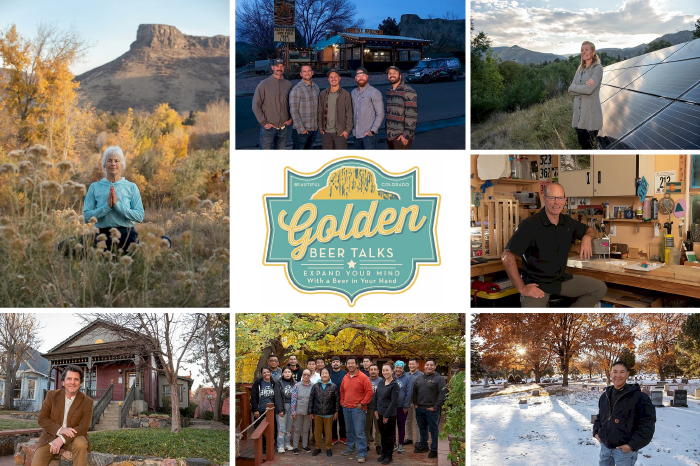




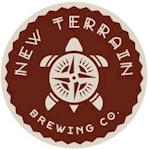
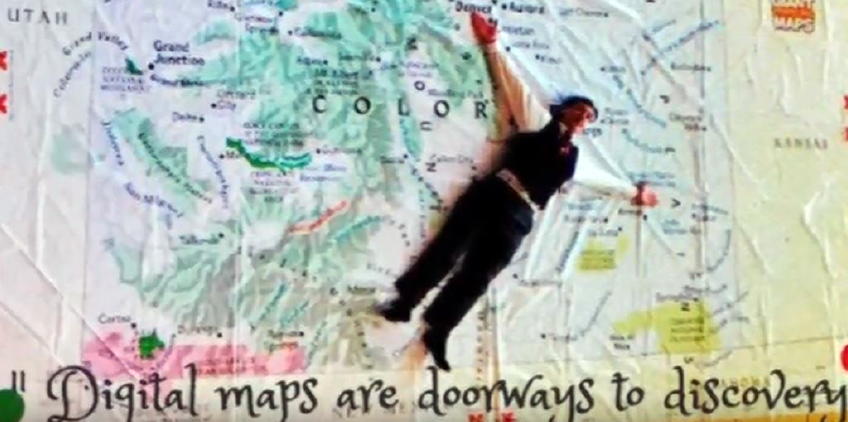 September 11, 2018
September 11, 2018